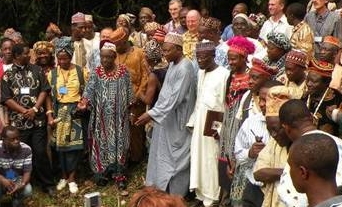
Sep 20, 2016 | Focolare Worldwide
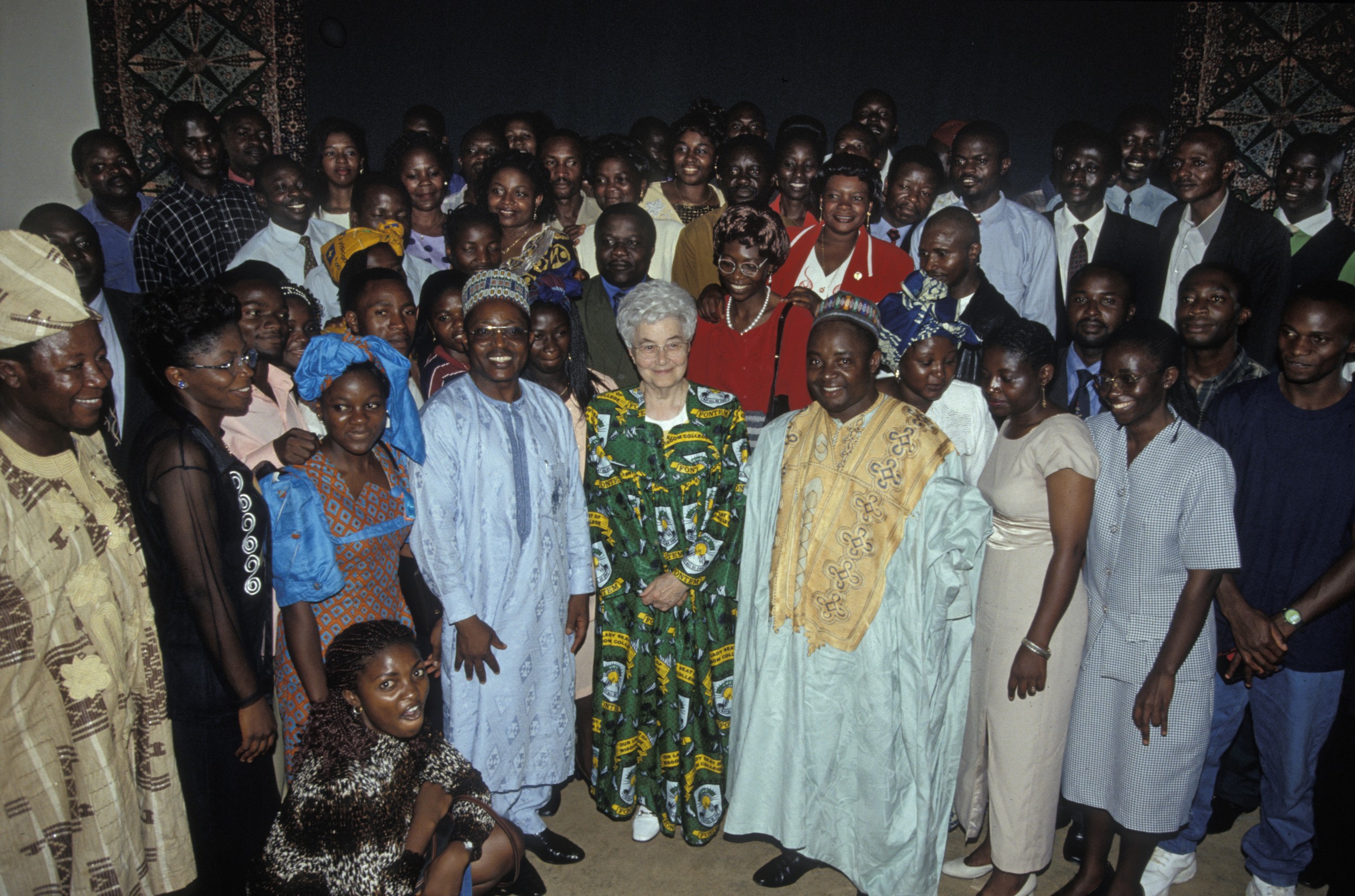 A delegation of 40 people from Cameroon are on their way to Rome. Among them are 9 traditional leaders (Fon), the native Kings of the Bangwa people of Lebialem, South-West Cameroon (Fon-Fontem, Fon-Nwametaw, Fon-Nwangong, Fon- Esoh Attah, Fon-Akum, Fon-Lewoh, Fon-Nkar, Fon-Bamenda and Fon-Douala),who are accompanied by Mafuas (Queens), two Mayors and other distinguished persons. They travel to Italy to celebrate the Jubilee of Mercy with Pope Francis and to thank God for the 50 years that has passed since the Bangwa people and the Focolare Movement met for the first time in Fontem. Their “pilgrimage” starts at the Vatican. They look foward to meet Pope Francis during the General Audience on Wednesday, September 21, when the Fon-Kings will greet the Pope on behalf of the delegation and their peoples, offer gifts typical of their culture and thank him for all that the Church has done for them. During their stay in Italy, they will be guests of the Focolare Movement and they will visit places where Chiara Lubich was born, lived and is buried: Trent, Loppiano (Florence) and Rocca di Papa (Rome). In fact, it was Chiara and the Focolare Movement, who answered the plea of Bangwa people, that came through Msgr Peters, bishop of Buea in the early 60’s, when the endemic sleeping sickness and other tropical diseases provoked a 90% rate of infantile mortality, threatening the extinction of the whole population. Today, these diseases have almost disappeared and the hospital, with its outpatient clinics, laboratory, operating theatre, male and female internal medicine department, surgery, maternity and pediatrics departments and the new department for infectious diseases, excels in the healthcare for the whole region. In the early70’s, a power plant, a carpentry shop, a nursery school and college were also built. The college,which takes more than 500 students, is one of the most popular pre-university insitutions in Cameroon.
A delegation of 40 people from Cameroon are on their way to Rome. Among them are 9 traditional leaders (Fon), the native Kings of the Bangwa people of Lebialem, South-West Cameroon (Fon-Fontem, Fon-Nwametaw, Fon-Nwangong, Fon- Esoh Attah, Fon-Akum, Fon-Lewoh, Fon-Nkar, Fon-Bamenda and Fon-Douala),who are accompanied by Mafuas (Queens), two Mayors and other distinguished persons. They travel to Italy to celebrate the Jubilee of Mercy with Pope Francis and to thank God for the 50 years that has passed since the Bangwa people and the Focolare Movement met for the first time in Fontem. Their “pilgrimage” starts at the Vatican. They look foward to meet Pope Francis during the General Audience on Wednesday, September 21, when the Fon-Kings will greet the Pope on behalf of the delegation and their peoples, offer gifts typical of their culture and thank him for all that the Church has done for them. During their stay in Italy, they will be guests of the Focolare Movement and they will visit places where Chiara Lubich was born, lived and is buried: Trent, Loppiano (Florence) and Rocca di Papa (Rome). In fact, it was Chiara and the Focolare Movement, who answered the plea of Bangwa people, that came through Msgr Peters, bishop of Buea in the early 60’s, when the endemic sleeping sickness and other tropical diseases provoked a 90% rate of infantile mortality, threatening the extinction of the whole population. Today, these diseases have almost disappeared and the hospital, with its outpatient clinics, laboratory, operating theatre, male and female internal medicine department, surgery, maternity and pediatrics departments and the new department for infectious diseases, excels in the healthcare for the whole region. In the early70’s, a power plant, a carpentry shop, a nursery school and college were also built. The college,which takes more than 500 students, is one of the most popular pre-university insitutions in Cameroon.  These 50 years built on facts and involving the whole region of Lebialem, led tens of thousands of people to accept the Christian message, in their personal life and in the life of society. They were supported by the work of the Mill Hill missionaries, the White Fathers and religious men and women of other congregations, who contributed towards the setting up of parishes, of the recent diocese of Manfi, of other schools and of public and administrative State structures. The baggage of the delegation led by the nine Fons contains this story of their people, a story which makes them feel the need to thank God and “Mafua Ndem Chiara Lubich” (queen sent by God), as the Bangwa people call her.
These 50 years built on facts and involving the whole region of Lebialem, led tens of thousands of people to accept the Christian message, in their personal life and in the life of society. They were supported by the work of the Mill Hill missionaries, the White Fathers and religious men and women of other congregations, who contributed towards the setting up of parishes, of the recent diocese of Manfi, of other schools and of public and administrative State structures. The baggage of the delegation led by the nine Fons contains this story of their people, a story which makes them feel the need to thank God and “Mafua Ndem Chiara Lubich” (queen sent by God), as the Bangwa people call her.
Press Conference with the Bangwa Delegation on Wednesday, September 21 at 12.30 (after the audience with Pope Francis)at J.H. Newman Hall, Urban University.
See also: http://focolare-fontem.org/
Video: General Hospital, Fontem
Press releases
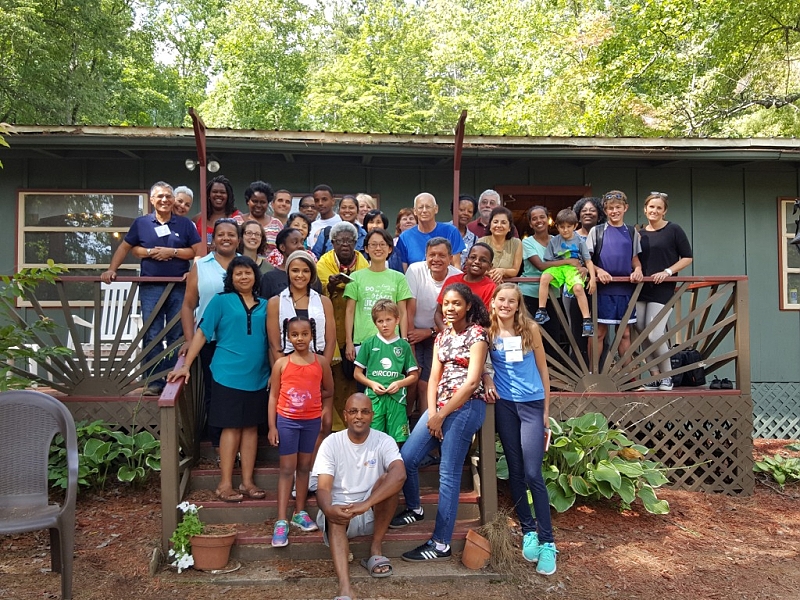
Sep 20, 2016 | Non categorizzato

Members of the Focolare community in Atlanta
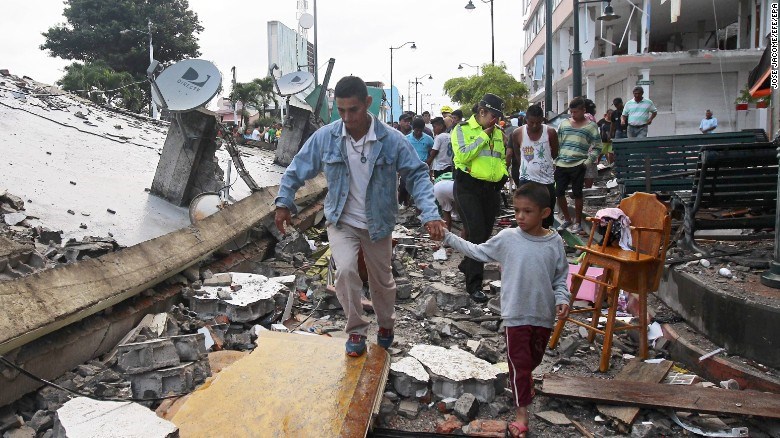
Sep 19, 2016 | Non categorizzato
 As the news media reported, a magnitude 7.8 earthquake hit Ecuador on April 16, especially the provinces of Manabi, Esmeraldas, Santo Domingo and Pichincha, leaving nearly 30 people without a roof.
As the news media reported, a magnitude 7.8 earthquake hit Ecuador on April 16, especially the provinces of Manabi, Esmeraldas, Santo Domingo and Pichincha, leaving nearly 30 people without a roof.
The Focolare Movement immediately got to work in many ways: beginning from the early relief efforts with the many spontaneous volunteers, and morning on to a large-scale fundraiser coordinated by AMU and AFN. Meanwhile a local commission was set up to identify the main priorities for the relief effort and to coordinate over a long term. They write from the commission: “In the past months several of us have gone to visit the different sites of the earthquake, meeting with the communities and seeking to collaborate with agencies that had similar goals. By the end of August the first proposals were ready and we began to collaborate with the Ecuadoran Popolorum Progressio Fund (FEPP) and the Fundación Amiga.” 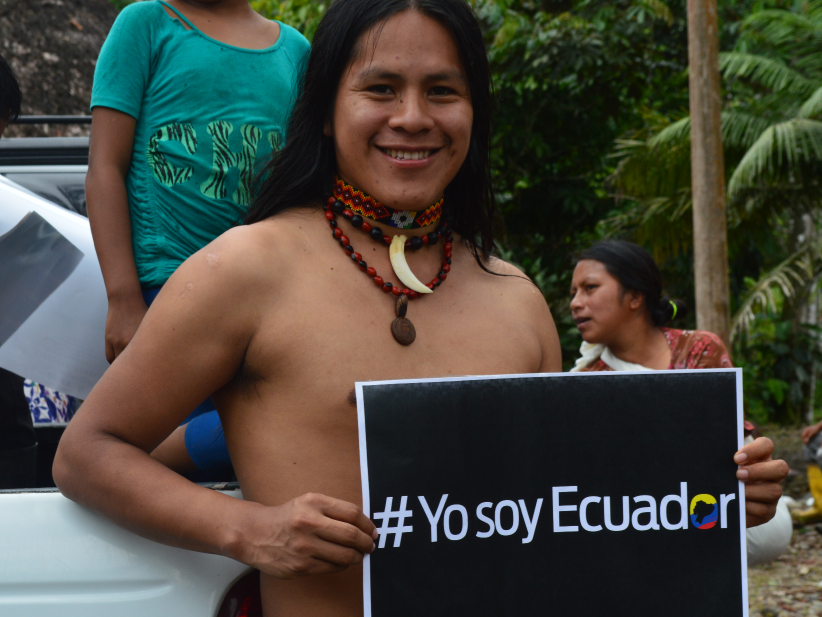 At this stage, the post-emergency interventions that were deemed most serious regarded the production of goods that could be sold and provide economic support for the local populations, and psychological support in overcoming the trauma which – as they write – “is still very quite strong after 5 months.” They also underscored another important point: “We saw the need to offer training in the procedure for applying for assistance from the Ecuador Government for the reconstruction of housing. At first, relief efforts concentrated on three localities, all located in the Province of Esmeraldas: Salima, “10 de Agosto” and Macara, “where projects will carried out to alleviate the consequences of trauma and to reinforce the organizational skills of the community,” they explain. “Moreover, a cooperative bread bakery and a training course in making fishing nets, involving the elderly fishermen as trainers. In the locality known as “10 de Agosto”, handicraft workshops will be held and a group of mothers will be helped in setting up a nursery.” The local commission writes: “this represents the first stage of the project, which corresponds to current funds. As we work with the community, we’ll delve more deeply into the future needs of the people and be able to respond to them. As of today: € 35.502 have been donated by AMU for the Ecuador emergency, € 10.000 of which have already been paid out, whereas the sum of € 10.000 has been donated to the cause by AFN (Action for New Families). Read earlier news: – Ecuador Emergency – Two months after the Ecuador earthquake
At this stage, the post-emergency interventions that were deemed most serious regarded the production of goods that could be sold and provide economic support for the local populations, and psychological support in overcoming the trauma which – as they write – “is still very quite strong after 5 months.” They also underscored another important point: “We saw the need to offer training in the procedure for applying for assistance from the Ecuador Government for the reconstruction of housing. At first, relief efforts concentrated on three localities, all located in the Province of Esmeraldas: Salima, “10 de Agosto” and Macara, “where projects will carried out to alleviate the consequences of trauma and to reinforce the organizational skills of the community,” they explain. “Moreover, a cooperative bread bakery and a training course in making fishing nets, involving the elderly fishermen as trainers. In the locality known as “10 de Agosto”, handicraft workshops will be held and a group of mothers will be helped in setting up a nursery.” The local commission writes: “this represents the first stage of the project, which corresponds to current funds. As we work with the community, we’ll delve more deeply into the future needs of the people and be able to respond to them. As of today: € 35.502 have been donated by AMU for the Ecuador emergency, € 10.000 of which have already been paid out, whereas the sum of € 10.000 has been donated to the cause by AFN (Action for New Families). Read earlier news: – Ecuador Emergency – Two months after the Ecuador earthquake
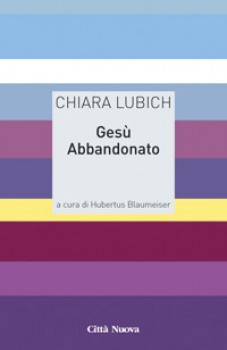
Sep 18, 2016 | Non categorizzato
 “I’d like to console Him, to run through the world, gathering hearts for Him.” This was Chiara Lubich’s first impulse on January 24, 1944 when she became aware of Jesus’s abysmal cry from the cross: “My God, my God, why have you abandoned me?” If that was the moment when he suffered most,” she reasoned, “then it was the moment when he loved us most. Let’s make Him the ideal of our life!” And to think that back then theology did not take into consideration the abandonment experienced by Jesus! Catholic piety focused its attention on the physical suffering, the agony in the Garden of Gethsemane. But World War II and the Holocaust in particular dug a hole in the human conscience that only Jesus’s experience of extreme abandonment could fill. While still young Chiara chose to love the abandoned Jesus in the innumerable faces of personal and collective human suffering, so that the Abandoned One would not be alone in His abandonment. Very soon, however, she experienced something quite unexpected: “You throw yourself into a sea of pain and find yourself swimming in a sea of love.” The agony subsides into joy and transforms relationships, creating communion: “They are two sides of the same medal. To all the souls I show the face of Unity. For me and the souls that are on the front lines of Unity: the abandoned Jesus is all for us.” The years 1949-1951 were a well-spring of new intuitions. The wound of the abandonment as the expression of maximum Love becomes for Chiara the keystone of her vision of human history, of life itself and of God. She contemplates His abandonment as “the pupil of God’s Eye [through which he looks] on the world: an Infinite Emptiness through which God looks at us: God’s window thrown open onto the world, and the window through which humanity sees God.” Years of trial followed as the Church carried out its close examination of the new charism, a time of suspension that Chiara experienced in the light of the Son who was abandoned by the Father, convinced that through it all the Church was being a Mother. Stage by stage, the book traces the trajectory of Chiara’s spiritual adventure, through her letters, notes, diaries and talks that are compiled in six chapters. Its 160 pages, including an introduction by theologian Hubertus Blausmeiser, could accompany and illuminate our daily life. – and includes an introduction by theologian Hubertus Blaumeiser. With the Church’s official approval of the Focolare in early 1960, a new perspective is opened: Abandoned Jesus becomes the motivating drive behind the thrust to move out and face the social challenges, in every form of suffering. He is the “Teacher of dialogue” in the ecumenical and interreligious environment. He presents Himself as the God of today, who is even able to talk to non-believers and be a source of cultural change. The author takes up the “Holy Journey” with Him, a communitarian journey to holiness that has included hundreds and thousands of people from around the world: “He is the supreme Master of the spiritual life, of detachment from self, detachment from everything, from what is of God, but not God.” “Loving abandoned Jesus,’ she writes, “we find the reason and the strength to not escape from these evils, these divisions, but to accept them and consume them and bring to them our own personal and collective remedy.” And she states with certitude: “If we manage to encounter Him in every suffering, if we love Him, if we turn to the Father like Jesus on the cross: “Father, into your hands I commend my spirit” (Lk. 23:46), then with Him the night will be a thing of the past, and light will illuminate us.”
“I’d like to console Him, to run through the world, gathering hearts for Him.” This was Chiara Lubich’s first impulse on January 24, 1944 when she became aware of Jesus’s abysmal cry from the cross: “My God, my God, why have you abandoned me?” If that was the moment when he suffered most,” she reasoned, “then it was the moment when he loved us most. Let’s make Him the ideal of our life!” And to think that back then theology did not take into consideration the abandonment experienced by Jesus! Catholic piety focused its attention on the physical suffering, the agony in the Garden of Gethsemane. But World War II and the Holocaust in particular dug a hole in the human conscience that only Jesus’s experience of extreme abandonment could fill. While still young Chiara chose to love the abandoned Jesus in the innumerable faces of personal and collective human suffering, so that the Abandoned One would not be alone in His abandonment. Very soon, however, she experienced something quite unexpected: “You throw yourself into a sea of pain and find yourself swimming in a sea of love.” The agony subsides into joy and transforms relationships, creating communion: “They are two sides of the same medal. To all the souls I show the face of Unity. For me and the souls that are on the front lines of Unity: the abandoned Jesus is all for us.” The years 1949-1951 were a well-spring of new intuitions. The wound of the abandonment as the expression of maximum Love becomes for Chiara the keystone of her vision of human history, of life itself and of God. She contemplates His abandonment as “the pupil of God’s Eye [through which he looks] on the world: an Infinite Emptiness through which God looks at us: God’s window thrown open onto the world, and the window through which humanity sees God.” Years of trial followed as the Church carried out its close examination of the new charism, a time of suspension that Chiara experienced in the light of the Son who was abandoned by the Father, convinced that through it all the Church was being a Mother. Stage by stage, the book traces the trajectory of Chiara’s spiritual adventure, through her letters, notes, diaries and talks that are compiled in six chapters. Its 160 pages, including an introduction by theologian Hubertus Blausmeiser, could accompany and illuminate our daily life. – and includes an introduction by theologian Hubertus Blaumeiser. With the Church’s official approval of the Focolare in early 1960, a new perspective is opened: Abandoned Jesus becomes the motivating drive behind the thrust to move out and face the social challenges, in every form of suffering. He is the “Teacher of dialogue” in the ecumenical and interreligious environment. He presents Himself as the God of today, who is even able to talk to non-believers and be a source of cultural change. The author takes up the “Holy Journey” with Him, a communitarian journey to holiness that has included hundreds and thousands of people from around the world: “He is the supreme Master of the spiritual life, of detachment from self, detachment from everything, from what is of God, but not God.” “Loving abandoned Jesus,’ she writes, “we find the reason and the strength to not escape from these evils, these divisions, but to accept them and consume them and bring to them our own personal and collective remedy.” And she states with certitude: “If we manage to encounter Him in every suffering, if we love Him, if we turn to the Father like Jesus on the cross: “Father, into your hands I commend my spirit” (Lk. 23:46), then with Him the night will be a thing of the past, and light will illuminate us.”
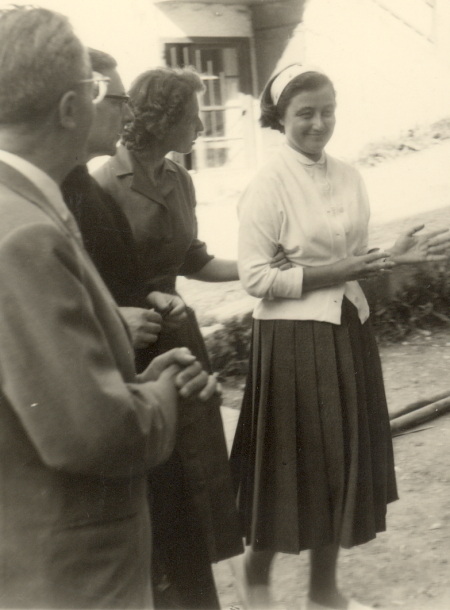
Sep 17, 2016 | Non categorizzato
 The following is recorded in the personal diary of Igino Giordani: “17 September 1948. This morning at Montecitorio I was called upon by angels: a Capuchin, a Friar Minor, a Conventual, a Third Order man and a Third Order woman, Silvia Lubig (sic!), who is beginning a community in Trent. She spoke like a saint inspired by the Holy Spirit.” Recounting the event: “One day I was urged to listen to an apostle – as they said – of unity. It was in September 1948. I exhibited the usual courtesy of any deputy towards possible electors when some Religious came to Montecitorio, representatives of different branches of the Franciscan family, a young lay woman and a young layman. To see a Conventual, a Friar Minor, a Capuchin, and a woman and man from the Third Order of Saint Francis all united together already looked like a miracle of unity to me: and I said so. The young lady spoke: I was sure I’d hear a sentimental propagandist tell me about some utopian welfare. Instead, right from the first words I felt something new. A half hour later when she had finished talking, I was taken by the enchanting atmosphere: I would have liked that voice to continue on. Without realizing it, it was the voice that I had been waiting for. She placed holiness within everyone’s reach; she took away the grates that separated the lay world from the mystical life. She made public the treasures of a castle that only a few were admitted to. She brought God near: she made him feel like a Father, brother, friend, present to humankind. I wanted to look into it: and getting familiar with the life of the Focolare of unity – as they called it – I recognized in their experience the realization of the desire that overwhelmed Saint John Chrysostom: that the laity would live as monks, minus celibacy. I had much cultivated that desire. What happened was that the idea of God had yielded its place to God’s love, the ideal image of the living God. In Chiara I had found someone who didn’t talk about God, but someone who spoke with God: a daughter speaking in loving conversation with the Father. If I did a critical examination of it, I found that I hadn’t discovered anything new. In the way of life that was opening to my soul, I found all the same names, characters and doctrines that I had loved. All my study, my ideals, the very events of my life all seemed directed to this goal. Nothing new: yet everything was new: the elements of my cultural and spiritual formation began to come together in accordance with God’s plan. They took their rightful place. All was old and all was new. The key that unlocked the mystery had been discovered: love was allowed to pass, which had too often been barricaded: and it burst forth spreading like fire and becoming a blaze. A collective, socialized holiness – to use terms that were later popularized by the Second Vatican Council – drawn out of the individualism that had accustomed everyone to become holy on one’s own, meticulously caring for one’s own soul, with endless analyses in order not to lose that soul. A piety, an interior life that came from Religious houses, from a certain exclusiveness of the privileged classes was now poured out into the public, into offices and factories, into houses and fields – and into convents – because wherever you find people, you find candidates for the perfection of holiness. And to live this new life, to be born in God, I didn’t have to renounce my doctrines: I only had to place them in the fire of love so that they would come alive. Through my neighbour I began to live God. Life became a total adventure, consciously lived in union with the Creator, which is what life is. Mary was resplendent with a new beauty; the saints entered among the relatives; Heaven became a common home. This was the discovery, this the experience. This made me a new man.”
The following is recorded in the personal diary of Igino Giordani: “17 September 1948. This morning at Montecitorio I was called upon by angels: a Capuchin, a Friar Minor, a Conventual, a Third Order man and a Third Order woman, Silvia Lubig (sic!), who is beginning a community in Trent. She spoke like a saint inspired by the Holy Spirit.” Recounting the event: “One day I was urged to listen to an apostle – as they said – of unity. It was in September 1948. I exhibited the usual courtesy of any deputy towards possible electors when some Religious came to Montecitorio, representatives of different branches of the Franciscan family, a young lay woman and a young layman. To see a Conventual, a Friar Minor, a Capuchin, and a woman and man from the Third Order of Saint Francis all united together already looked like a miracle of unity to me: and I said so. The young lady spoke: I was sure I’d hear a sentimental propagandist tell me about some utopian welfare. Instead, right from the first words I felt something new. A half hour later when she had finished talking, I was taken by the enchanting atmosphere: I would have liked that voice to continue on. Without realizing it, it was the voice that I had been waiting for. She placed holiness within everyone’s reach; she took away the grates that separated the lay world from the mystical life. She made public the treasures of a castle that only a few were admitted to. She brought God near: she made him feel like a Father, brother, friend, present to humankind. I wanted to look into it: and getting familiar with the life of the Focolare of unity – as they called it – I recognized in their experience the realization of the desire that overwhelmed Saint John Chrysostom: that the laity would live as monks, minus celibacy. I had much cultivated that desire. What happened was that the idea of God had yielded its place to God’s love, the ideal image of the living God. In Chiara I had found someone who didn’t talk about God, but someone who spoke with God: a daughter speaking in loving conversation with the Father. If I did a critical examination of it, I found that I hadn’t discovered anything new. In the way of life that was opening to my soul, I found all the same names, characters and doctrines that I had loved. All my study, my ideals, the very events of my life all seemed directed to this goal. Nothing new: yet everything was new: the elements of my cultural and spiritual formation began to come together in accordance with God’s plan. They took their rightful place. All was old and all was new. The key that unlocked the mystery had been discovered: love was allowed to pass, which had too often been barricaded: and it burst forth spreading like fire and becoming a blaze. A collective, socialized holiness – to use terms that were later popularized by the Second Vatican Council – drawn out of the individualism that had accustomed everyone to become holy on one’s own, meticulously caring for one’s own soul, with endless analyses in order not to lose that soul. A piety, an interior life that came from Religious houses, from a certain exclusiveness of the privileged classes was now poured out into the public, into offices and factories, into houses and fields – and into convents – because wherever you find people, you find candidates for the perfection of holiness. And to live this new life, to be born in God, I didn’t have to renounce my doctrines: I only had to place them in the fire of love so that they would come alive. Through my neighbour I began to live God. Life became a total adventure, consciously lived in union with the Creator, which is what life is. Mary was resplendent with a new beauty; the saints entered among the relatives; Heaven became a common home. This was the discovery, this the experience. This made me a new man.”
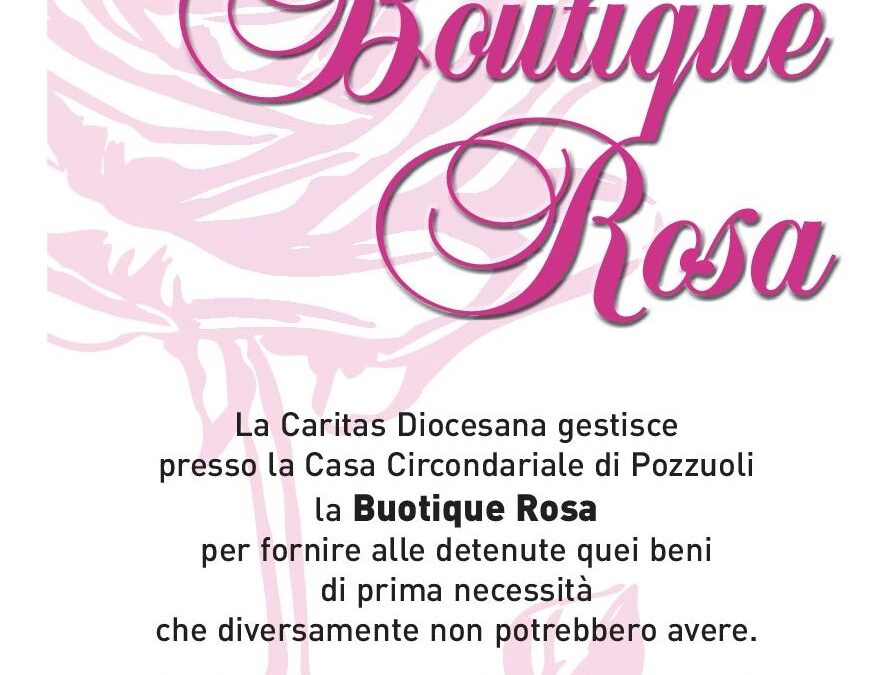
Sep 16, 2016 | Non categorizzato
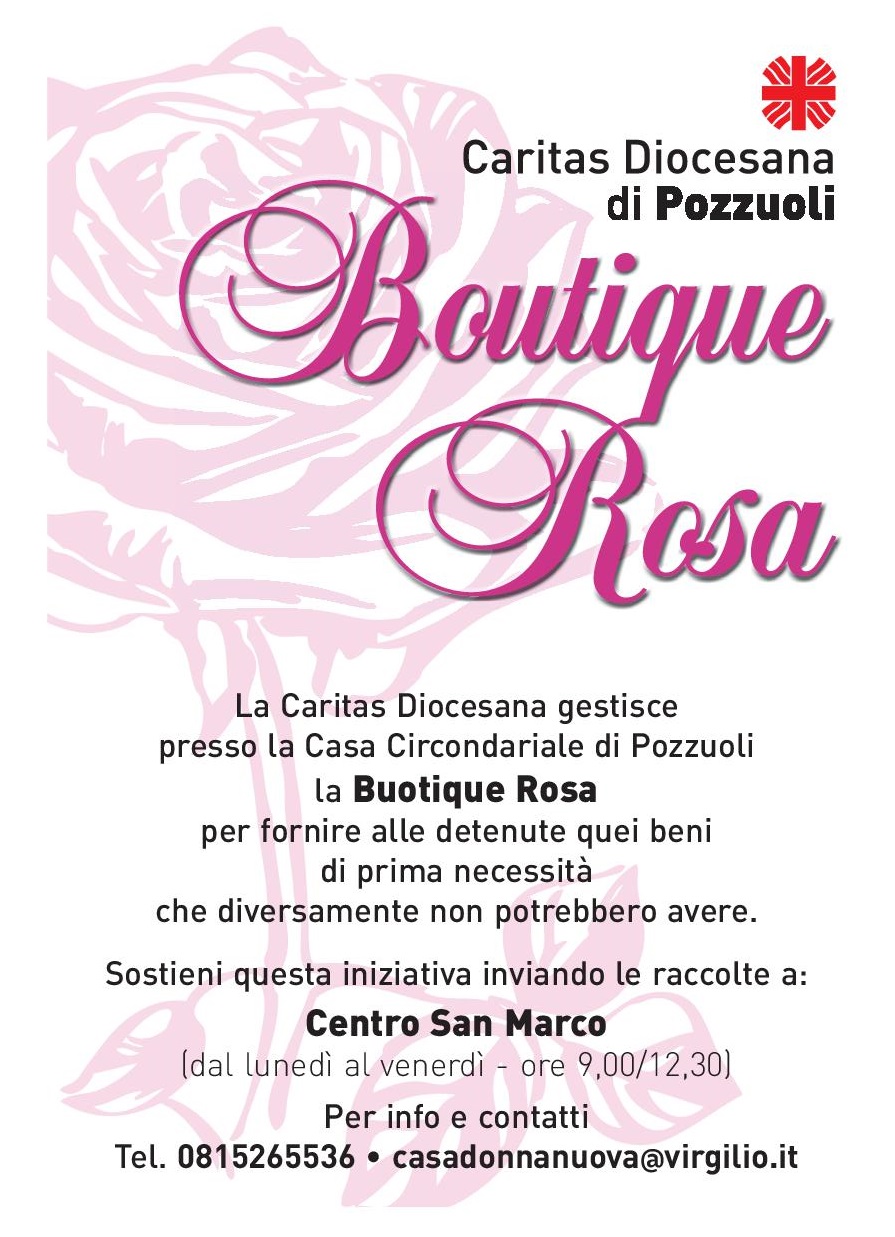 In 2011, Maria Clara who had just retired, transferred her services to the women’s jail of Pozzuoli (Naples-Italy), a huge jail, and one of the most overcrowded in Italy. Struck by the cries of pain that reached her ears from the barred windows, she discussed it with her friends of the local Focolare community and 25 of them (boys, girls, families…) decided to respond to the appeal. In collaboration with the diocesan Caritas and other Movements, the group thus immersed themselves into that suffering humanity behind bars. It was not an easy experience, but one that led to refine, in the name of mercy, every gesture and word, so as to be really that presence of love the world awaits. Each one became more aware that they did not go there to “absolve,” judge, or just to carry out social work, but only to give love, focusing on the reconstruction of the person. And probably because of this attitude, very soon they saw the positive aspects emerge in each person. “When I get out of here I want to be a new person,” one of them confided. And another said: “Now I know what it means to be a Christian, and I want to live by the Gospel, loving my cellmates, even if they make life impossible.” Still another said: “I understood that the real help comes from Jesus in the Eucharist and not from the “power–wielding people of the world.” This flow of light and grace was not earned with a magic wand. It was the fruit of continual attention to the needs of the inmates, helping them to rediscover their own dignity through living the Gospel. It consisted in going with them to Sunday Mass, enlivening it with songs, and placing oneself at their disposal to renovate the chapel. It meant asking and obtaining the permit from the jail administration to organise a series of workshops on health education, cooking, yoga, sewing courses, etc., in the Family Home “Donna Nuova” which hosts women under alternative detention regimes. One of the things the inmates needed – not expressed but which immediately came to the fore – was self-care. This inspired the establishment of the “Pink boutique,” a free facility within the jail, with pink walls, curtains and coloured shelves in contrast with the greyness of the cells. It is a point where the inmates, often abandoned or far from their own families, can weekly receive products for their personal hygiene, clothes, underwear, etc., and in short, all that serves to boost their own self-esteem. In the meantime, they could talk to one another or to the wardens and listen to each other’s difficulties, to comfort one another in their regret for not being able to care for their children at home, thus building really close relationships. It was also the occasion to share big and small joys, such as a reduced prison sentence, an unexpected visit, and the steps taken in starting again. All of them are from different ethnic groups and cultures, and belong to various Christian churches and religions. “I remember an Orthodox woman,” Maria Clara recounts, “who during the Unity of Christians Prayer Week, wanted to contribute with a prayer-song. Crying, she told me that she was offering the immense suffering of her prison term for the unity of the churches. We then went to Naples to meet her husband and five children, with some aid for them. We share this experience with some people belonging to Christian churches of various denominations, with which an ecumenical dialogue was opened in the diocese. This was exactly what they were waiting for! Now also four evangelical sisters have started working with us. Thanks to them, inmates of various churches have established really close relationships that at times, continue even when they leave the jail.”
In 2011, Maria Clara who had just retired, transferred her services to the women’s jail of Pozzuoli (Naples-Italy), a huge jail, and one of the most overcrowded in Italy. Struck by the cries of pain that reached her ears from the barred windows, she discussed it with her friends of the local Focolare community and 25 of them (boys, girls, families…) decided to respond to the appeal. In collaboration with the diocesan Caritas and other Movements, the group thus immersed themselves into that suffering humanity behind bars. It was not an easy experience, but one that led to refine, in the name of mercy, every gesture and word, so as to be really that presence of love the world awaits. Each one became more aware that they did not go there to “absolve,” judge, or just to carry out social work, but only to give love, focusing on the reconstruction of the person. And probably because of this attitude, very soon they saw the positive aspects emerge in each person. “When I get out of here I want to be a new person,” one of them confided. And another said: “Now I know what it means to be a Christian, and I want to live by the Gospel, loving my cellmates, even if they make life impossible.” Still another said: “I understood that the real help comes from Jesus in the Eucharist and not from the “power–wielding people of the world.” This flow of light and grace was not earned with a magic wand. It was the fruit of continual attention to the needs of the inmates, helping them to rediscover their own dignity through living the Gospel. It consisted in going with them to Sunday Mass, enlivening it with songs, and placing oneself at their disposal to renovate the chapel. It meant asking and obtaining the permit from the jail administration to organise a series of workshops on health education, cooking, yoga, sewing courses, etc., in the Family Home “Donna Nuova” which hosts women under alternative detention regimes. One of the things the inmates needed – not expressed but which immediately came to the fore – was self-care. This inspired the establishment of the “Pink boutique,” a free facility within the jail, with pink walls, curtains and coloured shelves in contrast with the greyness of the cells. It is a point where the inmates, often abandoned or far from their own families, can weekly receive products for their personal hygiene, clothes, underwear, etc., and in short, all that serves to boost their own self-esteem. In the meantime, they could talk to one another or to the wardens and listen to each other’s difficulties, to comfort one another in their regret for not being able to care for their children at home, thus building really close relationships. It was also the occasion to share big and small joys, such as a reduced prison sentence, an unexpected visit, and the steps taken in starting again. All of them are from different ethnic groups and cultures, and belong to various Christian churches and religions. “I remember an Orthodox woman,” Maria Clara recounts, “who during the Unity of Christians Prayer Week, wanted to contribute with a prayer-song. Crying, she told me that she was offering the immense suffering of her prison term for the unity of the churches. We then went to Naples to meet her husband and five children, with some aid for them. We share this experience with some people belonging to Christian churches of various denominations, with which an ecumenical dialogue was opened in the diocese. This was exactly what they were waiting for! Now also four evangelical sisters have started working with us. Thanks to them, inmates of various churches have established really close relationships that at times, continue even when they leave the jail.”
Sep 15, 2016 | Non categorizzato
https://www.youtube.com/watch?v=8Asjy1-9mxI After We Are Coming To You (1972), Wherever You Are (1982), Se siamo uniti (1987) and – with Gen Verde – Come fuoco vivo (1998) and Messa della Concordia (2004), Gen Rosso releases a new DVD for the Year of Mercy: Voce del mio canto. We are led into the music by Lito Amuchastegui, from Argentina, who has been with Gen Rosso for 20 years. He composed most of the songs that led to the composition of a complete Mass. He was helped by Beni Enderle for the music, Valerio Lode Ciprì for the lyrics and Emanuele Chirco for the final mixing. Lito has loved music all his life and began singing in public at the age of five. With Gen Rosso he worked as a sound engineer. Voce del mio canto (Voice of my song) is his legacy to the group, as he returns to the place he was born in Córdoba, Argentina. “Writing a Mass is no joke,” he declares. “It requires awareness: you’re talking about who God is for you. In front of every piece I had to place myself in front of Him and ask: are You truly the voice of my song? Are You my only treasure? When there are crosses, are You my Simon of Cyrene? Il Cielo è con noi is one my favourite pieces. It was inspired by a writing of Chiara Lubich in which she says that Heaven has been poured on us, Heaven in all its infiniteness: “you were born among us/ you brought with you the fragrance of Heaven/ you died for us, you are pure love/ you are Divine love. It asks about God not on the theological or historical level, but on the personal level: Who is God for me? So, Voce del mio canto is most of all about an experience: prayer, the joy of experiencing that you are loved by God…. But where did the idea of a sung Mass come from? “The reason behind it was the desire to make music. I took guitar along on vacation and wrote Quelli che amono te (Those that love you) in one sitting. Then I put it to music and shared it with the people who were with me and they liked it. Then I kept going and ended up with eleven pieces, plus two more that we already had. Why a Mass? Perhaps it shows that God was saying to me: ‘I want to help you to give more glory to me.’ I set off from there. What is the story behind each of the songs? Lito revealed that he had put a bit of his own roots into each piece: “One song talks about Pane della Madre Terra (Bread of Mother Earth). We South Americans have strong feelings towards Mother Earth which stem from indigenous tradition. Moreover, I was in Uruguay where I got to know about the ‘candombe’ which has Afro-American features, and I wanted to leave a mark of the experience I had had with the Uruguayan musicians in the Santo. They are a people of singing and praising God, a people of the streets, with tambourines like King David who sang and danced in front of the Ark of the Covenant. Then there was Niña de Nazareth (Girl from Nazareth), a song I wrote before joining Gen Rosso but was never able to put it to music. I worked on it with Beni Henderle, and we came out with the song. Other pieces were a bit more difficult: for the Kyrie Eleison, for example, I had come with 7 different versions. I was trying to convey the experience that God loves us; His mercy is also born from being Love. The rest is relative; whereas, for me, this is like a splinter in my mind.” What suggestions could you give to those who want to play these songs? “I would suggest to them that these songs aren’t meant to be sung, but lived. I would wish to anyone who would like to use them – in a group, a parish, a choir – that they would be able to have this experience of God: to “enter” the songs. I would wish that they could be able to enter the songs with their souls, so that the correct interpretation of each piece would come out.” Song List:
- Verso di te (Towards You)
- Kyrie Eleison
- Gloria
- Loda il Signore anima mia (Praise the Lord, my soul)
- Alleluia
- Quelli che amano te (Those that love you)
- Santo, Candombe rhythm (Holy, holy, holy)
- Agnello di Dio (Lamb of God)
- Il cielo è con noi (Heaven is here with us)
- Voce del mio canto (Voice of my song)
- Come un fiume (Like a river)
- Ave Maria
- Niña de Nazareth.
Complete texts and musical scores are included with the CD Where to buy Voce del mio canto CD
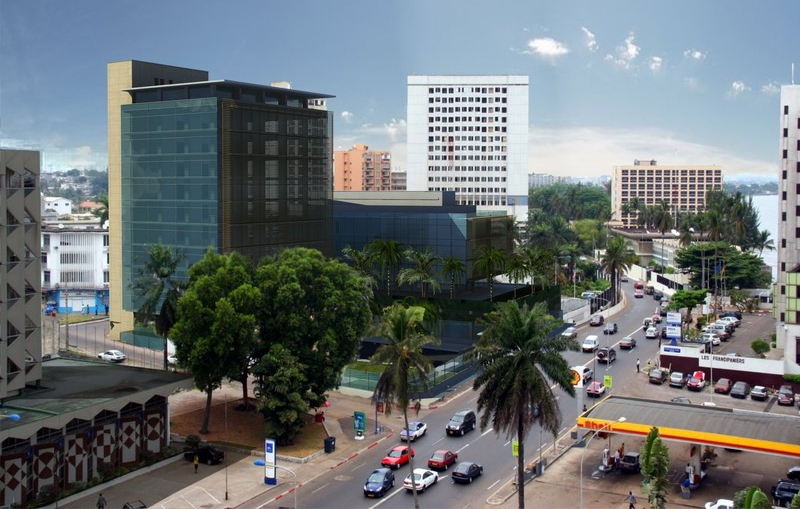
Sep 14, 2016 | Focolare Worldwide
 “When I was invited to visit the Focolare communities in Gabon, I searched for it on Google Earth to find out where on the African continent it was located. It’s actually a small country that is hardly ever talked about. Yet, perhaps few places on earth are so beautiful, rich in natural resources (oil, precious wood, extinct species that are still in existence, 800 km of coastland, the ocean of your dreams. . . .). That’s without saying anything about the people: more than 2 million citizens from 40 ethnic groups, Christians, Animists and Muslims, all living together in peace and – I have to stay it! – an extraordinary ability to welcome and include everyone, as I was able to experience for myself. Currently, Gabon is in a complicated political impasse, following the elections of August 27th and an announcement of victory for one of the presidential candidates. There has been a strong call for transparency both from within and outside the country, from the international community. There is also a strong call to reveal the final election results in each of the regions – as prescribed by the Gabonaise Constitution. The majority of the population are not convinced by the results that have actually been reported, and people have poured into squares in the capital city of Librevelle and in the industrial city Port-Gentil. The demonstrations were contained and repressed with an uncertain number of deaths and many arrests. Non-official means of communication and social networks have been blocked, making it difficult for me to receive news from my friends with whom I spent unforgettable days living the Gospel. It was they who managed to contact me, reporting that all are well and how they’re living through the situation. “Thanks for holding us in your heart!” they write from Libreville. “Unfortunately it’s true that the country is going through violence following the elections. Tensions are high and we’ve been told to stock up on water and basic necessities, and to stay inside our homes. Supermarkets have been ransacked. The communications media is in the hands of the government, and internet is available for only short periods of time between 8:00 and 14:00. Messaging, Facebook and Whatsapp are all blocked. There is a strong and visible military presence on the roads. Total confusion since the election results were announced in this free and democratic land. We’re still waiting for an announcement from the Constitutional Court, with the possibility of even more disorder. People are fearful for the near future of Gabon.” I also received news from Port-Gentil: “We’re well, thanks be to God. Internet access has been limited and complicated since August 31st. We hope it will be active again soon, since it’s such an important communication tool. Last week we were closed inside our houses, unable to go out because of the total chaos on the streets of Port-Gentil and many other places in the country. Moments like these remind of the importance of prayer.” Before saying goodbye to each other we had made a pact, committing ourselves to be peacebuilders, builders of unity and dialogue with everyone in our own work and family environment. Now is more than ever the moment to do it with the support of many other people around the world who live and work for a more united world.” Before saying goodbye to each other we had made a pact, committing ourselves to be peacebuilders, builders of unity and dialogue with everyone in our own work and family environment. Now is more than ever the moment to do it. We were further encouraged by what Pope Francis said yesterday, September 11th to those who were gathered with him in Saint Peter’s Square: “I entrust to the Lord the victims of the clashes and their families. I join the Bishops of that dear African country to invite the parties to reject all violence and to always aim for the common good. I encourage everyone, particularly Catholics, to be builders of peace within the law, in dialogue and fraternity.”
“When I was invited to visit the Focolare communities in Gabon, I searched for it on Google Earth to find out where on the African continent it was located. It’s actually a small country that is hardly ever talked about. Yet, perhaps few places on earth are so beautiful, rich in natural resources (oil, precious wood, extinct species that are still in existence, 800 km of coastland, the ocean of your dreams. . . .). That’s without saying anything about the people: more than 2 million citizens from 40 ethnic groups, Christians, Animists and Muslims, all living together in peace and – I have to stay it! – an extraordinary ability to welcome and include everyone, as I was able to experience for myself. Currently, Gabon is in a complicated political impasse, following the elections of August 27th and an announcement of victory for one of the presidential candidates. There has been a strong call for transparency both from within and outside the country, from the international community. There is also a strong call to reveal the final election results in each of the regions – as prescribed by the Gabonaise Constitution. The majority of the population are not convinced by the results that have actually been reported, and people have poured into squares in the capital city of Librevelle and in the industrial city Port-Gentil. The demonstrations were contained and repressed with an uncertain number of deaths and many arrests. Non-official means of communication and social networks have been blocked, making it difficult for me to receive news from my friends with whom I spent unforgettable days living the Gospel. It was they who managed to contact me, reporting that all are well and how they’re living through the situation. “Thanks for holding us in your heart!” they write from Libreville. “Unfortunately it’s true that the country is going through violence following the elections. Tensions are high and we’ve been told to stock up on water and basic necessities, and to stay inside our homes. Supermarkets have been ransacked. The communications media is in the hands of the government, and internet is available for only short periods of time between 8:00 and 14:00. Messaging, Facebook and Whatsapp are all blocked. There is a strong and visible military presence on the roads. Total confusion since the election results were announced in this free and democratic land. We’re still waiting for an announcement from the Constitutional Court, with the possibility of even more disorder. People are fearful for the near future of Gabon.” I also received news from Port-Gentil: “We’re well, thanks be to God. Internet access has been limited and complicated since August 31st. We hope it will be active again soon, since it’s such an important communication tool. Last week we were closed inside our houses, unable to go out because of the total chaos on the streets of Port-Gentil and many other places in the country. Moments like these remind of the importance of prayer.” Before saying goodbye to each other we had made a pact, committing ourselves to be peacebuilders, builders of unity and dialogue with everyone in our own work and family environment. Now is more than ever the moment to do it with the support of many other people around the world who live and work for a more united world.” Before saying goodbye to each other we had made a pact, committing ourselves to be peacebuilders, builders of unity and dialogue with everyone in our own work and family environment. Now is more than ever the moment to do it. We were further encouraged by what Pope Francis said yesterday, September 11th to those who were gathered with him in Saint Peter’s Square: “I entrust to the Lord the victims of the clashes and their families. I join the Bishops of that dear African country to invite the parties to reject all violence and to always aim for the common good. I encourage everyone, particularly Catholics, to be builders of peace within the law, in dialogue and fraternity.”
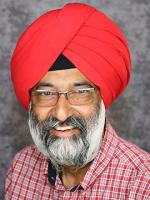
Sep 13, 2016 | Non categorizzato

Dr Tarunjit Singh Butalia
Sep 13, 2016 | Non categorizzato
Monday and Tuesday 19th and 20th of September 2016: different arrivals in Rome Wednesday 21st September 2016: Participation in an Audience with the Holy Father – Pope Francis in the Vatican – after the Audience, visit of the Tomb of Saint Peter the Apostles and the Popes – Visits of some selected holy sites of Rome Thursday 22nd September 2016: Touristic visit of Rome – Catacombs, Colosseum and Basilicas of Rome. Departure to Loppiano (Florence – first Focolare Citadel in the World created by Chiara Lubich) night at Loppiano. Friday 23rd of September 2016: Visit of Loppiano and meeting with the inhabitants of Loppiano Saturday 24th of September 2016: Departure from Loppiano to Trento – Chiara’s native town and citadel. A stop in Florence town – touristic visit. Night at Trento Sunday 25th of September 2016: Visit of Trent and inhabitants, Institutions, Municipality (Mayor) and Bishop of Trent. Monday 26th September 2016: departure from Trento to Rome – a touristic stop at Venice. Night in Rome – Castel Gandolfo . Focolare International Mariapolis Centre. Tuesday 27th September 2016: visit to the tomb of Mafua Ndem Chiara Lubich, at the Focolare Headquarters in Rocca di Papa. A meeting with the Centre of the Focolare Movement. Wednesday 28th September 2016: Departure and end of the Pilgrimage.

Sep 13, 2016 | Non categorizzato
 The fruits of the Word “For years now, three of us have been asking the new parish priest to talk more about the Word of God. So he arranged for us to hold a meeting before Mass every Sunday. The more we strived to put the Word into practice, the more people kept asking to participate. In a few months, we formed a big group. There was a strong family relationship among the frequent participants, and in the parish the atmosphere started to change. Now we were no longer satisfied only with prayer and individual efforts to be good Christians, but were involved in a journey where each one tried to reach the goal of sanctity with the others. We strongly felt the presence of Jesus at our side and in our midst, and this started to show its effects: besides the joyful discovery of a new image of the Church, we began to feel the need to also share material things with the less fortunate, and support the disadvantaged families, disoriented youth, and people who needed to rediscover God’s love. And this was not only within the framework of the parish.” (Lucio – Italy) The forgotten Christmas bonus “I was at the market when I remembered that my parents didn’t have any money, so I did the shopping also for them. On my way home, I noticed a girl crying in the street: she was hungry and her family – she told me – had nothing to eat. After consulting my husband, Antonio, we decided to bring to that family half of our monthly groceries. The next day our neighbour’s daughter came to confide that her father had gone away to look for work and no longer returned. Also they, with many children, had nothing to eat. I said to myself: “Enough of all this, we have already done our part!” But when Antonio reminded me that we still had not given what was necessary, once again we divided the remainder of our supplies. By then there was no money left for the shopping, but every day we received some help from someone. At the end of the month my salary was double. It was not a mistake: I had forgotten about my Christmas bonus.” (B. P. – Brazil) Tradition with a new heart “As a tradition in our society, particularly in the villages, the men do not help in the housework, and the women go to work even when they are sick: they do not consider themselves as victims and neither do the men feel cruel. It was so also in my house. If my wife was doing some chore and was reading a book or watching TV, it never occurred to me to get up if our son was crying: it was her task. When with the help of my Christian friends, I realized that the others had the right to receive my love and help, I felt I had to start especially at home. One day, when my wife who was preparing breakfast had to tend to the baby, I set the table for her. When she returned, she was surprised but did not make any remarks. But when I ironed my own shirt to go to the office, it was simply too much for her…. So I told her about the beauty of being the first to love and doing to others what we want others to do to us. Now there is more harmony in the family.” (W.U. H. – Pakistan)
The fruits of the Word “For years now, three of us have been asking the new parish priest to talk more about the Word of God. So he arranged for us to hold a meeting before Mass every Sunday. The more we strived to put the Word into practice, the more people kept asking to participate. In a few months, we formed a big group. There was a strong family relationship among the frequent participants, and in the parish the atmosphere started to change. Now we were no longer satisfied only with prayer and individual efforts to be good Christians, but were involved in a journey where each one tried to reach the goal of sanctity with the others. We strongly felt the presence of Jesus at our side and in our midst, and this started to show its effects: besides the joyful discovery of a new image of the Church, we began to feel the need to also share material things with the less fortunate, and support the disadvantaged families, disoriented youth, and people who needed to rediscover God’s love. And this was not only within the framework of the parish.” (Lucio – Italy) The forgotten Christmas bonus “I was at the market when I remembered that my parents didn’t have any money, so I did the shopping also for them. On my way home, I noticed a girl crying in the street: she was hungry and her family – she told me – had nothing to eat. After consulting my husband, Antonio, we decided to bring to that family half of our monthly groceries. The next day our neighbour’s daughter came to confide that her father had gone away to look for work and no longer returned. Also they, with many children, had nothing to eat. I said to myself: “Enough of all this, we have already done our part!” But when Antonio reminded me that we still had not given what was necessary, once again we divided the remainder of our supplies. By then there was no money left for the shopping, but every day we received some help from someone. At the end of the month my salary was double. It was not a mistake: I had forgotten about my Christmas bonus.” (B. P. – Brazil) Tradition with a new heart “As a tradition in our society, particularly in the villages, the men do not help in the housework, and the women go to work even when they are sick: they do not consider themselves as victims and neither do the men feel cruel. It was so also in my house. If my wife was doing some chore and was reading a book or watching TV, it never occurred to me to get up if our son was crying: it was her task. When with the help of my Christian friends, I realized that the others had the right to receive my love and help, I felt I had to start especially at home. One day, when my wife who was preparing breakfast had to tend to the baby, I set the table for her. When she returned, she was surprised but did not make any remarks. But when I ironed my own shirt to go to the office, it was simply too much for her…. So I told her about the beauty of being the first to love and doing to others what we want others to do to us. Now there is more harmony in the family.” (W.U. H. – Pakistan)
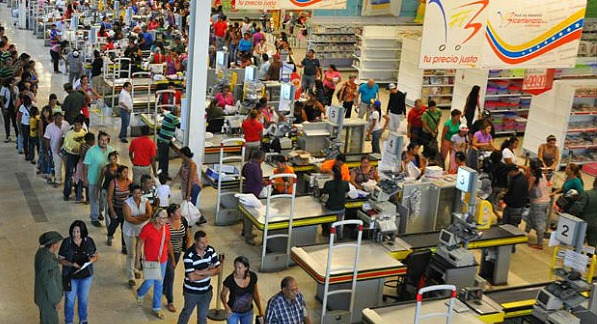
Sep 12, 2016 | Focolare Worldwide
 The news reaching us from Venezuela is not at all comforting. Furthermore, the Latin American Country is not only exhausted but also divided. In this framework, the Focolare community is making every effort to create reconcilement and solidarity, sharing all they have. The community of Colinas de Guacamaya (Valencia), after asking themselves in what way they could face this time of social, political and economic crisis that is reaching its peak, has responded by doubling their commitment to putting into practice the Gospel’s new commandment of mutual love, starting from the small daily gestures. One of them wrote: «Today, while I was buying 12 rolls of toilet paper at the supermarket, I thought of the many people here in Venezuela, who can find none on the shelves even if they had the money. I called a friend who was happy with the news and she asked me to get some for her. In turn she asked me if I needed anything, and so I told her that there was no more soap in the house. “Ah – she answered – I can give you some, and what’s more, you can take with you also some bananas which my son has just brought.” Once again I experienced concrete love, and when it circulates, that promise, “give and you shall be given,” which Jesus talked about, becomes a reality.» Those are simples acts, but also extreme ones, if we consider that for a stolen mango, people get to kill one another. Another woman recounted: «At the start of the day I met someone who was looking for cooking oil, and since I had some, I shared it with her; after a while I met another person who needed an injection, and so I administered it with great care. Much later a woman came knocking: her little girl had a bad case of flu and needed the nebulizer which luckily I had, and which I had already lent to many people. While passing by a friend’s house, I took the opportunity to ask if she needed anything: “Yes, some detergent for the laundry,” she said. I ran home to get mine and halved it with her. Since my husband works on the night shifts, in the evening some member of the community keeps me company. Having received an act of solidarity, I took the opportunity to prepare the dinner, knowing that there were those who did not have enough food. Upon examining my day before falling asleep, I feel a great joy: we have lived for one another, and together helped each other to live the Gospel. Tomorrow will give me another opportunity to see in every person that passes me by, the special presence of God.» The problems of the country are so great that these daily narrations may appear to be naive, or insignificant, like small drops in the ocean, and we all hope that solutions may come at the political, economic and social levels. Mother Theresa of Calcutta affirmed that “what we are doing is just a drop in the ocean, but if we fail to do this, the ocean would have a drop less.” It seems that this small community of Venezuela also has the same conviction.
The news reaching us from Venezuela is not at all comforting. Furthermore, the Latin American Country is not only exhausted but also divided. In this framework, the Focolare community is making every effort to create reconcilement and solidarity, sharing all they have. The community of Colinas de Guacamaya (Valencia), after asking themselves in what way they could face this time of social, political and economic crisis that is reaching its peak, has responded by doubling their commitment to putting into practice the Gospel’s new commandment of mutual love, starting from the small daily gestures. One of them wrote: «Today, while I was buying 12 rolls of toilet paper at the supermarket, I thought of the many people here in Venezuela, who can find none on the shelves even if they had the money. I called a friend who was happy with the news and she asked me to get some for her. In turn she asked me if I needed anything, and so I told her that there was no more soap in the house. “Ah – she answered – I can give you some, and what’s more, you can take with you also some bananas which my son has just brought.” Once again I experienced concrete love, and when it circulates, that promise, “give and you shall be given,” which Jesus talked about, becomes a reality.» Those are simples acts, but also extreme ones, if we consider that for a stolen mango, people get to kill one another. Another woman recounted: «At the start of the day I met someone who was looking for cooking oil, and since I had some, I shared it with her; after a while I met another person who needed an injection, and so I administered it with great care. Much later a woman came knocking: her little girl had a bad case of flu and needed the nebulizer which luckily I had, and which I had already lent to many people. While passing by a friend’s house, I took the opportunity to ask if she needed anything: “Yes, some detergent for the laundry,” she said. I ran home to get mine and halved it with her. Since my husband works on the night shifts, in the evening some member of the community keeps me company. Having received an act of solidarity, I took the opportunity to prepare the dinner, knowing that there were those who did not have enough food. Upon examining my day before falling asleep, I feel a great joy: we have lived for one another, and together helped each other to live the Gospel. Tomorrow will give me another opportunity to see in every person that passes me by, the special presence of God.» The problems of the country are so great that these daily narrations may appear to be naive, or insignificant, like small drops in the ocean, and we all hope that solutions may come at the political, economic and social levels. Mother Theresa of Calcutta affirmed that “what we are doing is just a drop in the ocean, but if we fail to do this, the ocean would have a drop less.” It seems that this small community of Venezuela also has the same conviction.
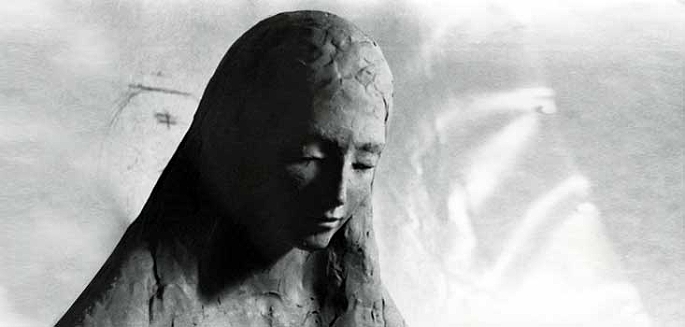
Sep 11, 2016 | Non categorizzato

Ave Cerquetti, ‘Bella Accoglienza’ – Rome, 1961
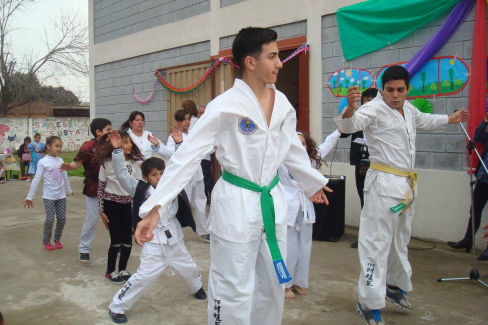
Sep 10, 2016 | Focolare Worldwide, Senza categoria
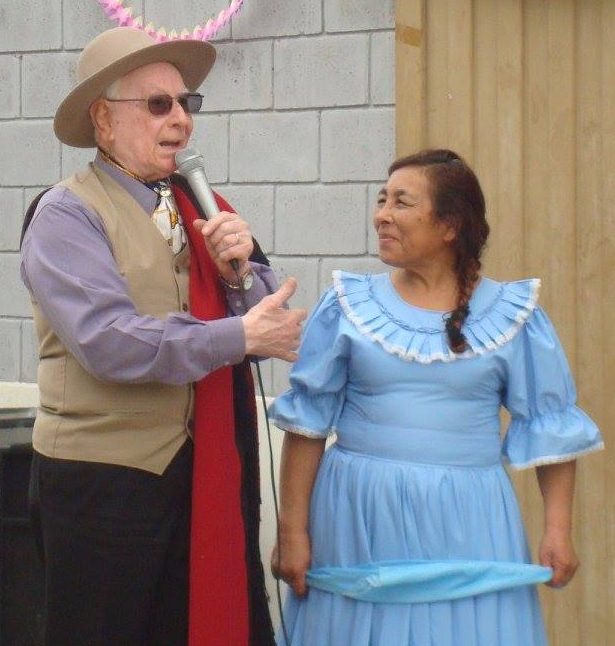 There was must festivity on August 14th at José C. Paz, fifty kilometres from Buenos Aires, Argentina. It was the 10th anniversary of a social centre that hosts the activities of the Juntos Por El Barrio Programme (Together for the Quarter), which is a social project that focuses especially on children, teenagers and their families. Even though the building is ten years old, the project began its work long before and, as is often the case, it was the people from the quarter that had initiated and carried it out. When Francis, the Pope from Argentina, invited everyone to take care of the peripheries, he was probably thinking about settlements like the barrio where the social centre is located. It is a residential settlement that was haphazardly put up behind some buildings by families that had moved to the city in search of fortune. Unfortunately, that fortune was nowhere to be found. The overwhelming unemployment made them even poorer and more vulnerable to every sort of threat: marginalization, alcoholism, drugs, violence and prostitution. And the ones most threatened were the many children and teenagers that spent most of their time on the streets.
There was must festivity on August 14th at José C. Paz, fifty kilometres from Buenos Aires, Argentina. It was the 10th anniversary of a social centre that hosts the activities of the Juntos Por El Barrio Programme (Together for the Quarter), which is a social project that focuses especially on children, teenagers and their families. Even though the building is ten years old, the project began its work long before and, as is often the case, it was the people from the quarter that had initiated and carried it out. When Francis, the Pope from Argentina, invited everyone to take care of the peripheries, he was probably thinking about settlements like the barrio where the social centre is located. It is a residential settlement that was haphazardly put up behind some buildings by families that had moved to the city in search of fortune. Unfortunately, that fortune was nowhere to be found. The overwhelming unemployment made them even poorer and more vulnerable to every sort of threat: marginalization, alcoholism, drugs, violence and prostitution. And the ones most threatened were the many children and teenagers that spent most of their time on the streets. 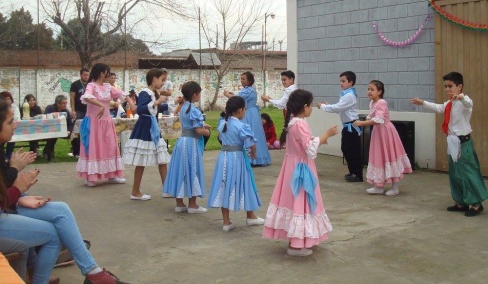 In 1999, with the support of the Focolare that had a meeting hall nearby, some local residents got together to do something for the newcomers. First they tried to identify the main issue for the barrio. It turned out to be the need for a safe place where children and teenagers could be welcomed and taken off the streets. This is how the “Juntos Por El Barrio” Project was begun. An academic support programme was set up in a makeshift classroom. Seeing how successful it was, receiving distance support from the Focolare’s New Families non-profit association (AFN onlus), many other projects were begun. With the help of donations from outside the country a building was constructed where the activities could be carried out. The centre quickly became a meeting place and a point of reference for the entire barrio.
In 1999, with the support of the Focolare that had a meeting hall nearby, some local residents got together to do something for the newcomers. First they tried to identify the main issue for the barrio. It turned out to be the need for a safe place where children and teenagers could be welcomed and taken off the streets. This is how the “Juntos Por El Barrio” Project was begun. An academic support programme was set up in a makeshift classroom. Seeing how successful it was, receiving distance support from the Focolare’s New Families non-profit association (AFN onlus), many other projects were begun. With the help of donations from outside the country a building was constructed where the activities could be carried out. The centre quickly became a meeting place and a point of reference for the entire barrio.  It was therefore necessary to celebrate, also because the quarter is really changing face. At Juntos Por El Barrio there are currently a variety of activities, many of them geared towards the young, but also towards people of all ages: food and nutrition, preventive health, sewing, literacy, artisan and screen printing workshops, classes for gardeners, hair-stylists, tailors and recreational activities. More than 70 families are supported by the project, and the centre is visited by 200 people every week. The 220 people that took part in the August 14th celebrations – including a hundred children – were spurting happiness from every pore. They all felt like protagonists not only of the feast, but also of their own liberation. Perhaps because they felt like they were part of a process in which what comes into light is not giving and receiving, but reciprocity.
It was therefore necessary to celebrate, also because the quarter is really changing face. At Juntos Por El Barrio there are currently a variety of activities, many of them geared towards the young, but also towards people of all ages: food and nutrition, preventive health, sewing, literacy, artisan and screen printing workshops, classes for gardeners, hair-stylists, tailors and recreational activities. More than 70 families are supported by the project, and the centre is visited by 200 people every week. The 220 people that took part in the August 14th celebrations – including a hundred children – were spurting happiness from every pore. They all felt like protagonists not only of the feast, but also of their own liberation. Perhaps because they felt like they were part of a process in which what comes into light is not giving and receiving, but reciprocity.
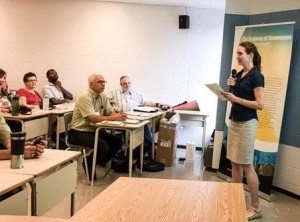
Sep 8, 2016 | Non categorizzato
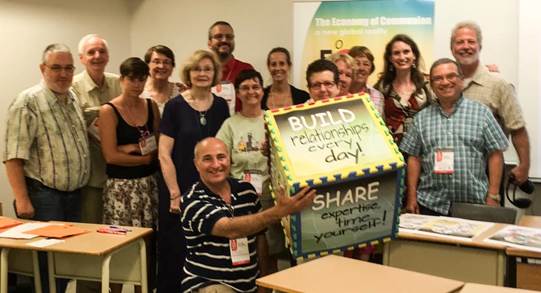 Courtesy Week at Yvonne’s school in Toronto, Canada, received a surprise visit from a Minister of the Canadian government who wanted to know more about how the students had used the Cube of Love to change the atmosphere in their classrooms, increase service and attention to others and alleviate bullying. That Peace Project received an award as one of the most exemplary practices in the school district and was adopted by other schools with the encouragement of the Minister of Education. In North Riverside, Illinois, USA, Carol began a social project called “The Art of Caring for Each Other”, which was adopted by the public administration and transformed foreigners and suspicious neighbours into a community marked by welcome and sharing.
Courtesy Week at Yvonne’s school in Toronto, Canada, received a surprise visit from a Minister of the Canadian government who wanted to know more about how the students had used the Cube of Love to change the atmosphere in their classrooms, increase service and attention to others and alleviate bullying. That Peace Project received an award as one of the most exemplary practices in the school district and was adopted by other schools with the encouragement of the Minister of Education. In North Riverside, Illinois, USA, Carol began a social project called “The Art of Caring for Each Other”, which was adopted by the public administration and transformed foreigners and suspicious neighbours into a community marked by welcome and sharing.  These are just a few of the best practices that the Focolare’s New Humanity Movement presented at the World Social Forum in Montreal, Canada during the second week of August. Projects, studies, social action and artistic performances helped to imagine that “Another world is necessary, together it becomes possible!”. It was the title chosen for this 12th edition of the worldwide workshop which originated in Porto Alegre, Brazil, 2001, as a response to the economic forum that was held by world economic leaders in Davos, Switzerland. The Social Forum provides an independent space to diverse expressions in civil society that are trying to bring change in the areas of human rights, economy, renewable energy and democracy. The Humanity Movement’s three public workshops at McGill University of Montreal and Quebec were an expo of best practices from the social, economic and political fields that have been influenced by Chiara Lubich’s charism of unity. Jean Charles Bitorirobe from Burundi, now a Canadian citizen, wanted to help heal the wound of ethnic conflict that still divides Hutu and Tutsi in his country and also in Quebec. “Our centre is meant as a cultural centre for all Burundians regardless of their ethnic roots. In February we gathered more than 420 people to share experiences, our sad baggage from the past and traditional customs that should no longer continue to divide our people. Our inspiration is the charism of unity.” Jean Claude also began a soccer team, a Kirundi language and dance class, a fundraiser for 150 mentally disable children from Burundi and a supper of typical dishes and traditional music. “Some people immediately thought we were thinking of starting a political party, but we only want to work for unity, and the ambassador expressed acknowledgement and appreciation of our work.” Cameroon politician and point of reference for the thousands of women Volunteers of the Focolare Movement, Patience Lobè, brought the workshop to a close. She had received death threats and was the target of several assassination attempts for having denounced corruption in the Public Works system in her country. “I felt I had to fight for justice. I don’t know if this is because it is part of my nature, but I do think that God uses us as his instruments.” As a civil engineer she earned a good salary, but the poverty all around her would not let her rest, and so this courageous woman created professional development centres that have led to jobs and cooperatives like the organic chicken farm that is now showpiece of the industrial edifice of the country. “Hunger and poverty are first of all a problem of values, but if we put ourselves together we can create the change and be people that do something new.” And that is totally in tune with the job description of the Social Forum.
These are just a few of the best practices that the Focolare’s New Humanity Movement presented at the World Social Forum in Montreal, Canada during the second week of August. Projects, studies, social action and artistic performances helped to imagine that “Another world is necessary, together it becomes possible!”. It was the title chosen for this 12th edition of the worldwide workshop which originated in Porto Alegre, Brazil, 2001, as a response to the economic forum that was held by world economic leaders in Davos, Switzerland. The Social Forum provides an independent space to diverse expressions in civil society that are trying to bring change in the areas of human rights, economy, renewable energy and democracy. The Humanity Movement’s three public workshops at McGill University of Montreal and Quebec were an expo of best practices from the social, economic and political fields that have been influenced by Chiara Lubich’s charism of unity. Jean Charles Bitorirobe from Burundi, now a Canadian citizen, wanted to help heal the wound of ethnic conflict that still divides Hutu and Tutsi in his country and also in Quebec. “Our centre is meant as a cultural centre for all Burundians regardless of their ethnic roots. In February we gathered more than 420 people to share experiences, our sad baggage from the past and traditional customs that should no longer continue to divide our people. Our inspiration is the charism of unity.” Jean Claude also began a soccer team, a Kirundi language and dance class, a fundraiser for 150 mentally disable children from Burundi and a supper of typical dishes and traditional music. “Some people immediately thought we were thinking of starting a political party, but we only want to work for unity, and the ambassador expressed acknowledgement and appreciation of our work.” Cameroon politician and point of reference for the thousands of women Volunteers of the Focolare Movement, Patience Lobè, brought the workshop to a close. She had received death threats and was the target of several assassination attempts for having denounced corruption in the Public Works system in her country. “I felt I had to fight for justice. I don’t know if this is because it is part of my nature, but I do think that God uses us as his instruments.” As a civil engineer she earned a good salary, but the poverty all around her would not let her rest, and so this courageous woman created professional development centres that have led to jobs and cooperatives like the organic chicken farm that is now showpiece of the industrial edifice of the country. “Hunger and poverty are first of all a problem of values, but if we put ourselves together we can create the change and be people that do something new.” And that is totally in tune with the job description of the Social Forum.
![Gen Rosso in Spain]()
Sep 7, 2016 | Non categorizzato
Guitar, drums, acoustic bass, piano, saxophone and the voices of Gen Rosso.  Twenty songs from 50 years of music-making: Un’altra umanità, Nascera, Costellazioni, and more. An acoustic and multi-cultural concert in three languages: Italian, Spanish and English. Below are the dates and locations of Gen Rosso’s tour in Spain: September 16, Teatro Jacinto Benavente de Galapagar, Madrid September 18, Teatro Fernández Baldor de Torrelodones, Madrid September 21, Auditorio Fundación Caja Rural de Granada September 23, Gran Teatro de Cáceres Sepember 24, Teatro Auditorio Riberas del Guadaíra, Alcalá de Guadaíra, Seville September 27, Vigil of Mercy at 20:30, Parish of San Pedro Poveda, Jaén September 29-30, Borja Hall, Valladolid October 2, Auditorio Colegio La Sagrada Familia, the Marists, Cartagena, Murcia Gen Rosso International Performing Arts Group is known for its internationality and the personal commitment of its members to spread a message of universal brotherhood and peace in favour of a more united world.
Twenty songs from 50 years of music-making: Un’altra umanità, Nascera, Costellazioni, and more. An acoustic and multi-cultural concert in three languages: Italian, Spanish and English. Below are the dates and locations of Gen Rosso’s tour in Spain: September 16, Teatro Jacinto Benavente de Galapagar, Madrid September 18, Teatro Fernández Baldor de Torrelodones, Madrid September 21, Auditorio Fundación Caja Rural de Granada September 23, Gran Teatro de Cáceres Sepember 24, Teatro Auditorio Riberas del Guadaíra, Alcalá de Guadaíra, Seville September 27, Vigil of Mercy at 20:30, Parish of San Pedro Poveda, Jaén September 29-30, Borja Hall, Valladolid October 2, Auditorio Colegio La Sagrada Familia, the Marists, Cartagena, Murcia Gen Rosso International Performing Arts Group is known for its internationality and the personal commitment of its members to spread a message of universal brotherhood and peace in favour of a more united world.
https://youtu.be/t5Cvfaz-e64
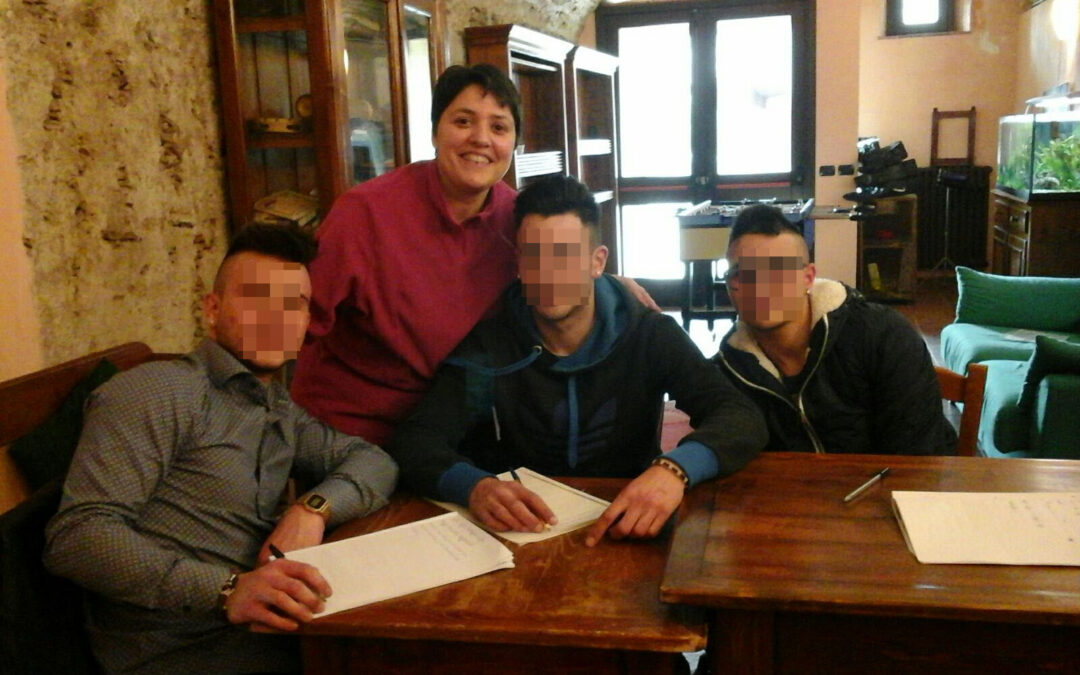
Sep 7, 2016 | Focolare Worldwide, Senza categoria
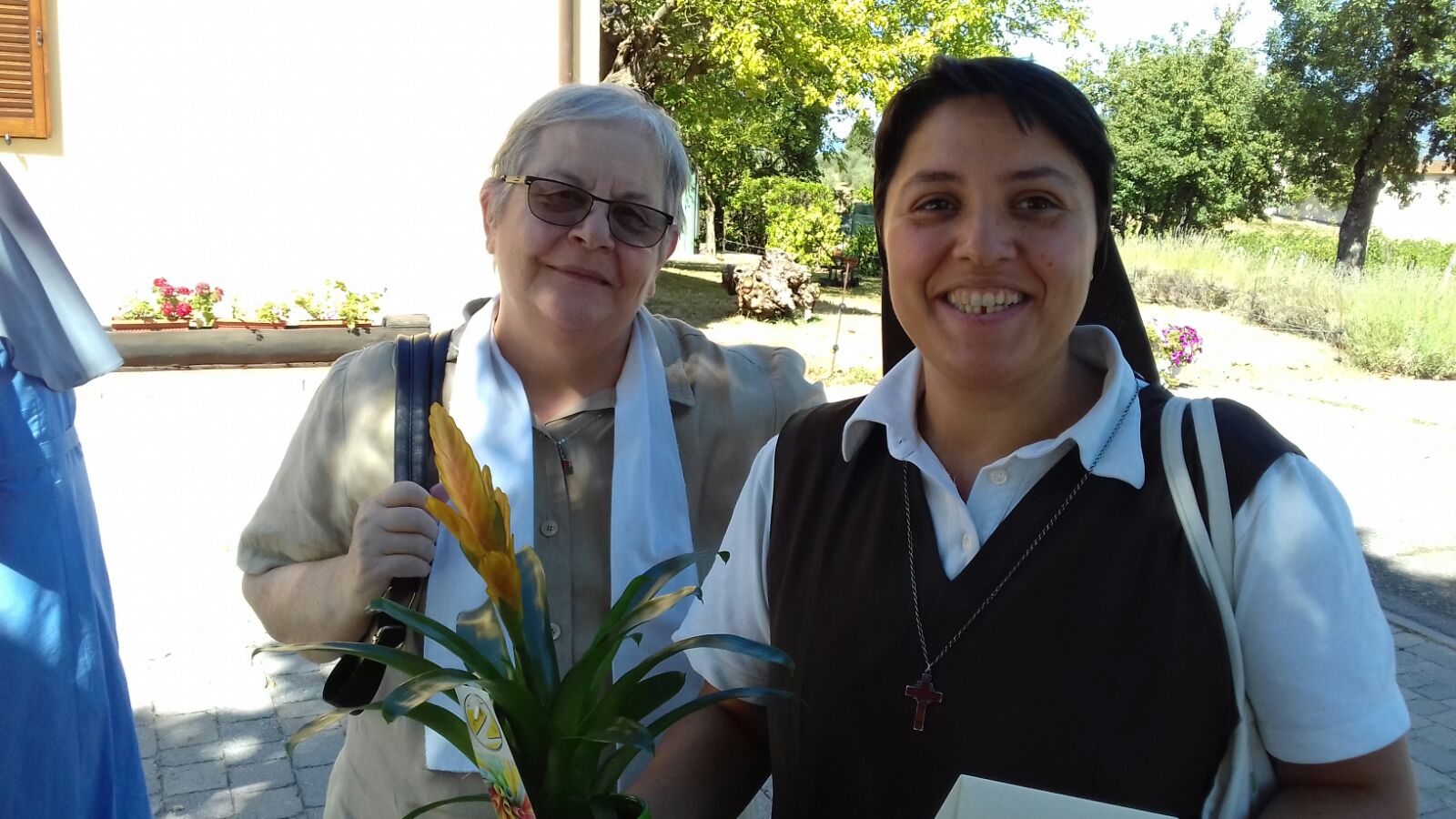 “I come from a simple family in the province of Naples. In my town, my father, a special deacon of the Eucharist, was in charge of the sick and the poor, who had in some way become members of our household. I was14 when dad passed away due to a tumour. I suffered so much, and in that time I didn’t believe that God was taking care of us, as he had always said. I threw myself into my studies, with the objective of earning lots of money to build a house of my own. At the age of 20 God appeared once more in my life: a group of friends had invited me to a meeting of which I honestly remember nothing; the only thing that pushed me to frequent succeeding ones was the joy I saw amongst them, and which was lacking in my life. I excelled in my studies, and had many friends but was not happy like them. I wanted to get to know more about this God they spoke to me about, and after a few years, also what I wanted to do with my life. I was introduced to my congregation almost by chance. To be sincere, I didn’t hold the nuns in great esteem. In my region the convent is still regarded as an escape from the world: and this certainly was not the life I wanted! I am a joyful, happy person and l love being with people. I had a degree and also many boyfriends. But in this religious family I found the love of my life – God, to whom I couldn’t say no. This was the house I had sought ever since I was an adolescent, but now with an addition: I was no longer alone, but had other sisters who loved Jesus, like me. My religious family – the Franciscan nuns of the Poor – had met the Focolare Movement at the turn of the 1960s. That period had been a painful one for the Congregation due to many internal problems. Our charism – to see Jesus in the poor and treat his wounds – in contact with the spirituality of unity, had taken on a new light and the Gospel with its message of mutual love was the answer to all that pain. The nuns created a Youth Centre so that the young girls could find their aim in life. Upon returning to the source of our charism, we also understood that the poor are not only in the sick, but in every suffering person.
“I come from a simple family in the province of Naples. In my town, my father, a special deacon of the Eucharist, was in charge of the sick and the poor, who had in some way become members of our household. I was14 when dad passed away due to a tumour. I suffered so much, and in that time I didn’t believe that God was taking care of us, as he had always said. I threw myself into my studies, with the objective of earning lots of money to build a house of my own. At the age of 20 God appeared once more in my life: a group of friends had invited me to a meeting of which I honestly remember nothing; the only thing that pushed me to frequent succeeding ones was the joy I saw amongst them, and which was lacking in my life. I excelled in my studies, and had many friends but was not happy like them. I wanted to get to know more about this God they spoke to me about, and after a few years, also what I wanted to do with my life. I was introduced to my congregation almost by chance. To be sincere, I didn’t hold the nuns in great esteem. In my region the convent is still regarded as an escape from the world: and this certainly was not the life I wanted! I am a joyful, happy person and l love being with people. I had a degree and also many boyfriends. But in this religious family I found the love of my life – God, to whom I couldn’t say no. This was the house I had sought ever since I was an adolescent, but now with an addition: I was no longer alone, but had other sisters who loved Jesus, like me. My religious family – the Franciscan nuns of the Poor – had met the Focolare Movement at the turn of the 1960s. That period had been a painful one for the Congregation due to many internal problems. Our charism – to see Jesus in the poor and treat his wounds – in contact with the spirituality of unity, had taken on a new light and the Gospel with its message of mutual love was the answer to all that pain. The nuns created a Youth Centre so that the young girls could find their aim in life. Upon returning to the source of our charism, we also understood that the poor are not only in the sick, but in every suffering person. 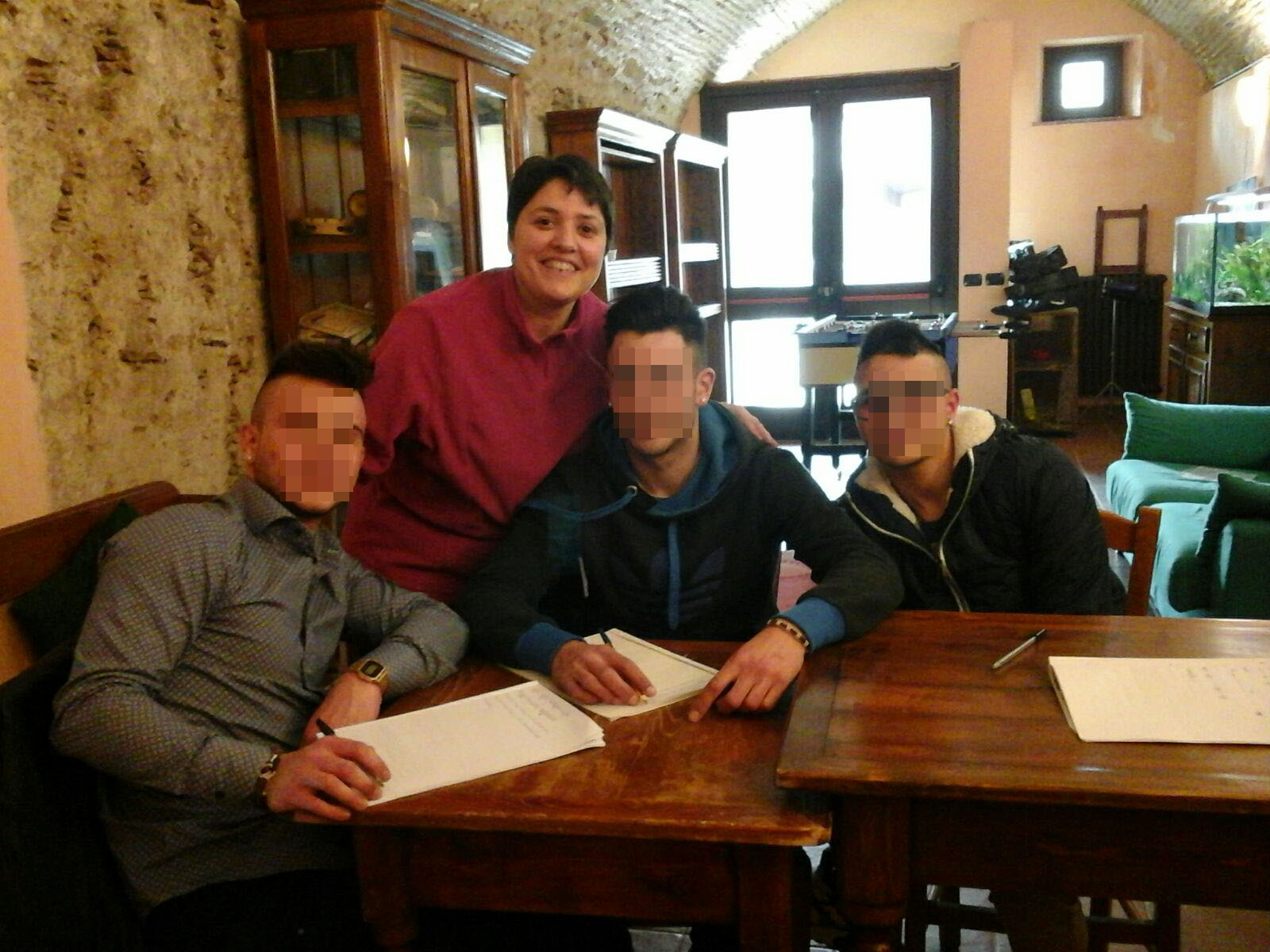 Today in Italy we care for the homeless, and the women who decide to escape from the trafficking of migrants, and work with the Caritas. We offer our help and consultancy also in the framework of the families: new unions, separations and divorce. We also work in the prisons and with minors, etc. Over the last six years I have worked as a teacher in Messina – I have a degree in Educational Sciences – in a therapeutic community for youths subjected to the control of the Juvenile Courts. I used to visit them to help them discover their importance in society. They would often say: “When you are with us, we feel the presence of something beautiful and good, could this be Jesus?” Recently, my superiors received a request for someone to work under a permanent contract, in the prisons of the Philippines and with street kids. I was assigned the job since the experience I have acquired in this field could be of great help. I have already said yes to God and do not want to back out just now. In September I shall leave for six months, to see if I can give my contribution there.”
Today in Italy we care for the homeless, and the women who decide to escape from the trafficking of migrants, and work with the Caritas. We offer our help and consultancy also in the framework of the families: new unions, separations and divorce. We also work in the prisons and with minors, etc. Over the last six years I have worked as a teacher in Messina – I have a degree in Educational Sciences – in a therapeutic community for youths subjected to the control of the Juvenile Courts. I used to visit them to help them discover their importance in society. They would often say: “When you are with us, we feel the presence of something beautiful and good, could this be Jesus?” Recently, my superiors received a request for someone to work under a permanent contract, in the prisons of the Philippines and with street kids. I was assigned the job since the experience I have acquired in this field could be of great help. I have already said yes to God and do not want to back out just now. In September I shall leave for six months, to see if I can give my contribution there.”
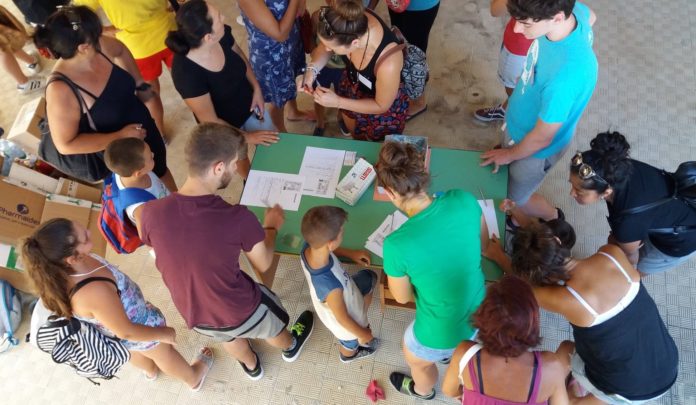
Sep 6, 2016 | Focolare Worldwide, Senza categoria
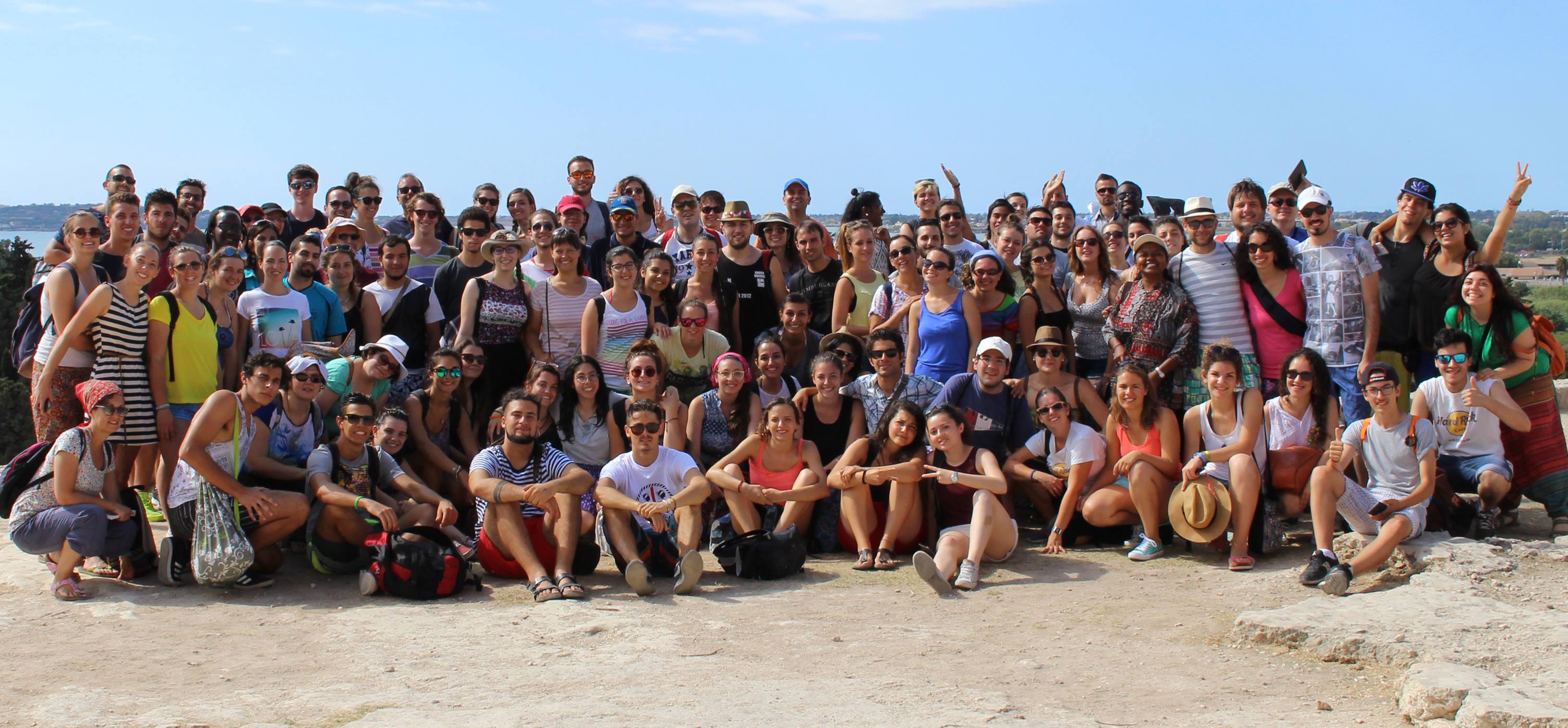 “Now let’s not call this an alternative vacation,” insists 21 year-old Nahomy Onate. “Many of us are regulars here on the Campus and so it’s no extraordinary experience for us but part of our life.” Nahomy comes from Reggello, Italy, close to the Focolare’s international town of Loppiano. She is actively involved in the Syracuse Summer Campus that was organized by young people from the Focolare. The local gazette reported “Youth For A United World Encounter Syracuse’s Peripheries”. This will be the third consecutive year that the neighbourhoods of Akradina, Tika and, this year, Grottasanta have hosted this experience which focuses on building relationships and acknowledging the human dignity of every person. A hundred and twenty young people from 17 Regions of Italy spent 10 days together, animating the peripheries with workshops on dance, journalism, theatre, drawing, and more. Over a hundred children and teenagers between the ages of 6 and 13 took part. “I had already been here for the second edition of the project and knew more or less what to expect. I was also familiar with the disadvantaged situation of this neighbourhood. But the moment we got here, the general attitude of everyone really struck me: we were willing and ready to give of ourselves for 10 days. And that’s what happened.” Nahomy explained that what was new this year was Grottasanta, another disadvantaged and at-risk neighbourhood of the city.
“Now let’s not call this an alternative vacation,” insists 21 year-old Nahomy Onate. “Many of us are regulars here on the Campus and so it’s no extraordinary experience for us but part of our life.” Nahomy comes from Reggello, Italy, close to the Focolare’s international town of Loppiano. She is actively involved in the Syracuse Summer Campus that was organized by young people from the Focolare. The local gazette reported “Youth For A United World Encounter Syracuse’s Peripheries”. This will be the third consecutive year that the neighbourhoods of Akradina, Tika and, this year, Grottasanta have hosted this experience which focuses on building relationships and acknowledging the human dignity of every person. A hundred and twenty young people from 17 Regions of Italy spent 10 days together, animating the peripheries with workshops on dance, journalism, theatre, drawing, and more. Over a hundred children and teenagers between the ages of 6 and 13 took part. “I had already been here for the second edition of the project and knew more or less what to expect. I was also familiar with the disadvantaged situation of this neighbourhood. But the moment we got here, the general attitude of everyone really struck me: we were willing and ready to give of ourselves for 10 days. And that’s what happened.” Nahomy explained that what was new this year was Grottasanta, another disadvantaged and at-risk neighbourhood of the city.  “When we arrived in front of the school where we would be conducting the activities with the children and teenagers, the scene before me really shocked me: The shiny sea seemed to frame the once grand and now run-down palaces that stood like symbols of the social degradation that had taken place. Education is often the first thing to give a sense of dignity to a human being, but the conditions of that school just didn’t allow it to provide anything to anyone. Yet beyond the gate were mothers, teachers and children who welcomed us with huge applause and with much hope for change in their eyes. This was all it took to make us realize that despite the short time we had at our disposal, we had to place all our bets on this most fragile part of society and give all of ourselves. This is what each one of us did, establishing close fraternal relationships with each one of them. Following a very harsh argument between two little boys, my eyes were opened to the daily reality in which they live: Violence, taking revenge and indifference are the ‘values’ they are raised on. In front of that situation which had been created, we tried to explain to them that it was better not to respond to violence with more violence, that there are other ways, even though no one had ever shown them those ways. ‘Let’s quit acting like the mafia,’ said one of the boys, ‘I don’t want to see violence and revenge in this neighbourhood any more. Now, we’re changed.’ It only took a few days inside a whirlpool of mutual love for this boy to pronounce those words to his peers. The seed that we had been planting and watering over these three years and during those few days was growing. We were leaving something in them. We realized that they were the future and that it’s always possible to change and be different, to be better. In those neighbourhoods of Syracuse you find only one of the many peripheries of Italy, and we no longer want to ignore so many situations that are happening even in our own cities, places in the world that are losing their values, their love and their courage. I returned home a bit nostalgic and sad: I miss each of the children, but I also feel charged and full of their love, their smiles and their will to change their world.”
“When we arrived in front of the school where we would be conducting the activities with the children and teenagers, the scene before me really shocked me: The shiny sea seemed to frame the once grand and now run-down palaces that stood like symbols of the social degradation that had taken place. Education is often the first thing to give a sense of dignity to a human being, but the conditions of that school just didn’t allow it to provide anything to anyone. Yet beyond the gate were mothers, teachers and children who welcomed us with huge applause and with much hope for change in their eyes. This was all it took to make us realize that despite the short time we had at our disposal, we had to place all our bets on this most fragile part of society and give all of ourselves. This is what each one of us did, establishing close fraternal relationships with each one of them. Following a very harsh argument between two little boys, my eyes were opened to the daily reality in which they live: Violence, taking revenge and indifference are the ‘values’ they are raised on. In front of that situation which had been created, we tried to explain to them that it was better not to respond to violence with more violence, that there are other ways, even though no one had ever shown them those ways. ‘Let’s quit acting like the mafia,’ said one of the boys, ‘I don’t want to see violence and revenge in this neighbourhood any more. Now, we’re changed.’ It only took a few days inside a whirlpool of mutual love for this boy to pronounce those words to his peers. The seed that we had been planting and watering over these three years and during those few days was growing. We were leaving something in them. We realized that they were the future and that it’s always possible to change and be different, to be better. In those neighbourhoods of Syracuse you find only one of the many peripheries of Italy, and we no longer want to ignore so many situations that are happening even in our own cities, places in the world that are losing their values, their love and their courage. I returned home a bit nostalgic and sad: I miss each of the children, but I also feel charged and full of their love, their smiles and their will to change their world.”
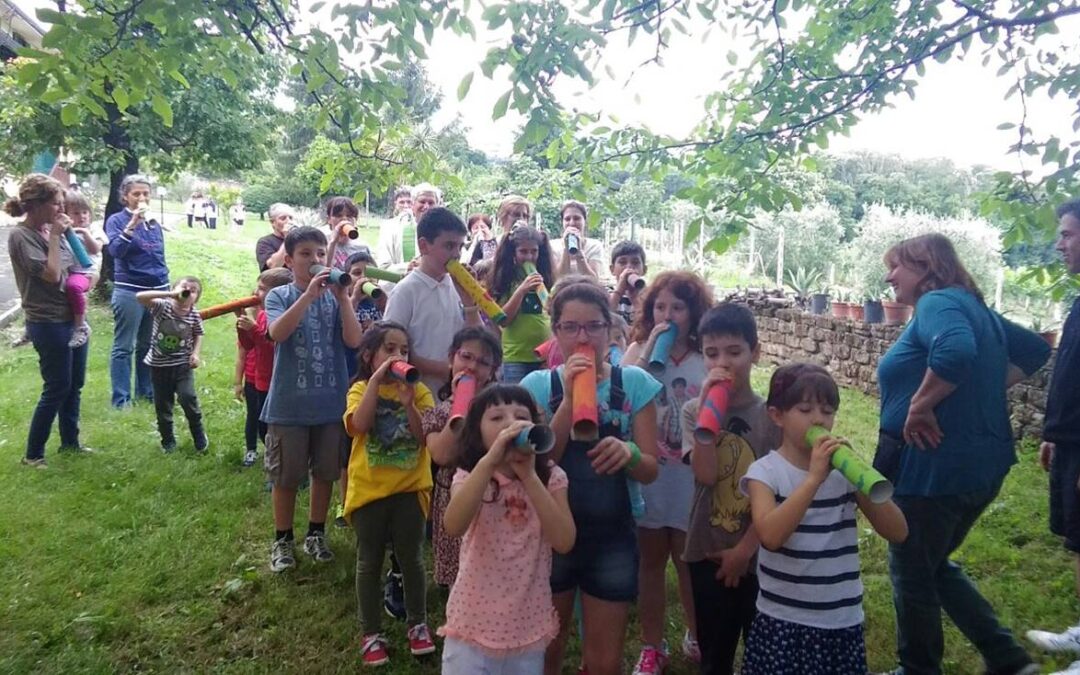
Sep 5, 2016 | Non categorizzato
 Elisa with the entire family – a twin brother, an elder brother, daddy, and the grandmothers – just a few weeks earlier, had been to the Mariapolis – the Focolare’s summer gathering – with about a hundred other people. It had been an occasion to know each other, share life experiences, and take a step ahead together. Everyone remembers Elisa who before leaving, with her gay and contagious ways had shot a video of the impressions of her group with the help of her twin brother. “The Mariapolis is an experience that leaves its mark in one’s heart forever. I hope to go to the Mariapolis always,” she had texted her mother upon returning home. Instead, Gabriele, her little 8-year-old cousin, in mid-June had participated for the second consecutive year in the little “Gen4 congress.” It was an enchanting three-day event with the little kids who understand “the things of God” better than anyone else. A photo shows him in the role of an angel playing a trumpet upon the passage through the Door of Mercy, together with all the other boys. In the morning of 24 August the news of the earthquake arrived, and also the anguish: Elisa, Gabriele and their grandmothers were under the ruins and all feared the outcome for those who were missing. A chain of prayers immediately started like a tam-tam, but in the evening it was confirmed: they didn’t make it.
Elisa with the entire family – a twin brother, an elder brother, daddy, and the grandmothers – just a few weeks earlier, had been to the Mariapolis – the Focolare’s summer gathering – with about a hundred other people. It had been an occasion to know each other, share life experiences, and take a step ahead together. Everyone remembers Elisa who before leaving, with her gay and contagious ways had shot a video of the impressions of her group with the help of her twin brother. “The Mariapolis is an experience that leaves its mark in one’s heart forever. I hope to go to the Mariapolis always,” she had texted her mother upon returning home. Instead, Gabriele, her little 8-year-old cousin, in mid-June had participated for the second consecutive year in the little “Gen4 congress.” It was an enchanting three-day event with the little kids who understand “the things of God” better than anyone else. A photo shows him in the role of an angel playing a trumpet upon the passage through the Door of Mercy, together with all the other boys. In the morning of 24 August the news of the earthquake arrived, and also the anguish: Elisa, Gabriele and their grandmothers were under the ruins and all feared the outcome for those who were missing. A chain of prayers immediately started like a tam-tam, but in the evening it was confirmed: they didn’t make it. 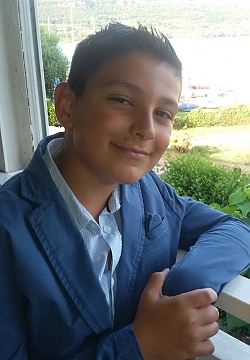 Their families immediately gave an unwavering testimony: “Their faith in God’s love was such that even in this immense suffering, they enlightened us with renewed determination to live for that which does not pass”, wrote Maria Voce, President of the Focolare, to the stricken communities and families, the day after the earthquake. Meanwhile the Focolare communities throughout the world and Italy had launched the rescue system.
Their families immediately gave an unwavering testimony: “Their faith in God’s love was such that even in this immense suffering, they enlightened us with renewed determination to live for that which does not pass”, wrote Maria Voce, President of the Focolare, to the stricken communities and families, the day after the earthquake. Meanwhile the Focolare communities throughout the world and Italy had launched the rescue system.
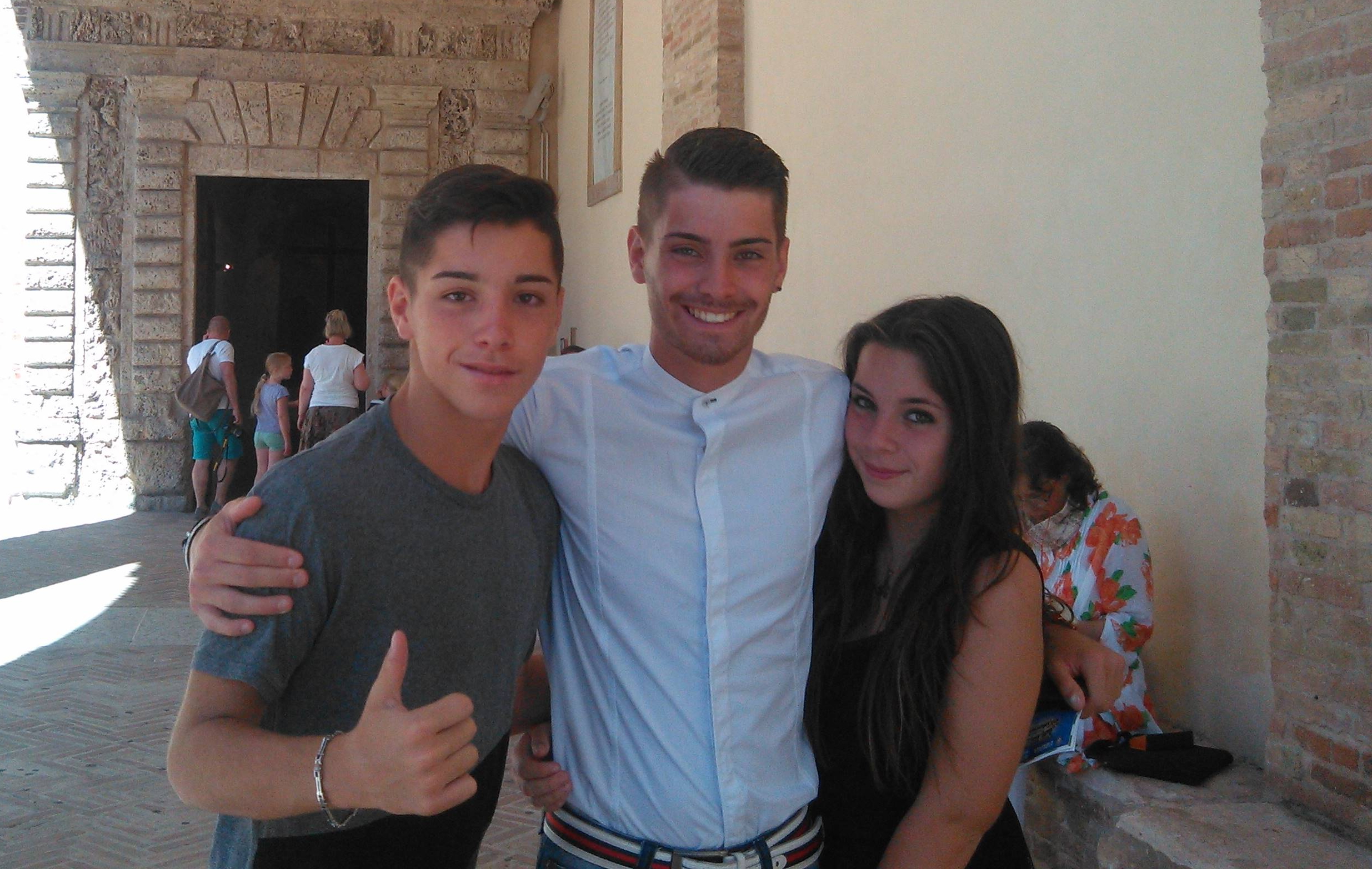
Elisa with her two brothers
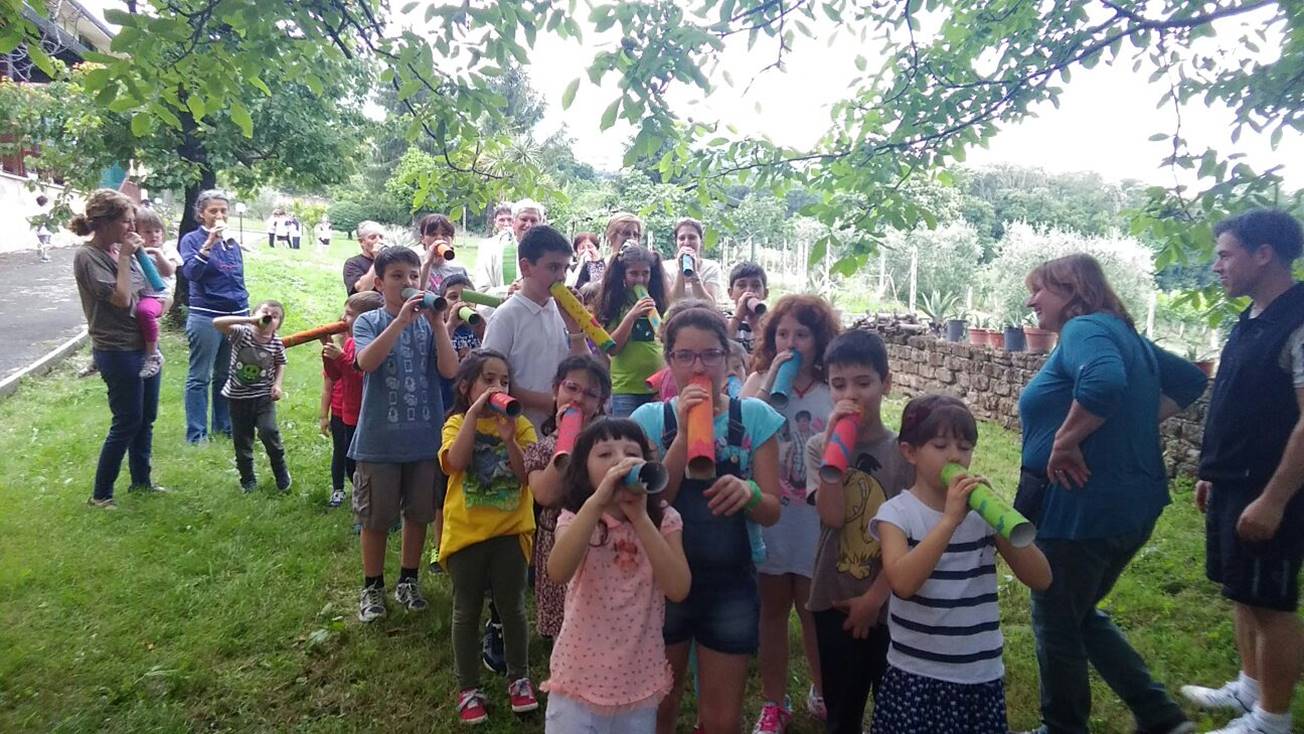
Gabriele at the Mariapolis
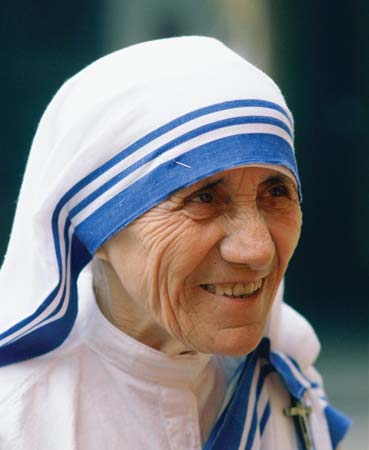
Sep 4, 2016 | Non categorizzato
 “Mother Teresa is … a great teacher of the art of loving. She truly loved everyone. She didn’t ask her neighbour if he or she was Catholic, Hindu, Muslim, etc. … Undoubtedly, Mother Teresa was the first to love. She went out looking for those entrusted to her by God. Mother Teresa saw Jesus in every person, perhaps in a way no others did. Her motto was: “You did it for me.” Mother Teresa made herself one with everyone. She made herself poor with the poor and especially in the same way as the poor. … She didn’t accept anything that the poor couldn’t have as well. We know, for example, that she and her sisters do without having even a simple washing machine, something that many people do not understand. They say: “Nowadays!” But she did not want one because the poor don’t have them. She took upon herself and identified herself with the wretchedness of the poor, their grief, their sickness and death. Mother Teresa loved everyone as herself, to the point of offering others her own ideal. For example, she invited the volunteers who spent a period of time serving in her Work to seek out their own “Calcutta” when they went home to their countries. She said: it is because there are poor people everywhere. Mother Teresa certainly loved her enemies. She never stopped to dispute the absurd accusations they made against her, but she prayed for her enemies. Yes, in her we can see “the art of loving” lived to perfection. She was … a queen of charity.” Chiara Lubich Message during a Conference Call on 25th September 1997.
“Mother Teresa is … a great teacher of the art of loving. She truly loved everyone. She didn’t ask her neighbour if he or she was Catholic, Hindu, Muslim, etc. … Undoubtedly, Mother Teresa was the first to love. She went out looking for those entrusted to her by God. Mother Teresa saw Jesus in every person, perhaps in a way no others did. Her motto was: “You did it for me.” Mother Teresa made herself one with everyone. She made herself poor with the poor and especially in the same way as the poor. … She didn’t accept anything that the poor couldn’t have as well. We know, for example, that she and her sisters do without having even a simple washing machine, something that many people do not understand. They say: “Nowadays!” But she did not want one because the poor don’t have them. She took upon herself and identified herself with the wretchedness of the poor, their grief, their sickness and death. Mother Teresa loved everyone as herself, to the point of offering others her own ideal. For example, she invited the volunteers who spent a period of time serving in her Work to seek out their own “Calcutta” when they went home to their countries. She said: it is because there are poor people everywhere. Mother Teresa certainly loved her enemies. She never stopped to dispute the absurd accusations they made against her, but she prayed for her enemies. Yes, in her we can see “the art of loving” lived to perfection. She was … a queen of charity.” Chiara Lubich Message during a Conference Call on 25th September 1997.
Reead more: The magnificat of Mother Theresa of Calcutta as received by Chiara Lubich – Press releases SIF– 1° Settembre 2016
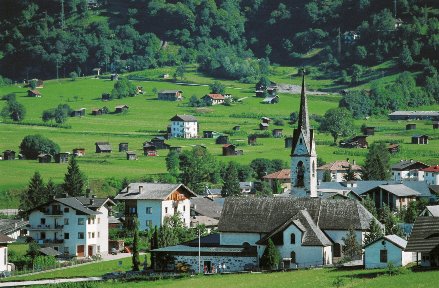
Sep 3, 2016 | Focolare Worldwide
 In 1959 the last of the earliest Mariapolises (cities of Mary) was held in Fiera di Primiero, Italy. The Mariapolis is probably the Focolare’s most characteristic event in which young and old people of all backgrounds spend several days together for an experience of fraternity in the light of of the universal values of the Gospel. Nowadays Mariapolises are held every year in an increasing number of countries, presenting the Golden Rule in a variety of cultural settings. On August 22, 1959 when the Cold War was in full swing and setting the Western Bloc in opposition to the Soviet Bloc, people from 27 countries who were attending the Mariapolis decided to consecrate themselves and their people of their nations to Mary. Their act of consecration was recited in nine languages and made that small “people” at the Mariapolis realize that the life of unity which was revealed and experienced in Primiero was destined to spread throughout the world. Today’s “clash of incivility” and the chaotic relations between states highlights the significance of that 1959 proposal. On August 27-28, 2016 the newly assembled Municipality of Primiero hosted a conference titled “Peoples in the Human Family”, which had as speakers Lawyer Gianni Caso, honorary president of the Supreme Court and Vincenzo Bonomo, director of the Law School at the Pontifical Lateran University. Nowadays we do not talk about peoples, but rather of states. The peoples of the world are the result of natural combinations. They own the right of self-determination; whereas, states even come to deny the existence of indigenous peoples in order not to recognize their right to self-determination. It is preferable to speak of “civil society” which, at best, can have an opinion. Peoples do not have an opinion: they have a right to self-determination and expect that right to be upheld. “Peace among peoples is the order that is willed by God,” Chiara Lubich said. And she entrusted the peoples of the world to Mary, not the states. She entrusted them to Mary as their defender, because the peoples of the world have the right to be defended. “Now, we no longer have a Cold War,” Bonomo acknowledges, “but there is a cold peace which is perhaps worse, because it is peace or a presumption of peace that is not based on shared values.” What remains today of that 1959 consecration? The proclamation of those principles is still as timely as it ever was as we try to find our way on the difficult geopolitical landscape of today’s world. For the speakers at the conference it remains the method for interpreting the facts; it remains an important means of the vision of a united world, which does not abolish the differences but celebrates them. Today there is a desire to rediscover the prophetic values that were sanctioned during that August of 1959, and the people at this year’s conference have shown zeal and determination to do that. One local politician, the Mayor of the Municipality of Primiero said that the Mariapolis of Primiero should not merely be a tourist attraction for the valley but, with its values, finally change our life.” There is need to make Chiara Lubich’s legacy grow and change Primiero into a laboratory of brotherhood among peoples. This process has also been seen in the recent not-so-easy unification of four municipalities: Fiera di Primiero, Siror, Tonadico and Transacqua. They represent four small “peoples’ that for the sake of the common good chose communion. Those that who had lived that experience 50 years ago talk about “having planted seeds that still need watering.” During the discussions a connection was made between the “Spirit of Assisi” with its relationships among religions and the “Spirit of Primiero” with its relationships among the peoples of the world. On the morning of Sunday, August 28, 2016 the 1959 act of consecration was recited again in the same crowded church of Fiera di Primiero. It was a festive sign of a newer, deeper and more responsible idea of what peace means. By Roberto Di Pietro Source: Città Nuova
In 1959 the last of the earliest Mariapolises (cities of Mary) was held in Fiera di Primiero, Italy. The Mariapolis is probably the Focolare’s most characteristic event in which young and old people of all backgrounds spend several days together for an experience of fraternity in the light of of the universal values of the Gospel. Nowadays Mariapolises are held every year in an increasing number of countries, presenting the Golden Rule in a variety of cultural settings. On August 22, 1959 when the Cold War was in full swing and setting the Western Bloc in opposition to the Soviet Bloc, people from 27 countries who were attending the Mariapolis decided to consecrate themselves and their people of their nations to Mary. Their act of consecration was recited in nine languages and made that small “people” at the Mariapolis realize that the life of unity which was revealed and experienced in Primiero was destined to spread throughout the world. Today’s “clash of incivility” and the chaotic relations between states highlights the significance of that 1959 proposal. On August 27-28, 2016 the newly assembled Municipality of Primiero hosted a conference titled “Peoples in the Human Family”, which had as speakers Lawyer Gianni Caso, honorary president of the Supreme Court and Vincenzo Bonomo, director of the Law School at the Pontifical Lateran University. Nowadays we do not talk about peoples, but rather of states. The peoples of the world are the result of natural combinations. They own the right of self-determination; whereas, states even come to deny the existence of indigenous peoples in order not to recognize their right to self-determination. It is preferable to speak of “civil society” which, at best, can have an opinion. Peoples do not have an opinion: they have a right to self-determination and expect that right to be upheld. “Peace among peoples is the order that is willed by God,” Chiara Lubich said. And she entrusted the peoples of the world to Mary, not the states. She entrusted them to Mary as their defender, because the peoples of the world have the right to be defended. “Now, we no longer have a Cold War,” Bonomo acknowledges, “but there is a cold peace which is perhaps worse, because it is peace or a presumption of peace that is not based on shared values.” What remains today of that 1959 consecration? The proclamation of those principles is still as timely as it ever was as we try to find our way on the difficult geopolitical landscape of today’s world. For the speakers at the conference it remains the method for interpreting the facts; it remains an important means of the vision of a united world, which does not abolish the differences but celebrates them. Today there is a desire to rediscover the prophetic values that were sanctioned during that August of 1959, and the people at this year’s conference have shown zeal and determination to do that. One local politician, the Mayor of the Municipality of Primiero said that the Mariapolis of Primiero should not merely be a tourist attraction for the valley but, with its values, finally change our life.” There is need to make Chiara Lubich’s legacy grow and change Primiero into a laboratory of brotherhood among peoples. This process has also been seen in the recent not-so-easy unification of four municipalities: Fiera di Primiero, Siror, Tonadico and Transacqua. They represent four small “peoples’ that for the sake of the common good chose communion. Those that who had lived that experience 50 years ago talk about “having planted seeds that still need watering.” During the discussions a connection was made between the “Spirit of Assisi” with its relationships among religions and the “Spirit of Primiero” with its relationships among the peoples of the world. On the morning of Sunday, August 28, 2016 the 1959 act of consecration was recited again in the same crowded church of Fiera di Primiero. It was a festive sign of a newer, deeper and more responsible idea of what peace means. By Roberto Di Pietro Source: Città Nuova
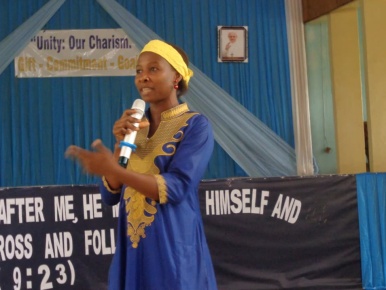
Sep 2, 2016 | Focolare Worldwide
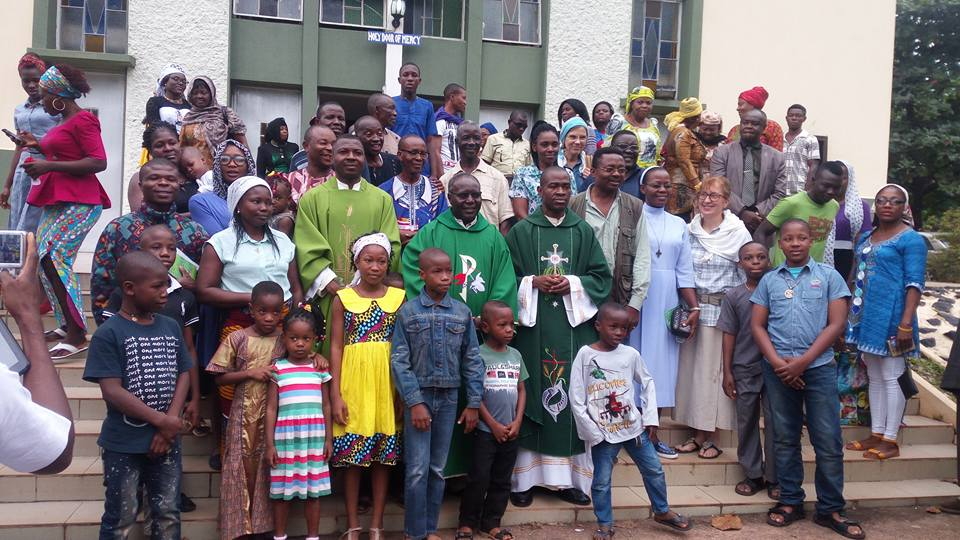 On July 2 – 7, 2016, four hundred people gathered, far from all the spotlights, for an intense experience of communion among young and old, children, priests, members of other Christian Churches and other Religions. Good deeds never make a lot of noise and the media is often more interested in news about violence, abuse of power, kidnappings and bombings. But Nigeria also has another side: the place where the Mariapolis was held, for example, Brigard National Seminary of Enugu, the largest Roman Catholic major seminary in the world. This says much about the faith that is lived so intensely in that land. The Mariapolis opened with a group of fifty young singers who presented a medley of Gospel hymns that had a lot harmony and rhythm. Suddenly the group divided as a number of couples emerged in traditional dress from the different regions of Nigeria. Each of them was identified as they crossed the stage amidst cheers and clapping. The scene closed with everyone in the hall on their feet and singing the National Anthem. There was an explosion of joy that seemed to echo the Bishop’s invitation during his homily to live out the theme of the Mariapolis with the “energy and imagination that is so common to the young.” This year’s theme was Unity: Gift, Commitment and Goal. Unity is a value that is dear to the Bishop because it is “so needed here in Nigeria.” Bishop Callistus Chukwuma Valentine Onaga of Enugu then encouraged everyone to live unity with three objectives in mind: solidarity, subsidiarity and the common good.
On July 2 – 7, 2016, four hundred people gathered, far from all the spotlights, for an intense experience of communion among young and old, children, priests, members of other Christian Churches and other Religions. Good deeds never make a lot of noise and the media is often more interested in news about violence, abuse of power, kidnappings and bombings. But Nigeria also has another side: the place where the Mariapolis was held, for example, Brigard National Seminary of Enugu, the largest Roman Catholic major seminary in the world. This says much about the faith that is lived so intensely in that land. The Mariapolis opened with a group of fifty young singers who presented a medley of Gospel hymns that had a lot harmony and rhythm. Suddenly the group divided as a number of couples emerged in traditional dress from the different regions of Nigeria. Each of them was identified as they crossed the stage amidst cheers and clapping. The scene closed with everyone in the hall on their feet and singing the National Anthem. There was an explosion of joy that seemed to echo the Bishop’s invitation during his homily to live out the theme of the Mariapolis with the “energy and imagination that is so common to the young.” This year’s theme was Unity: Gift, Commitment and Goal. Unity is a value that is dear to the Bishop because it is “so needed here in Nigeria.” Bishop Callistus Chukwuma Valentine Onaga of Enugu then encouraged everyone to live unity with three objectives in mind: solidarity, subsidiarity and the common good.  With such a high start, the topics regarding Focolare spirituality and its concrete application to daily life fell on fertile ground. The testimonies were particularly effective and at times quite moving. They were presented by couples and single people who were committed to living the Gospel in both their daily adventures and misadventures. The witness of a member of the Pentecostal Church and young Muslim was particularly significant and helped in understanding the concepts that were being presented. Afternoons were dedicated to a wide variety of workshops that highlighted how unity can improve the life of individuals and of society. One group discussed the treasures and the challenges of family life; another reflected on how to live unity in the midst of the nation’s current problems. Other workshops offered people the opportunity to acquire some new skills: a mini-course on electricity, another for beauticians, hair stylists, and so on. These were greatly appreciated and seen as a gift that reminded everyone of Chiara Lubich and her Economy of Communion project. “It’s not a matter of wealthy people being philanthropic,” she had remarked in 1999, “but of sharing among equals, mutual giving and receiving.” Everybody wished to seal their proposal to live unity by walking together through the Holy Door at the Seminary Chapel in order to embrace the grace of this special Year of Mercy and to renew their commitment to be merciful to one another and to all. Video of the Mariapolis in Enugu https://vimeo.com/181015319
With such a high start, the topics regarding Focolare spirituality and its concrete application to daily life fell on fertile ground. The testimonies were particularly effective and at times quite moving. They were presented by couples and single people who were committed to living the Gospel in both their daily adventures and misadventures. The witness of a member of the Pentecostal Church and young Muslim was particularly significant and helped in understanding the concepts that were being presented. Afternoons were dedicated to a wide variety of workshops that highlighted how unity can improve the life of individuals and of society. One group discussed the treasures and the challenges of family life; another reflected on how to live unity in the midst of the nation’s current problems. Other workshops offered people the opportunity to acquire some new skills: a mini-course on electricity, another for beauticians, hair stylists, and so on. These were greatly appreciated and seen as a gift that reminded everyone of Chiara Lubich and her Economy of Communion project. “It’s not a matter of wealthy people being philanthropic,” she had remarked in 1999, “but of sharing among equals, mutual giving and receiving.” Everybody wished to seal their proposal to live unity by walking together through the Holy Door at the Seminary Chapel in order to embrace the grace of this special Year of Mercy and to renew their commitment to be merciful to one another and to all. Video of the Mariapolis in Enugu https://vimeo.com/181015319
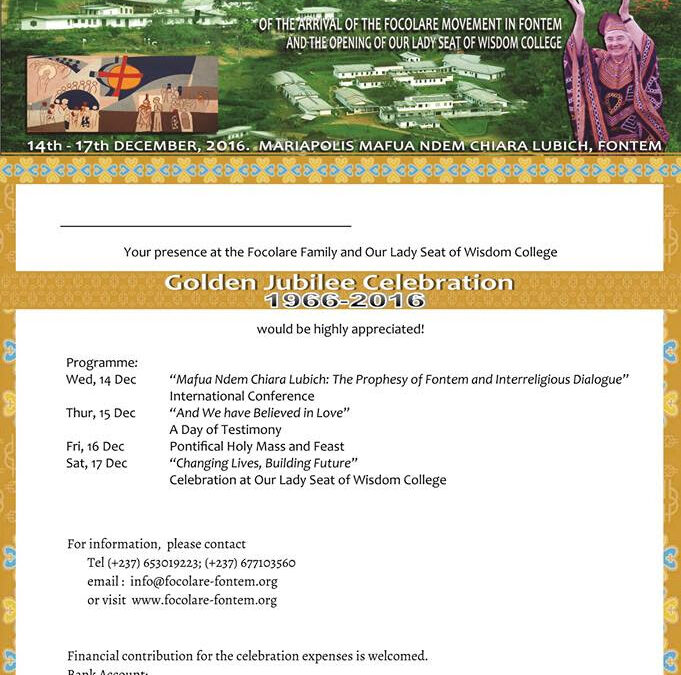
Sep 1, 2016 | Non categorizzato
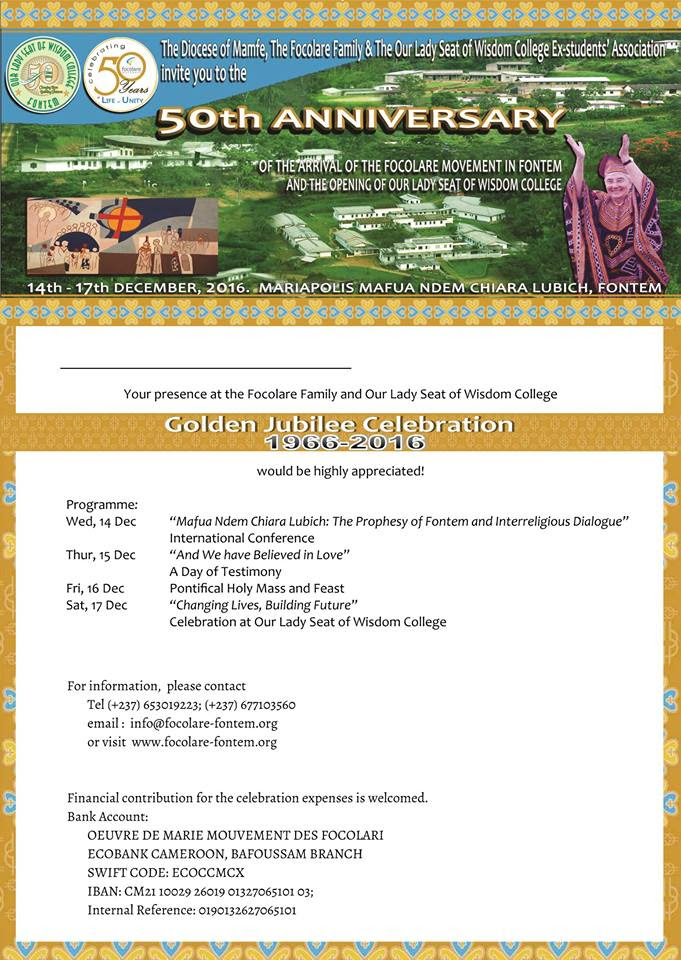 The diocese of Mamfe, the Focolare family and the Alumni Association of the school, “Our Lady Seat of Wisdom,” are extending an invitation to all for the 50th anniversary celebration (1966-2016) of the arrival of the Focolare Movement in Fontem (Camerun) and the opening of the school. The celebrations will be held at the “Mariapolis Mafua Ndem Chiara Lubich” (Fontem) from 14 to 17 December 2016. For information: info@focolare-fontem.org Web site: www.focolare-fontem.org
The diocese of Mamfe, the Focolare family and the Alumni Association of the school, “Our Lady Seat of Wisdom,” are extending an invitation to all for the 50th anniversary celebration (1966-2016) of the arrival of the Focolare Movement in Fontem (Camerun) and the opening of the school. The celebrations will be held at the “Mariapolis Mafua Ndem Chiara Lubich” (Fontem) from 14 to 17 December 2016. For information: info@focolare-fontem.org Web site: www.focolare-fontem.org

Sep 1, 2016 | Non categorizzato
 Just as Jesus had immediately inserted himself into the sub-layer of society by being born in a stable amongst the homeless, the refugees, the banished; so too, by allowing himself to be crucified and abandoned, he stood in the midst of the massive crowd of all those who suffer: the oppressed, the discouraged, the hungry and the defeated of every age. His focus on all those in misery gives humankind the measure of his love, and was nothing but the logical consequence of having completely fit himself into humanity’s brokenness. It was his way to make himself the last, the vilest of creatures, the most degraded – the way for to be at the root of all misery, a root that raises to Heaven. Infinity empties itself out of love. He had created the universe, developed and ruled it. The universe represents the production of something of boundless grandeur, somehow proportionate to the greatness of his mind, a world made of worlds, one more wondrous than the next. And humankind – tiny creatures on one small planet – after centuries of studying has only a minuscule idea of all that the universe contains: with stars that in our galaxy alone are four light-years apart and from the edges of the galaxy to its centre span a distance of 30 light-years which they can cover back and forth only 1,500 times in a billion years. In this universe that is infinitely too great for the human mind to fathom, he had also taken note of the misery of the human organisms on planet earth, and emptied himself in order to become one of them. He helped them to the point of giving them the Gospel and his very Self in the form of Food. The Redemption re-establishes the design of Creation, which includes that the existence of the stars and the atoms of the universe and the creatures of earth be in constant harmony for the realization of unity. This is why the Creator breathed into it the breath of life that is love. Health, peace and welfare flower in accordance with this precept. (Igino Giordani, L’unico amore, (Rome: Città Nuova, 1974) p. 64 and 105
Just as Jesus had immediately inserted himself into the sub-layer of society by being born in a stable amongst the homeless, the refugees, the banished; so too, by allowing himself to be crucified and abandoned, he stood in the midst of the massive crowd of all those who suffer: the oppressed, the discouraged, the hungry and the defeated of every age. His focus on all those in misery gives humankind the measure of his love, and was nothing but the logical consequence of having completely fit himself into humanity’s brokenness. It was his way to make himself the last, the vilest of creatures, the most degraded – the way for to be at the root of all misery, a root that raises to Heaven. Infinity empties itself out of love. He had created the universe, developed and ruled it. The universe represents the production of something of boundless grandeur, somehow proportionate to the greatness of his mind, a world made of worlds, one more wondrous than the next. And humankind – tiny creatures on one small planet – after centuries of studying has only a minuscule idea of all that the universe contains: with stars that in our galaxy alone are four light-years apart and from the edges of the galaxy to its centre span a distance of 30 light-years which they can cover back and forth only 1,500 times in a billion years. In this universe that is infinitely too great for the human mind to fathom, he had also taken note of the misery of the human organisms on planet earth, and emptied himself in order to become one of them. He helped them to the point of giving them the Gospel and his very Self in the form of Food. The Redemption re-establishes the design of Creation, which includes that the existence of the stars and the atoms of the universe and the creatures of earth be in constant harmony for the realization of unity. This is why the Creator breathed into it the breath of life that is love. Health, peace and welfare flower in accordance with this precept. (Igino Giordani, L’unico amore, (Rome: Città Nuova, 1974) p. 64 and 105

Aug 31, 2016 | Focolare Worldwide, Senza categoria
 “An unexpected phone call came one early morning. My elder brother’s voice at the other end of the line sounded confused. My nephew had just met an accident. He had been about to pick up my brother from work, but while driving he had dozed off, and those few seconds were enough for him to hit a motorcycle and kill two of his colleagues. They were both married men with families. It was indeed a shock for me; it was so heartbreaking. I went to look for my nephew. He was in a prison cell. I didn’t know what to say; I could only cry with him. Since it was early morning and my nephew and the other detainees had not yet had breakfast, I went to buy some food for them. Then I asked the prison guard if it was possible to clean the prison cell which was quite dirty. When my brother arrived and started crying, I stayed to comfort him. At this point, I realized that our next step had to be to ask for forgiveness from the families of the two victims. I told my brother that we should go to their wakes, face their families and ask for their forgiveness. My brother agreed, overcoming his own fear. We went to see the first family … and we went straight to the widow, who was crying. She was indeed quite angry with my brother. I felt I had to be there to absorb all her pain. Then I embraced her and said, ‘We are here to ask your forgiveness for what happened, without expecting to be forgiven.’ Then we also had to ask forgiveness from the victim’s parents. Their relatives advised us not to, because they were afraid that his mother would lose her calm and be beside herself with anger. But I strongly felt that we had to do it. I approached the mother, with my brother close behind me. Indeed, she cried aloud as I entrusted everything silently to God and embraced her tightly asking her to forgive us, also on behalf of my nephew. I assured her that if we would have found the way to take care of their family, providing for the education of the three daughters who were still in grade school. I was profoundly experiencing the pain and sorrow of t family, but at the same time, I fully experienced that peace that only God can give. Before leaving, we went to say goodbye to the widow. She did not say anything to my brother; but she did introduce me to her three daughters. This consoled me since I considered it an indication that I was able to establish some kind of a relationship with her. Some days later, with some friends from the Focolare, I attended the funeral… and also visited the family of the other victim. My nephew was released from detention three weeks later. A case was filed against him, but after several court hearings, the two families agreed to drop the case upon monetary compensation. My brothers and sisters pooled together the money that they had and we were able to offer monetary assistance to the families involved. This made our family more united, having helped one another. A year later, I thought of getting in touch with a widow of the accident victim. To my surprise she said, “I want to apologize for how I treated you and your brother when you came to the wake of my husband.” Since then we became friends… I was able to share about my faith in the love of God. Then I started sending her the daily ‘password’, a Gospel reflection to live by, which she now sends to all her friends. Two months ago, she invited me to a family gathering to celebrate her eldest daughter’s elementary school graduation. My heartbeat was galloping so fast at the party because I realized that all of them knew who I was—the aunt of the person who had caused the accident. The widow was with me the whole time, sharing with me beautiful memories of her husband. During a Mariapolis, at which she was present, she said, “You know, now I understand why God permitted everything that happened. Were it not for that accident, I would never have met you and the Focolare which has made a big change in my life.” She added that she had become closer to God. I thought this was my opportunity to ask her, “If you would meet my nephew someday, could you forgive him?” She answered, ‘I have already forgiven him. Look at my face. There are no traces of hatred for your nephew and your family.’ I felt that it was indeed an enormous grace to be a recipient of God’s mercy, and through his grace, to be also capable of offering it to one another.”
“An unexpected phone call came one early morning. My elder brother’s voice at the other end of the line sounded confused. My nephew had just met an accident. He had been about to pick up my brother from work, but while driving he had dozed off, and those few seconds were enough for him to hit a motorcycle and kill two of his colleagues. They were both married men with families. It was indeed a shock for me; it was so heartbreaking. I went to look for my nephew. He was in a prison cell. I didn’t know what to say; I could only cry with him. Since it was early morning and my nephew and the other detainees had not yet had breakfast, I went to buy some food for them. Then I asked the prison guard if it was possible to clean the prison cell which was quite dirty. When my brother arrived and started crying, I stayed to comfort him. At this point, I realized that our next step had to be to ask for forgiveness from the families of the two victims. I told my brother that we should go to their wakes, face their families and ask for their forgiveness. My brother agreed, overcoming his own fear. We went to see the first family … and we went straight to the widow, who was crying. She was indeed quite angry with my brother. I felt I had to be there to absorb all her pain. Then I embraced her and said, ‘We are here to ask your forgiveness for what happened, without expecting to be forgiven.’ Then we also had to ask forgiveness from the victim’s parents. Their relatives advised us not to, because they were afraid that his mother would lose her calm and be beside herself with anger. But I strongly felt that we had to do it. I approached the mother, with my brother close behind me. Indeed, she cried aloud as I entrusted everything silently to God and embraced her tightly asking her to forgive us, also on behalf of my nephew. I assured her that if we would have found the way to take care of their family, providing for the education of the three daughters who were still in grade school. I was profoundly experiencing the pain and sorrow of t family, but at the same time, I fully experienced that peace that only God can give. Before leaving, we went to say goodbye to the widow. She did not say anything to my brother; but she did introduce me to her three daughters. This consoled me since I considered it an indication that I was able to establish some kind of a relationship with her. Some days later, with some friends from the Focolare, I attended the funeral… and also visited the family of the other victim. My nephew was released from detention three weeks later. A case was filed against him, but after several court hearings, the two families agreed to drop the case upon monetary compensation. My brothers and sisters pooled together the money that they had and we were able to offer monetary assistance to the families involved. This made our family more united, having helped one another. A year later, I thought of getting in touch with a widow of the accident victim. To my surprise she said, “I want to apologize for how I treated you and your brother when you came to the wake of my husband.” Since then we became friends… I was able to share about my faith in the love of God. Then I started sending her the daily ‘password’, a Gospel reflection to live by, which she now sends to all her friends. Two months ago, she invited me to a family gathering to celebrate her eldest daughter’s elementary school graduation. My heartbeat was galloping so fast at the party because I realized that all of them knew who I was—the aunt of the person who had caused the accident. The widow was with me the whole time, sharing with me beautiful memories of her husband. During a Mariapolis, at which she was present, she said, “You know, now I understand why God permitted everything that happened. Were it not for that accident, I would never have met you and the Focolare which has made a big change in my life.” She added that she had become closer to God. I thought this was my opportunity to ask her, “If you would meet my nephew someday, could you forgive him?” She answered, ‘I have already forgiven him. Look at my face. There are no traces of hatred for your nephew and your family.’ I felt that it was indeed an enormous grace to be a recipient of God’s mercy, and through his grace, to be also capable of offering it to one another.”
M.R.
New City (Philippines)
![Gen Rosso in Spain]()
Aug 30, 2016 | Non categorizzato
 The news summary will be made available on the Collegamento CH website a few days before the Internet transmission. On the same website one can find all the previous linkups in various languages, as full editions as well as individual news video clips. Watch spot video
The news summary will be made available on the Collegamento CH website a few days before the Internet transmission. On the same website one can find all the previous linkups in various languages, as full editions as well as individual news video clips. Watch spot video
Aug 30, 2016 | Focolare Worldwide
- From 7- 17 September for Latin America, North America and Oceania
- From 28 September – 8 October for Africa, Asia and the Middle East
- From 15 – 23 October for Europe
Around a hundred participants will attend every session (Castel Gandolfo Mariapolis Centre, Rome), with a program partly in common and another part with various themes based on the demands and needs of each geographic area. The themes to be discussed will range from enculturation in Africa to the emergency of refugees and dialogue with Islam in Europe; other topics will focus on the challenges in Latin America, Asia, the Middle East, North America and Oceania in the social and ecclesiastic fields, from the perspectives of the family, the new generations, ecumenical and interreligious dialogue, and many other themes.
Aug 30, 2016 | Focolare Worldwide
- From 7- 17 September for Latin America, North America and Oceania
- From 28 September – 8 October for Africa, Asia and the Middle East
- From 15 – 23 October for Europe
Around a hundred participants will attend every session (Castel Gandolfo Mariapolis Centre, Rome), with a program partly in common and another part with various themes based on the demands and needs of each geographic area. The themes to be discussed will range from inculturation in Africa to the emergency of refugees and dialogue with Islam in Europe; other topics will focus on the challenges in Latin America, Asia, the Middle East, North America and Oceania in the social and ecclesiastic fields, from the perspectives of the family, the new generations, ecumenical and interreligious dialogue, and many other themes.
Aug 30, 2016 | Focolare Worldwide
- From 7- 17 September for Latin America, North America and Oceania
- From 28 September – 8 October for Africa, Asia and the Middle East
- From 15 – 23 October for Europe
Around a hundred participants will attend every session (Castel Gandolfo Mariapolis Centre, Rome), with a program partly in common and another part with various themes based on the demands and needs of each geographic area. The themes to be discussed will range from enculturation in Africa to the emergency of refugees and dialogue with Islam in Europe; other topics will focus on the challenges in Latin America, Asia, the Middle East, North America and Oceania in the social and ecclesiastic fields, from the perspectives of the family, the new generations, ecumenical and interreligious dialogue, and many other themes.
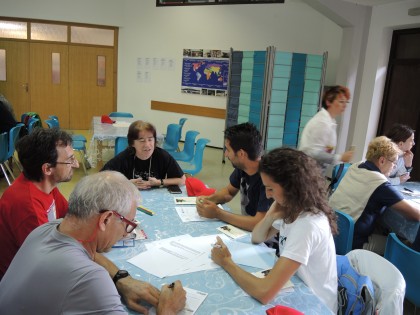
Aug 30, 2016 | Focolare Worldwide
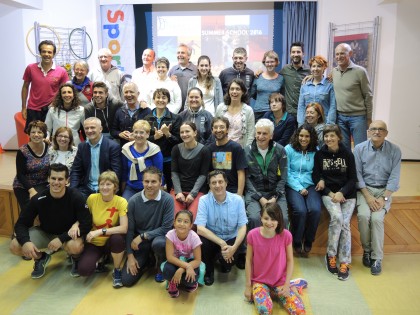 “Sport and Nature” was the title chosen for the 2016 Summer School organized by Sportmeet which gathered sport players from around the world to reflect on the environmental crisis and the specific contribution that sport could make to developing an authentic ecological conscience. Sport holds a great potential for creating friendship among peoples and with the Creation. It also has important educational value when practiced in the name of altruism and reciprocity. Eighty-three people attended the summer school: players at a variety of levels, ages and disciplines, leaders, physical education teachers and professional trainers, as well as others involved in sport as recreation. Paolo Cipolli, international coordinator of Sportmeet, presented the past and present history of the project. His presented had been preceded by numerous greetings from the public authorities who were present including Vice-Mayor Križevci Tomislav Katanović, Vice-President of the City Councill and ex-federal handball instructor, Ivan Pal, Deputy Minister off Science, Training and Sport, Hrvoje Šlezak from the Swiss Embassy in Croatia, Stefan Estermann, Second Secretary to the Italian Ambassador in Croatia whose greetings were given by Anna Lisa Gasparini and Zdenko Horvat.
“Sport and Nature” was the title chosen for the 2016 Summer School organized by Sportmeet which gathered sport players from around the world to reflect on the environmental crisis and the specific contribution that sport could make to developing an authentic ecological conscience. Sport holds a great potential for creating friendship among peoples and with the Creation. It also has important educational value when practiced in the name of altruism and reciprocity. Eighty-three people attended the summer school: players at a variety of levels, ages and disciplines, leaders, physical education teachers and professional trainers, as well as others involved in sport as recreation. Paolo Cipolli, international coordinator of Sportmeet, presented the past and present history of the project. His presented had been preceded by numerous greetings from the public authorities who were present including Vice-Mayor Križevci Tomislav Katanović, Vice-President of the City Councill and ex-federal handball instructor, Ivan Pal, Deputy Minister off Science, Training and Sport, Hrvoje Šlezak from the Swiss Embassy in Croatia, Stefan Estermann, Second Secretary to the Italian Ambassador in Croatia whose greetings were given by Anna Lisa Gasparini and Zdenko Horvat.  During the three-day course experts and instructors offered their reflections on the theme: “Sport and Nature: A Discovery, Resource and Challenge”. Andrea Ceciliani from the University of Bologna offered an exciting hand-on workshop. Mirna Andrijasević from Zagabria University presented “Sport in Nature: A Lifestyle.” Ivan Prskalo from Zagabria University presented Ecology and Chinesiology in Križevci presented an entertaining hands-on workshop on traditional Croatian games. Andrea Ceciliani from University of Bologna presented “Outdoor Education” showing how to hold school in the open, which was accompanied by a lively hands-on workshop. There were also school trips to Mount Kalnik and to Lake Čabraj along with an evening for sharing best practices with the Sportmeet Network, which included a telephone link-up with Rio de Janeiro and Belgrade. The last day began with a video conference that had been held by Focolare foundress Chiara Lubich at the United Nations in 1986 on the theme of Fraternity Among People and Nations. This was followed by a long and lively discussion with all the participants, and it helped design the plans for the upcoming Summer School in Barcelona, Spain, June 2017. Source: Sportmeet online
During the three-day course experts and instructors offered their reflections on the theme: “Sport and Nature: A Discovery, Resource and Challenge”. Andrea Ceciliani from the University of Bologna offered an exciting hand-on workshop. Mirna Andrijasević from Zagabria University presented “Sport in Nature: A Lifestyle.” Ivan Prskalo from Zagabria University presented Ecology and Chinesiology in Križevci presented an entertaining hands-on workshop on traditional Croatian games. Andrea Ceciliani from University of Bologna presented “Outdoor Education” showing how to hold school in the open, which was accompanied by a lively hands-on workshop. There were also school trips to Mount Kalnik and to Lake Čabraj along with an evening for sharing best practices with the Sportmeet Network, which included a telephone link-up with Rio de Janeiro and Belgrade. The last day began with a video conference that had been held by Focolare foundress Chiara Lubich at the United Nations in 1986 on the theme of Fraternity Among People and Nations. This was followed by a long and lively discussion with all the participants, and it helped design the plans for the upcoming Summer School in Barcelona, Spain, June 2017. Source: Sportmeet online
See also: Sportmeet in the Balkans: When Sports Unites
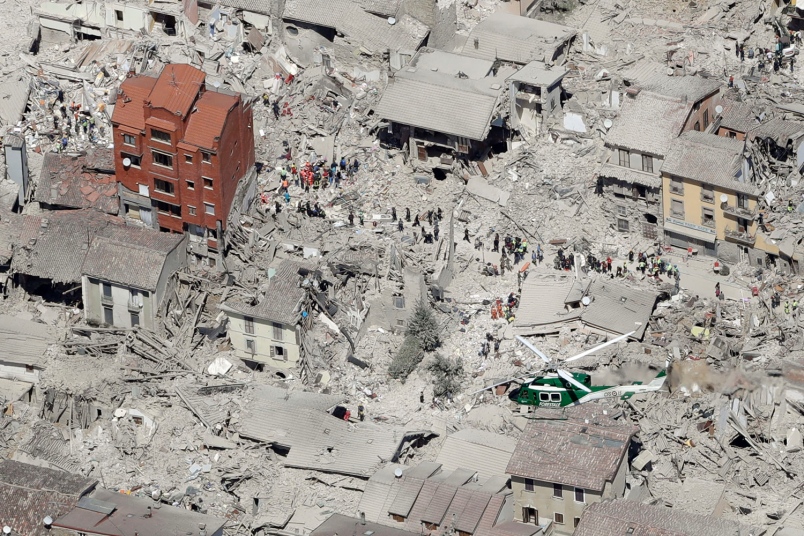
Aug 29, 2016 | Non categorizzato
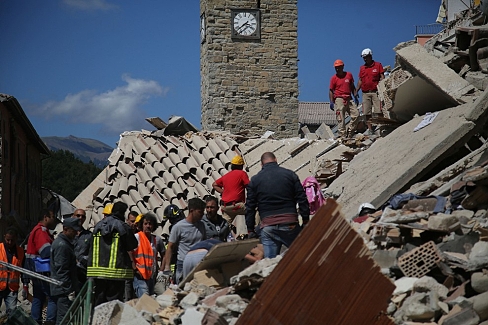 That clock tower on Amatrice church indicating 3:36 am is a powerful image for what happened this night. That minute was the last minute for many victims, it will be a minute forever remembered because it is written in the flesh and hearts of their families. And it will be remembered by our country, whose recent history is also a series of clocks stopped forever by the violence of men and of the earth. I will also remember it forever, because this cry of the earth also reached the house of my parents in Roccafluvione, around twenty kilometres from Arquata del Tronto, where I am visiting them. It was a long night of fear, suffering and thoughts for Amatrice, Arquata, Accumuli, towns of my childhood, close to where my grandparents come from, villages where I would accompany my father as he went about his business selling chickens. And then there were thoughts, thoughts we never have, because you can only have them on these terrible nights. I thought about all the time that clock had measured right up until 3.36. It stopped there, dead, but it was only one dimension of time which the Greeks called ‘kronos’: the surface, the soil of time. In the world there is our managed time, domesticated, constructed, which live by. But beneath it there is a another time: the time of the earth. This non-human time, and at times inhuman, and commands the time of men, mothers and children. And I thought that we are not the masters of this other time, which is deeper, abysmal, primitive, which doesn’t follow our path, and at times is against the paths of those who walk above. On such momentous nights we become aware of this different time, on which we walk and build our homes, and that we are ‘grass of the field’, watered and nourished by the sky, but also swallowed up by the earth.
That clock tower on Amatrice church indicating 3:36 am is a powerful image for what happened this night. That minute was the last minute for many victims, it will be a minute forever remembered because it is written in the flesh and hearts of their families. And it will be remembered by our country, whose recent history is also a series of clocks stopped forever by the violence of men and of the earth. I will also remember it forever, because this cry of the earth also reached the house of my parents in Roccafluvione, around twenty kilometres from Arquata del Tronto, where I am visiting them. It was a long night of fear, suffering and thoughts for Amatrice, Arquata, Accumuli, towns of my childhood, close to where my grandparents come from, villages where I would accompany my father as he went about his business selling chickens. And then there were thoughts, thoughts we never have, because you can only have them on these terrible nights. I thought about all the time that clock had measured right up until 3.36. It stopped there, dead, but it was only one dimension of time which the Greeks called ‘kronos’: the surface, the soil of time. In the world there is our managed time, domesticated, constructed, which live by. But beneath it there is a another time: the time of the earth. This non-human time, and at times inhuman, and commands the time of men, mothers and children. And I thought that we are not the masters of this other time, which is deeper, abysmal, primitive, which doesn’t follow our path, and at times is against the paths of those who walk above. On such momentous nights we become aware of this different time, on which we walk and build our homes, and that we are ‘grass of the field’, watered and nourished by the sky, but also swallowed up by the earth.  The earth, the real one and not the romantic and naive one of ideologies, is both mother and stepmother. The hummus generates man but also turns him back into dust, sometimes in a good way at the right time, but other times it is bad, and too soon, with a so much suffering. Biblical humanism knows this very well, but for this has fought a lot with the pagan cults of local peoples who wanted to make a divinity of the earth and its nature: the power of the earth has always fascinated men who have tried to ‘buy’ it with magic and sacrifices. Whilst I tried in vain to go back to sleep, I thought about the tremendous books of Job and Qohelet, which you can understand on such nights. Those books tell us that no God, not even the real one, can control the earth, because He too, once he entered into human history, became a victim of the mysterious freedom of his creation. God cannot even explain to us why children die squashed beneath the ancient pillars of our towns. He can’t explain it to us because if he knew why he would be a monstrous idol. God, who today looks on the land of the three As – Arquata, Accumuli and Amatrice – can only ask himself the same questions as us: he can cry out, remain silent, cry together with us. He can perhaps remind us with the words of the Bible that all is vanity of vanities: everything is breath, wind, mist, waste, nothing, ephemeral. Vanity in Hebrew is written Habel, the same word as Abel, the brother killed by Kane. Everything is vanity, everything is an infinite Abel: the world is full of victims. This we know. We know it, we forget it too often. These terrible nights and days make us remember. * 1 Kings 19:11
The earth, the real one and not the romantic and naive one of ideologies, is both mother and stepmother. The hummus generates man but also turns him back into dust, sometimes in a good way at the right time, but other times it is bad, and too soon, with a so much suffering. Biblical humanism knows this very well, but for this has fought a lot with the pagan cults of local peoples who wanted to make a divinity of the earth and its nature: the power of the earth has always fascinated men who have tried to ‘buy’ it with magic and sacrifices. Whilst I tried in vain to go back to sleep, I thought about the tremendous books of Job and Qohelet, which you can understand on such nights. Those books tell us that no God, not even the real one, can control the earth, because He too, once he entered into human history, became a victim of the mysterious freedom of his creation. God cannot even explain to us why children die squashed beneath the ancient pillars of our towns. He can’t explain it to us because if he knew why he would be a monstrous idol. God, who today looks on the land of the three As – Arquata, Accumuli and Amatrice – can only ask himself the same questions as us: he can cry out, remain silent, cry together with us. He can perhaps remind us with the words of the Bible that all is vanity of vanities: everything is breath, wind, mist, waste, nothing, ephemeral. Vanity in Hebrew is written Habel, the same word as Abel, the brother killed by Kane. Everything is vanity, everything is an infinite Abel: the world is full of victims. This we know. We know it, we forget it too often. These terrible nights and days make us remember. * 1 Kings 19:11
Aug 28, 2016 | Non categorizzato, Word of
We can bring all things as a gift to God, if we learn how to rejoice with those who rejoice and to weep with those who weep, transforming each pain into love. The setting of these words is the Christian community in Corinth. It was extremely lively, full of initiative, animated by groups linked to different charismatic leaders. This also gave rise to tensions among individuals and groups, to divisions, personality cults, the desire to dominate. Paul intervened decisively and reminded everyone that, in the richness and variety of gifts and leaders belonging to the community, something much deeper bound them in unity: belonging to God. Once more the great Christian proclamation rings out: God is with us, and we are not lost, orphaned, abandoned to ourselves, but, as God’s children, we are God’s. As a true Father God cares for each one, without letting us lack anything we need for our good. Indeed, God is superabundant in love and in giving, as Paul affirms: ‘The world, life, death, the present, the future—all belong to you!’ God has even given us his Son, Jesus. What huge trust on God’s part in giving each thing into our hands! How often instead have we abused his gifts! We have believed ourselves to be the lords of creation to the point of plundering and despoiling it, lords of our brothers and sisters to the point of enslaving and slaughtering them, lords of our own lives to the point of wasting them in narcissism and self- destruction. God’s huge gift – ‘All belong to you’ – asks for gratitude. Often we complain about what we don’t have and we only turn to God to ask. Why don’t we look around and discover the beauty and the goodness surrounding us? Why don’t we say thank you to God for what he gives us each day? This ‘All belong to you’ is also a responsibility. It demands our attention, our tenderness, our care for all that has been entrusted to us: the whole world and every human being, the same care that Jesus has for us (‘you belong to Christ’), the same care that the Father has for Jesus (‘Christ belongs to God’). We ought to know how to rejoice with those who rejoice and to weep with those who weep, ready to gather up every groan, division, pain, violence, as something that belongs to us, so as to share it, to the point of transforming it into love. Everything has been given to us so that we bring it to Christ, that is, to the fullness of life, and to God, that is, to its final goal, giving back the dignity and the deepest meaning that belong to each thing and to each person. One day in the summer of 1949, Chiara Lubich sensed such a unity with Christ that she felt bound to him as a bride to her Spouse. This led her to think of the dowry she would bring, and she understood that it should be the whole of creation! On his side, he would bring her as his inheritance the whole of Paradise. She remembered then the words of the psalm: ‘Ask of me, and I will make the nations your heritage, and the ends of the earth your possession.’ (Ps 2:8) And she commented: ‘And we believed and we asked and He gave us all things that we may bring them to Him and He will give us Heaven: we the created, He the Uncreated.’ Towards the end of her life, speaking of the Movement to which she had given life and in which she saw herself reflected, Chiara Lubich wrote: ‘What, just now, would be my last wish? I wish that the Work of Mary [that is, the Focolare Movement], at the end of the ages, when it will be waiting, united, to appear before Jesus forsaken and risen, may be able to repeat to him, making its own the words of the Belgian theologian Jacques Leclercq, words I always find moving: “On your day, my God, I shall come to you…. I shall come to you, my God … with my wildest dream: to bring you the world in my arms.” ’1 Fabio Ciardi 1 Essential Writings, (London and New York: New City and New City Press, 2007), p. 369.
American English version of the Word of Life
Subscribe to the monthly Word of Life in English

Aug 28, 2016 | Non categorizzato
 “While taking a short break, contemplating the immensity of the universe, the extraordinary beauty and power of nature, my mind rose spontaneously to the Creator of it all, to a new sort of understanding of God’s immensity. (…) I saw that he is so great, so great, so great that it seemed impossible he should think of us. This impression of God’s immensity stayed with me for several days. To pray, ‘Hallowed be thy name’, or ‘Glory be to the Father and to the Son and to the Holy Spirit’, is different for me now: it has become a need of the heart. … We are on a journey. When people travel, they are already thinking about the surroundings they will be in on their arrival, the landscape, the city; they are getting ready. We should do the same. Will we praise God up there? Then let’s start praising him right now, letting our hearts cry out to him with all our love… Let’s praise him with words and in our hearts. We can take this opportunity to enliven some of the prayers we say daily which have this purpose. Let’s glorify him also with our whole being. As we know, the more we become nothing (modelling ourselves on Jesus Forsaken, who reduced himself to nothing) the more we cry out with our lives that God is everything, and so we praise him, we glorify him and adore him. During the day let’s find many opportunities to adore God and praise him. Let’s do so during our meditation, or when visiting a church, or at Mass. Let’s praise him beyond nature or in the depths of our hearts. Above all, let’s live dead to ourselves and alive to the will of God, to love for our brothers and sisters. May we too be, as Elizabeth of the Trinity used to say, a living praise of his Glory. In this way we shall experience a bit of paradise, and make up for the indifference to God in many hearts living in the world today.”
“While taking a short break, contemplating the immensity of the universe, the extraordinary beauty and power of nature, my mind rose spontaneously to the Creator of it all, to a new sort of understanding of God’s immensity. (…) I saw that he is so great, so great, so great that it seemed impossible he should think of us. This impression of God’s immensity stayed with me for several days. To pray, ‘Hallowed be thy name’, or ‘Glory be to the Father and to the Son and to the Holy Spirit’, is different for me now: it has become a need of the heart. … We are on a journey. When people travel, they are already thinking about the surroundings they will be in on their arrival, the landscape, the city; they are getting ready. We should do the same. Will we praise God up there? Then let’s start praising him right now, letting our hearts cry out to him with all our love… Let’s praise him with words and in our hearts. We can take this opportunity to enliven some of the prayers we say daily which have this purpose. Let’s glorify him also with our whole being. As we know, the more we become nothing (modelling ourselves on Jesus Forsaken, who reduced himself to nothing) the more we cry out with our lives that God is everything, and so we praise him, we glorify him and adore him. During the day let’s find many opportunities to adore God and praise him. Let’s do so during our meditation, or when visiting a church, or at Mass. Let’s praise him beyond nature or in the depths of our hearts. Above all, let’s live dead to ourselves and alive to the will of God, to love for our brothers and sisters. May we too be, as Elizabeth of the Trinity used to say, a living praise of his Glory. In this way we shall experience a bit of paradise, and make up for the indifference to God in many hearts living in the world today.”
Chiara Lubich
(Chiara Lubich, Cercando le cose di lassù, Roma 1992, p. 15-17)
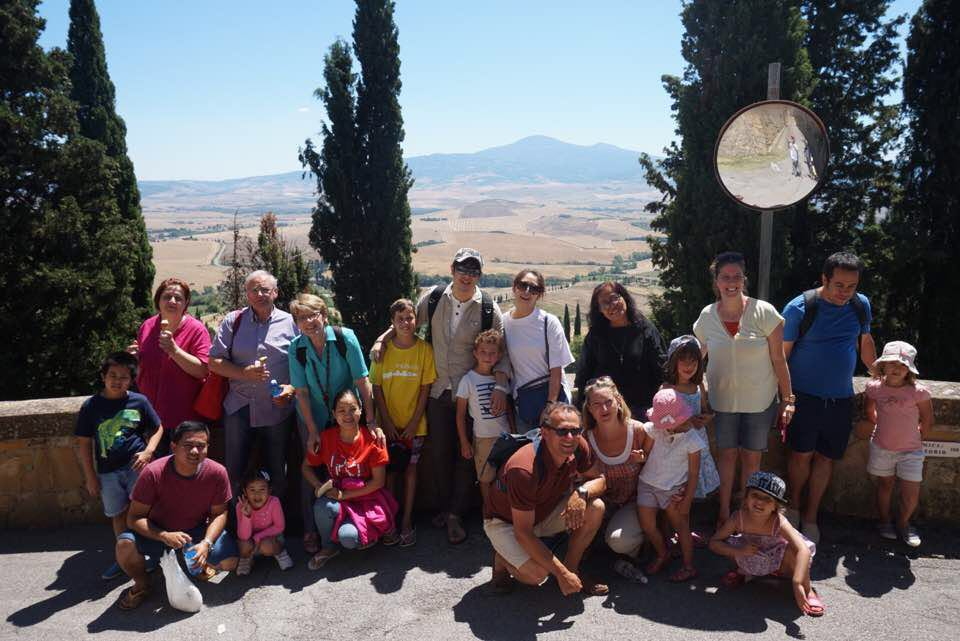
Aug 27, 2016 | Focolare Worldwide
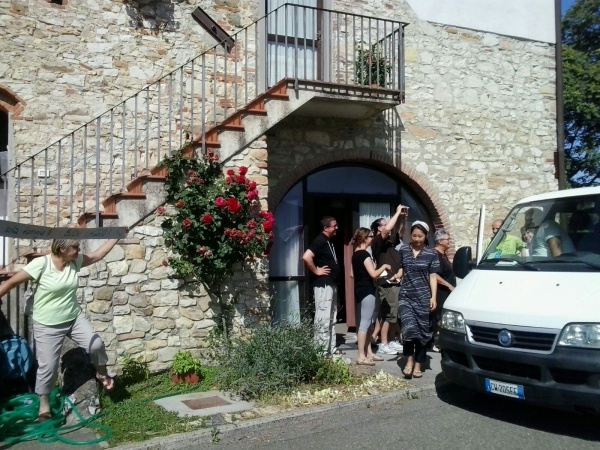 Another year at Loreto School has come to an end and the families have returned to their homes in Brazil, Cameroon and the Czech Republic enriched by a gift that will never be wiped away but shared with the world around them. That doesn’t mean that Loreto School is now on vacation: it continues through the summer months. In the month of July there was series of families that showed up from several regions of Italy, Europe and other countries like Korea, Vietnam and Philippines for a period of vacation in the spirit of the Focolare. They lived and experienced the communion of goods. One donated a new lawn mower, which was useful in trimming the green areas around the lodgings. Another donated an electric sander that was used to brighten up the framing, doors and benches. . .
Another year at Loreto School has come to an end and the families have returned to their homes in Brazil, Cameroon and the Czech Republic enriched by a gift that will never be wiped away but shared with the world around them. That doesn’t mean that Loreto School is now on vacation: it continues through the summer months. In the month of July there was series of families that showed up from several regions of Italy, Europe and other countries like Korea, Vietnam and Philippines for a period of vacation in the spirit of the Focolare. They lived and experienced the communion of goods. One donated a new lawn mower, which was useful in trimming the green areas around the lodgings. Another donated an electric sander that was used to brighten up the framing, doors and benches. . .  Working together to fix up the flats, welcome the families, cut the grass and prune the trees, created an atmosphere of communion, lightened the work and created a sense of joy. People passing through Loppiano also got to shared in that family atmosphere and wanted to learn more about Loreto School and the New Families Movement. There were also opportunities for couples to discuss family issues in a relaxed setting with the help of experts, and the opportunity to take part in events at the permanent Mariapolis. There were many meals in the open air, field trips, moments for relaxation together – all in an atmosphere of evangelical brotherhood which is the law of Loppiano where Loreto School is located. One family from France was there on July 14th in Nice, the day of the terrible massacre along the sea, but they had fortunately decided to watch the fireworks on a hill overlooking the city. This experience taught them that life is a gift, and they felt called to spend the rest of their lives together spreading love to others. When it came time to leave Loppiano, the families, one by one, expressed their wish to return for the same experience next year, saying that despite the hard work they felt completely restored!
Working together to fix up the flats, welcome the families, cut the grass and prune the trees, created an atmosphere of communion, lightened the work and created a sense of joy. People passing through Loppiano also got to shared in that family atmosphere and wanted to learn more about Loreto School and the New Families Movement. There were also opportunities for couples to discuss family issues in a relaxed setting with the help of experts, and the opportunity to take part in events at the permanent Mariapolis. There were many meals in the open air, field trips, moments for relaxation together – all in an atmosphere of evangelical brotherhood which is the law of Loppiano where Loreto School is located. One family from France was there on July 14th in Nice, the day of the terrible massacre along the sea, but they had fortunately decided to watch the fireworks on a hill overlooking the city. This experience taught them that life is a gift, and they felt called to spend the rest of their lives together spreading love to others. When it came time to leave Loppiano, the families, one by one, expressed their wish to return for the same experience next year, saying that despite the hard work they felt completely restored!

Aug 26, 2016 | Non categorizzato
 Student accommodation “I live with six other students in a rented flat. We divided the chores and cleaning shifts,but Franz was not helping out and thus created tension in the group. I tried in vain to remind him. One day, precisely his family was coming to visit, and as an act of love for them, I started cleaning the bathrooms and also Franz’s room. His parents and sister were so pleased with the order they found that before leaving, they went to shop for loads of food that filled the fridge. Since then Franz has become very thoughtful and caring towards others. (F.F. – Austria) The poor helping the poor “That couple was extremely poor and ashamed of it, and their worries reached a peak with the arrival of their first son. The love of other friends warmed their hearts. Struck by the story of an equally poor family, but that believed that God who is a Father never abandons his children, they thought of sharing some of their food with another poor family. And the next day to their surprise, they saw all sorts of foodstuff arriving at their doorstep. In addition, there were also the things their son needed, a cradle, baby clothes, bathtub….…” (J.E. – Brazil)
Student accommodation “I live with six other students in a rented flat. We divided the chores and cleaning shifts,but Franz was not helping out and thus created tension in the group. I tried in vain to remind him. One day, precisely his family was coming to visit, and as an act of love for them, I started cleaning the bathrooms and also Franz’s room. His parents and sister were so pleased with the order they found that before leaving, they went to shop for loads of food that filled the fridge. Since then Franz has become very thoughtful and caring towards others. (F.F. – Austria) The poor helping the poor “That couple was extremely poor and ashamed of it, and their worries reached a peak with the arrival of their first son. The love of other friends warmed their hearts. Struck by the story of an equally poor family, but that believed that God who is a Father never abandons his children, they thought of sharing some of their food with another poor family. And the next day to their surprise, they saw all sorts of foodstuff arriving at their doorstep. In addition, there were also the things their son needed, a cradle, baby clothes, bathtub….…” (J.E. – Brazil)  Praying for rain “That evening I felt very tired and wanted to tell the kids to say their night prayers by themselves in the room so I could immediately go to bed. But John, our eldest, asked if we could say the rosary to pray for rain: in fact, it hadn’t rained for a long time and the corn and sweet potatoes we had planted really needed it. To our surprise, that same night it started to rain and continued up to the afternoon of the next day.” (B. M. – Uganda) The armchairs “In our place, most parents incur so many debts for the weddings of their daughters and consequently have to work all their lives to paythem. For my wedding I made my parents spend as little as possible, confiding in Divine Providence. One day I went with my mom to the furniture shop. At the end he said,«Usually the other girls are never satisfied with what they find… but you are different. I would like to ask you to pray for my son who is very sick.». I assured him that I would do so, and he gave me two armchairs as a wedding gift: it was exactly what I needed.” (C. J. – Pakistan).
Praying for rain “That evening I felt very tired and wanted to tell the kids to say their night prayers by themselves in the room so I could immediately go to bed. But John, our eldest, asked if we could say the rosary to pray for rain: in fact, it hadn’t rained for a long time and the corn and sweet potatoes we had planted really needed it. To our surprise, that same night it started to rain and continued up to the afternoon of the next day.” (B. M. – Uganda) The armchairs “In our place, most parents incur so many debts for the weddings of their daughters and consequently have to work all their lives to paythem. For my wedding I made my parents spend as little as possible, confiding in Divine Providence. One day I went with my mom to the furniture shop. At the end he said,«Usually the other girls are never satisfied with what they find… but you are different. I would like to ask you to pray for my son who is very sick.». I assured him that I would do so, and he gave me two armchairs as a wedding gift: it was exactly what I needed.” (C. J. – Pakistan).
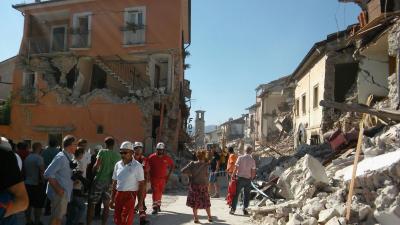
Aug 25, 2016 | Focolare Worldwide, Senza categoria
 “It’s the day after the earthquake that shook central Italy. As we write, the number of victims has reached 247 people and is rising. Many were children because they are often left with their grandparents during the summer months in Amatrice, Accumoli, Arquata and Pescara Tonto. More than 4,000 people have had to leave their homes in the two regions most damaged by the quake: Lazio and Marche. The aftershocks never end.” “The real face of this growing tragedy is the generosity of the many volunteers that arrived on the scene immediately and in great numbers, working non-stop at digging, first with their bare hands, then with buckets and finally with more sophisticated equipment. The willingness of the local people was also immediate providing basic needs, standing in lines for hours at the hospital to donate blood and to sleeping in tents in order to continue offering help and comfort.” “Ever since yesterday at 3:30 when we were awakened by the first shock, we have been directly following events in constant contact with the many people of the Movement that live in these regions. We were glad to hear about the Gen and his grandfather who were removed alive from the rubble; also the father-in-law and sister-in-law of a married focolarina. We were holding our breath all day long wondering about Rita, her niece and nephew – fourteen year old Elisa, twelve year old Gabriele and their grandmother who were still buried in the rubble. In the evening we received a message from their mother: “They all went to Jesus.” Other members of the Movement who were vacationing in Amatrice managed to reach safety.” “For all of us it was an opportunity to pull together in unity and live for others. From Umbria they write: “Thank you for your prayers and unity that have spread like a chain through the whole Movement in Umbria and supported us during this night of fear and trembling. Hearing that we were all alive made us thank God, and then our thoughts went to the ones who were still trapped beneath the rubble and to those who had lost everything. The fact of going online supported us and allowed us to follow events in the worst areas in real time. Elisabetta from Assisi told us that our message arrived at precisely the worst moment and brought her peace. We feel like a family more than ever. The Gen are online ready to offer support and are in the process of going into the worst hit cities to offer help. The adults are also willing to get involved concretely. Meanwhile, we promise to pray for those families that have suffered great loss.” “Right away messages were being sent out that told of the needs and the possibilities of assistance, primarily with the help of the Civil Protection and others. In Ascoli where we work alongside other associations, we began a clothing drive. The same was true in Lazio where the people from Abruzzese who are experts after the earthquake of Aquila (2009), mapped out lodging sites for the evacuees. Other regions have also offered lodging.” “We continue to stay connected with everyone and gradually understand how we can concretely respond to all this suffering in which we see the “face” of Jesus Forsaken.”
“It’s the day after the earthquake that shook central Italy. As we write, the number of victims has reached 247 people and is rising. Many were children because they are often left with their grandparents during the summer months in Amatrice, Accumoli, Arquata and Pescara Tonto. More than 4,000 people have had to leave their homes in the two regions most damaged by the quake: Lazio and Marche. The aftershocks never end.” “The real face of this growing tragedy is the generosity of the many volunteers that arrived on the scene immediately and in great numbers, working non-stop at digging, first with their bare hands, then with buckets and finally with more sophisticated equipment. The willingness of the local people was also immediate providing basic needs, standing in lines for hours at the hospital to donate blood and to sleeping in tents in order to continue offering help and comfort.” “Ever since yesterday at 3:30 when we were awakened by the first shock, we have been directly following events in constant contact with the many people of the Movement that live in these regions. We were glad to hear about the Gen and his grandfather who were removed alive from the rubble; also the father-in-law and sister-in-law of a married focolarina. We were holding our breath all day long wondering about Rita, her niece and nephew – fourteen year old Elisa, twelve year old Gabriele and their grandmother who were still buried in the rubble. In the evening we received a message from their mother: “They all went to Jesus.” Other members of the Movement who were vacationing in Amatrice managed to reach safety.” “For all of us it was an opportunity to pull together in unity and live for others. From Umbria they write: “Thank you for your prayers and unity that have spread like a chain through the whole Movement in Umbria and supported us during this night of fear and trembling. Hearing that we were all alive made us thank God, and then our thoughts went to the ones who were still trapped beneath the rubble and to those who had lost everything. The fact of going online supported us and allowed us to follow events in the worst areas in real time. Elisabetta from Assisi told us that our message arrived at precisely the worst moment and brought her peace. We feel like a family more than ever. The Gen are online ready to offer support and are in the process of going into the worst hit cities to offer help. The adults are also willing to get involved concretely. Meanwhile, we promise to pray for those families that have suffered great loss.” “Right away messages were being sent out that told of the needs and the possibilities of assistance, primarily with the help of the Civil Protection and others. In Ascoli where we work alongside other associations, we began a clothing drive. The same was true in Lazio where the people from Abruzzese who are experts after the earthquake of Aquila (2009), mapped out lodging sites for the evacuees. Other regions have also offered lodging.” “We continue to stay connected with everyone and gradually understand how we can concretely respond to all this suffering in which we see the “face” of Jesus Forsaken.”
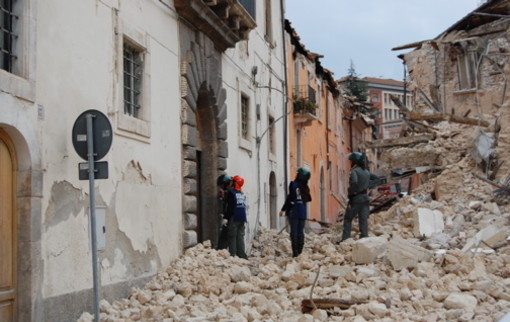
Aug 24, 2016 | Focolare Worldwide
 Messages have been pouring in at the website following the earthquake near Amatrice and Norcia, between the provinces of Rieti and Ascoli Piceno in central Italy. Some tell about extracting a grandfather from the rubble safe and sound; others about rushing a cousin to hospital where they are still waiting. Some express their deep distress over what has happened, while others are trying to help or at least be close to friends and acquaintances who have suffered damage and casualties.” So writes the editor of Città Nuova, the Focolare’s press office in Italy, about the strong 6.0 magnitude earthquake that occurred between the villages of Norcia and Amatrice. The Focolare Movement worldwide expresses its closeness to the populations that were hit by the earthquake in central Italy and offers prayers for the victims, their families and everyone who has suffered material or moral harm. Some Focolare members are all ready at the scene working together with many other volunteers in the arduous task of rescuing people from the ruins and trying to comfort those who have lost loved ones. Coordinated assistance has begun and contributions can be made to the following accounts: CAUSE: Emergenza Terremoto Italia
Messages have been pouring in at the website following the earthquake near Amatrice and Norcia, between the provinces of Rieti and Ascoli Piceno in central Italy. Some tell about extracting a grandfather from the rubble safe and sound; others about rushing a cousin to hospital where they are still waiting. Some express their deep distress over what has happened, while others are trying to help or at least be close to friends and acquaintances who have suffered damage and casualties.” So writes the editor of Città Nuova, the Focolare’s press office in Italy, about the strong 6.0 magnitude earthquake that occurred between the villages of Norcia and Amatrice. The Focolare Movement worldwide expresses its closeness to the populations that were hit by the earthquake in central Italy and offers prayers for the victims, their families and everyone who has suffered material or moral harm. Some Focolare members are all ready at the scene working together with many other volunteers in the arduous task of rescuing people from the ruins and trying to comfort those who have lost loved ones. Coordinated assistance has begun and contributions can be made to the following accounts: CAUSE: Emergenza Terremoto Italia
| Azione per un Mondo Unito ONLUS (AMU) |
Azione per Famiglie Nuove ONLUS (AFN) |
| IBAN: IT16 G050 1803 2000 0000 0120 434 at Banca Popolare Etica |
IBAN: IT55 K033 5901 6001 0000 0001 060 at Banca Prossima |
| Code SWIFT/BIC: CCRTIT2184D |
Code SWIFT/BIC: BCITITMX |
Contributions made to either of these accounts for the earthquake emergency cause will be jointly administrated by the Focolare’s Action for a United World (AMU) and New Families Association (AFN). There are tax benefits attached to such contributions in many countries of the European Union and in other countries.
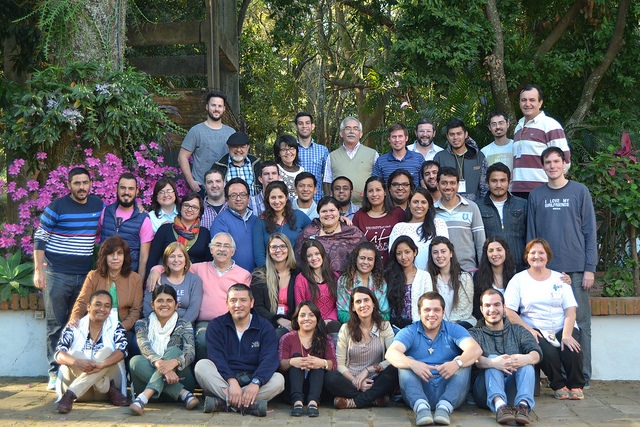
Aug 24, 2016 | Focolare Worldwide
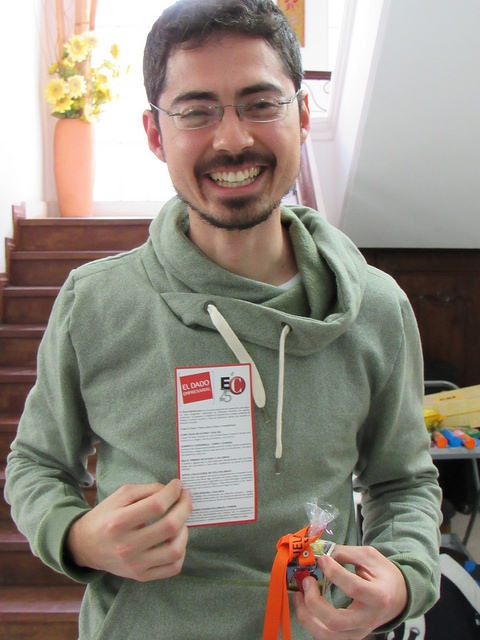 To hear them talk they sound like small heroes, but they don’t feel that they are. They simply believe they are doing the right thing. We not only refer to the established business people from the Economy of Communion (EoC), but also the 30 young aspirants who jumped body and soul into a 5-day adventure of sharing. Thanks to the EoC, Xandra managed to overcome the difficult period her family was going through when she was a teenager, and now she is the one hiring a pair of teenagers in her own beauty salon where she tries to build relationships of reciprocity with customers, suppliers and the society around her. Dalila had to close her business but then was able to get back on her feet and start over again. She swears that despite the crisis in Brazil she isn’t experiencing any of its effects. She says that this is because of the “secret partner” which is how the EoC refers to God’s providential intervention.
To hear them talk they sound like small heroes, but they don’t feel that they are. They simply believe they are doing the right thing. We not only refer to the established business people from the Economy of Communion (EoC), but also the 30 young aspirants who jumped body and soul into a 5-day adventure of sharing. Thanks to the EoC, Xandra managed to overcome the difficult period her family was going through when she was a teenager, and now she is the one hiring a pair of teenagers in her own beauty salon where she tries to build relationships of reciprocity with customers, suppliers and the society around her. Dalila had to close her business but then was able to get back on her feet and start over again. She swears that despite the crisis in Brazil she isn’t experiencing any of its effects. She says that this is because of the “secret partner” which is how the EoC refers to God’s providential intervention. 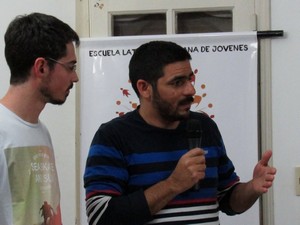 It is a requirement in a summer school for business owners to talk about their failures and learn from each other, especially since the values of the EoC are not often understood by people outside that world. This was the case with Germán e Matías whose projects were ruined and earnings lost because of dishonest partners. The programme that was largely comprised of question-and-answer sessions offered a presentation of the EoC that highlighted the cultural novelty of the project, given by philosopher Cecilia Blanco; the secret of how to overcome difficulties “without fleeing from problems” by building contractor Raúl Di Lascio; a proposal on how to distribute profits and have the foresight to avoid creating dependency in the people that receive assistance; knowing how to distinguish between healthy ambition and status and being well-off.
It is a requirement in a summer school for business owners to talk about their failures and learn from each other, especially since the values of the EoC are not often understood by people outside that world. This was the case with Germán e Matías whose projects were ruined and earnings lost because of dishonest partners. The programme that was largely comprised of question-and-answer sessions offered a presentation of the EoC that highlighted the cultural novelty of the project, given by philosopher Cecilia Blanco; the secret of how to overcome difficulties “without fleeing from problems” by building contractor Raúl Di Lascio; a proposal on how to distribute profits and have the foresight to avoid creating dependency in the people that receive assistance; knowing how to distinguish between healthy ambition and status and being well-off. 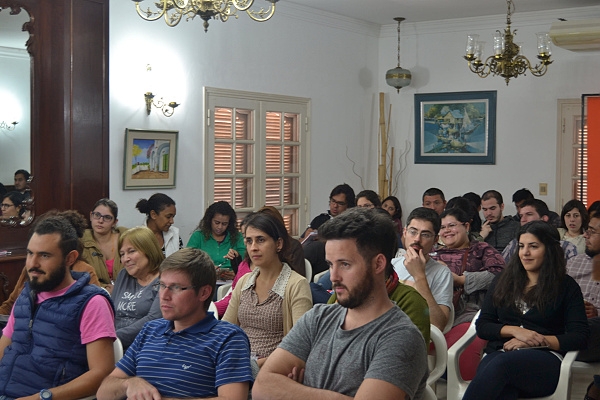 Yamil from Mexico explained the way he managed to involve thirty business owners, young like himself, in promoting interaction. The university noticed that their projects were serious and provided them with resources and know-how. Their “active networking” project that includes fortnightly meetings where personal knowledge can be shared that provide interesting topics for discussion is being welcomed with enthusiasm and results precisely because of the way it creates commercial and operative synergies. Luis Alonso from Mexico presented the new EoC-IIN Economy of Communion International Incubating Network.
Yamil from Mexico explained the way he managed to involve thirty business owners, young like himself, in promoting interaction. The university noticed that their projects were serious and provided them with resources and know-how. Their “active networking” project that includes fortnightly meetings where personal knowledge can be shared that provide interesting topics for discussion is being welcomed with enthusiasm and results precisely because of the way it creates commercial and operative synergies. Luis Alonso from Mexico presented the new EoC-IIN Economy of Communion International Incubating Network.  The “school trip” included a visit to the San Miguel di Capiatà quarter’s Focolare social project, the EoC’s Dispensa Santa Rita and Todo Brillo businesses. All were quite impressed by the children from the Unipar School of San Miguel who seemed to shine with the love they learn (and teach!) using the Dice of Love, and by the young and old people in that neighbourhood who have become masters of their own destiny thanks to the efficacious efforts at empowerment. Julio and Ninfa run the Dispensa Santa Rita in the popular quarter of Areguá. In order to avoid smuggling they never purchase basic need items in the city of Clorinda on the Argentinean border, but “give up time” arranging local goods in packages that are more appropriately priced for their customers. This made Matías from Paraguay remark: “I understood that the size of a business doesn’t lie in its revenue, but in the values that are lived inside that business.” Uruguayan professor Juan José Medeiros gave a presentation on Wealth and Poverty in the EoC” and Paraguayan historian Diana Durán brought an original touch with her presentation on the similarities between the EoC and the social and economic culture of the Guaraní indigenous people whose lineage can be traced back to the very roots of Paraguay. There was a long and stimulating Skype conversation with Luigi Bruni, Anouk Grevin and Luca Crivelli from the EoC’s Central Commission, and another discussion with Rebeca Gomez Tafalla and Florencia Locascio from EoC-inn which concluded the programme. Upcoming events: September conference in Salta, Argentina; EoC-INN, in Cuba. Source: EoC online
The “school trip” included a visit to the San Miguel di Capiatà quarter’s Focolare social project, the EoC’s Dispensa Santa Rita and Todo Brillo businesses. All were quite impressed by the children from the Unipar School of San Miguel who seemed to shine with the love they learn (and teach!) using the Dice of Love, and by the young and old people in that neighbourhood who have become masters of their own destiny thanks to the efficacious efforts at empowerment. Julio and Ninfa run the Dispensa Santa Rita in the popular quarter of Areguá. In order to avoid smuggling they never purchase basic need items in the city of Clorinda on the Argentinean border, but “give up time” arranging local goods in packages that are more appropriately priced for their customers. This made Matías from Paraguay remark: “I understood that the size of a business doesn’t lie in its revenue, but in the values that are lived inside that business.” Uruguayan professor Juan José Medeiros gave a presentation on Wealth and Poverty in the EoC” and Paraguayan historian Diana Durán brought an original touch with her presentation on the similarities between the EoC and the social and economic culture of the Guaraní indigenous people whose lineage can be traced back to the very roots of Paraguay. There was a long and stimulating Skype conversation with Luigi Bruni, Anouk Grevin and Luca Crivelli from the EoC’s Central Commission, and another discussion with Rebeca Gomez Tafalla and Florencia Locascio from EoC-inn which concluded the programme. Upcoming events: September conference in Salta, Argentina; EoC-INN, in Cuba. Source: EoC online
Photo album
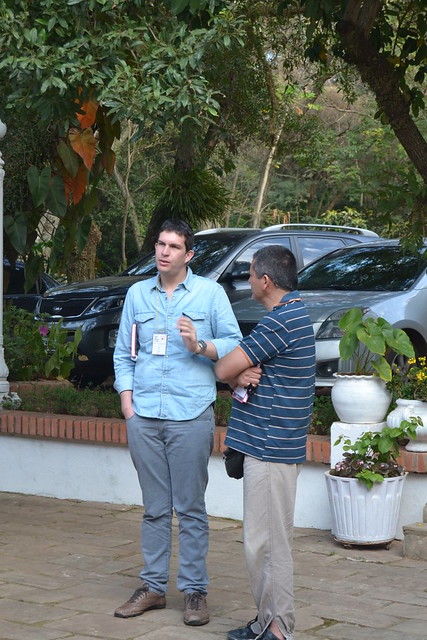
Photo on Flickr
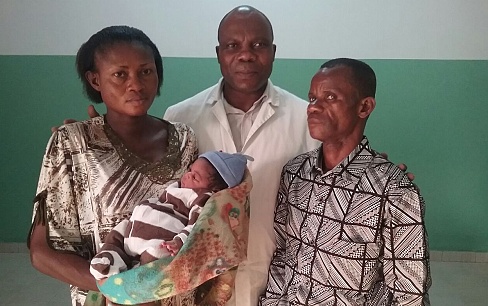
Aug 23, 2016 | Focolare Worldwide
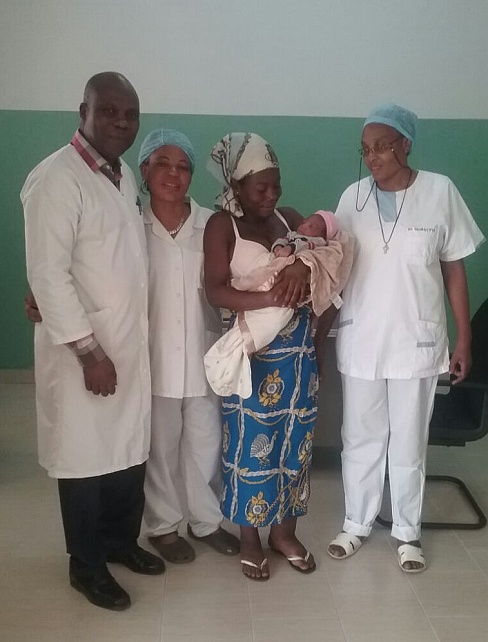 Taking two years to build, with costs that reached €409,559, the new maternity wing of the Medical Centre, “Moyimwa Ntongo” in the Congolese capital was inaugurated precisely on the Centre’s 10th anniversary. The first infant was born last 29 April! It is an essential service, considering that – as the Health Director, Arthur Ngoy affirmed – the mortality rate of infants and mothers in Congo are still very high:”846 maternal deaths over every 100,000 live births” – while the world average is 216 – “and 104 out of 1,000 are the deaths of infants”, one of the highest rates worldwide. “The new department was built through the efforts of several people and agencies related to the Focolare Movement such as the Giancarlo Pallavicini Foundation; Albina Gianotti and Victorina Giussani who have been sponsors of the Medical Centre since the beginning; AMU-Luxembourg and AECOM Congo along with their supporters; many people in Luxembourg, including children who have made and sold small knick-knacks and done odd jobs to earn some money even in winter.” “This medical centre gives us the opportunity to respond concretely to the invitation of the Church in the document, AfricaeMunus (n.140), that urges all the healthcare institutions of the Church and all the people working in these organisations in the most varied roles, to try to see in every patient,a suffering member of the Body of Christ,” affirmed Damien Kasereka, co-director with Ghislaine Kahambu, of the Focolare Movement in Congo.
Taking two years to build, with costs that reached €409,559, the new maternity wing of the Medical Centre, “Moyimwa Ntongo” in the Congolese capital was inaugurated precisely on the Centre’s 10th anniversary. The first infant was born last 29 April! It is an essential service, considering that – as the Health Director, Arthur Ngoy affirmed – the mortality rate of infants and mothers in Congo are still very high:”846 maternal deaths over every 100,000 live births” – while the world average is 216 – “and 104 out of 1,000 are the deaths of infants”, one of the highest rates worldwide. “The new department was built through the efforts of several people and agencies related to the Focolare Movement such as the Giancarlo Pallavicini Foundation; Albina Gianotti and Victorina Giussani who have been sponsors of the Medical Centre since the beginning; AMU-Luxembourg and AECOM Congo along with their supporters; many people in Luxembourg, including children who have made and sold small knick-knacks and done odd jobs to earn some money even in winter.” “This medical centre gives us the opportunity to respond concretely to the invitation of the Church in the document, AfricaeMunus (n.140), that urges all the healthcare institutions of the Church and all the people working in these organisations in the most varied roles, to try to see in every patient,a suffering member of the Body of Christ,” affirmed Damien Kasereka, co-director with Ghislaine Kahambu, of the Focolare Movement in Congo.  “It is a huge satisfaction, “Dr Ngoy commented, “especially for the mothers who had to be transferred to another facility to give birth, after nine months of prenatal checkups in our centre.They felt they were being abandoned just when they most needed us.But it is also because we can respond to the Congolese government’s request to offer complete, continuous and quality treatments. This is why we thank Chiara Lubich who established this centre.” At the inauguration last 9 July,together with the medical team, patients, civil and religious authorities, architect and his team, and journalists, there was also a small delegation from AMU Luxembourg. The thanksgiving mass was celebrated by the auxiliary bishop of Kinshasa, Bishop Bodika, while the ribbon was cut by the Health Minister, Vital Kabuiku, together with the Apostolic Nuncio, Luis Mariano Montemayor, and the auxiliary bishop.
“It is a huge satisfaction, “Dr Ngoy commented, “especially for the mothers who had to be transferred to another facility to give birth, after nine months of prenatal checkups in our centre.They felt they were being abandoned just when they most needed us.But it is also because we can respond to the Congolese government’s request to offer complete, continuous and quality treatments. This is why we thank Chiara Lubich who established this centre.” At the inauguration last 9 July,together with the medical team, patients, civil and religious authorities, architect and his team, and journalists, there was also a small delegation from AMU Luxembourg. The thanksgiving mass was celebrated by the auxiliary bishop of Kinshasa, Bishop Bodika, while the ribbon was cut by the Health Minister, Vital Kabuiku, together with the Apostolic Nuncio, Luis Mariano Montemayor, and the auxiliary bishop.
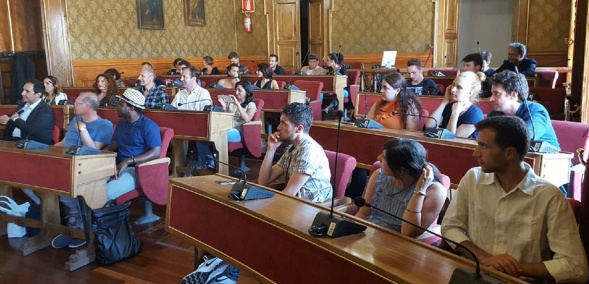
Aug 22, 2016 | Focolare Worldwide
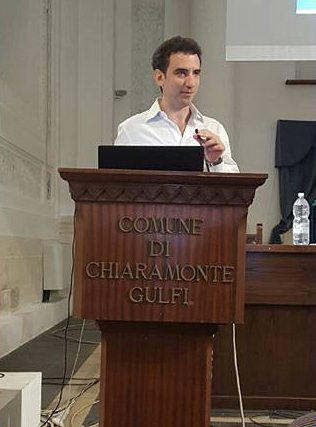 “We live in a world where anxiety and fear are inwardly and also physically destroying us. Let’s try together to bring about a rebirth of goodness and constructive relationships in the pursuit of the common good. I know we’re only like a small drop in the ocean, but just think of a drop of dye when it’s added to a bit of water: the water moves towards the colour of the dye.” This is how Manfred, who attended the Summer School, summarized the event that was organized by Communion and Law in Chiaramonte Gulfi, Italy. Thirty young people from Nigeria, Spain, Germany, Holland and Italy met to discuss: “Law in Europe: Welcome and Rejection: Immigration, Security and Environment”. The final report, which was framed by the university professors and young people themselves, highlighted the deep connection between the lack of protection of the environment that is sometimes the result of “invisible wars” and many armed conflicts – and the subsequent immigrations. Apollos, a Nigerian refugee, brought us into the dramatic experience of being refugees, helping us to make our own their expectations for justice and finding hope for them. The FO.CO. Cooperative that operates in Chiaramonte Gulfi and in other Sicilian cities is one of those roads of hope. Its goal is to obtain diplomas and jobs for refugees, and help them integrate into society. The Chiaramonte experience is bearing fruits in peaceful lives. The dialogue with public institutions was also important. We were received in the Council Chamber of the City of Ragusa where the president of the City Council and some councillors took part in an open discussion with us about the situation of the environment, recycling and citizen involvement in public institutions.
“We live in a world where anxiety and fear are inwardly and also physically destroying us. Let’s try together to bring about a rebirth of goodness and constructive relationships in the pursuit of the common good. I know we’re only like a small drop in the ocean, but just think of a drop of dye when it’s added to a bit of water: the water moves towards the colour of the dye.” This is how Manfred, who attended the Summer School, summarized the event that was organized by Communion and Law in Chiaramonte Gulfi, Italy. Thirty young people from Nigeria, Spain, Germany, Holland and Italy met to discuss: “Law in Europe: Welcome and Rejection: Immigration, Security and Environment”. The final report, which was framed by the university professors and young people themselves, highlighted the deep connection between the lack of protection of the environment that is sometimes the result of “invisible wars” and many armed conflicts – and the subsequent immigrations. Apollos, a Nigerian refugee, brought us into the dramatic experience of being refugees, helping us to make our own their expectations for justice and finding hope for them. The FO.CO. Cooperative that operates in Chiaramonte Gulfi and in other Sicilian cities is one of those roads of hope. Its goal is to obtain diplomas and jobs for refugees, and help them integrate into society. The Chiaramonte experience is bearing fruits in peaceful lives. The dialogue with public institutions was also important. We were received in the Council Chamber of the City of Ragusa where the president of the City Council and some councillors took part in an open discussion with us about the situation of the environment, recycling and citizen involvement in public institutions.  We were struck to hear Pope Francis speak at the WYD about the same topics that we were discussing: the war in Nigeria, the struggle for natural resources; the walls of fear, the need of a new culture, the courage to build bridges beyond our differences and relationships that are respectful of the dignity of every human being. Our own diversity was enriching: not all of us at the school were legal experts, and this allowed for an open and not exclusively technical discussion that was more accessible to the young people. One philosophy teacher remarked: “I think this summer school is a good synthesis, the way it constantly connects theory with daily life. This synergy seems very important in my opinion: theory is useful, but then it needs to be married to daily living.” Christian, the young lawyer and Deputy Mayor whose efforts had largely led to the success of the Summer School, concluded by saying: “It was possible to hold the school here, thanks to the work and precious contribution of many people, and it is something that should continue. It was an experience that went beyond every rosy forecast and that has left a mark: ‘seeds’ of a new culture. This opportunity to meet with other young lawyers was a moving professional experience for me. Their serenity, their sense of duty…. In such a fast-moving world, this is the real challenge: to share ourselves with others.”
We were struck to hear Pope Francis speak at the WYD about the same topics that we were discussing: the war in Nigeria, the struggle for natural resources; the walls of fear, the need of a new culture, the courage to build bridges beyond our differences and relationships that are respectful of the dignity of every human being. Our own diversity was enriching: not all of us at the school were legal experts, and this allowed for an open and not exclusively technical discussion that was more accessible to the young people. One philosophy teacher remarked: “I think this summer school is a good synthesis, the way it constantly connects theory with daily life. This synergy seems very important in my opinion: theory is useful, but then it needs to be married to daily living.” Christian, the young lawyer and Deputy Mayor whose efforts had largely led to the success of the Summer School, concluded by saying: “It was possible to hold the school here, thanks to the work and precious contribution of many people, and it is something that should continue. It was an experience that went beyond every rosy forecast and that has left a mark: ‘seeds’ of a new culture. This opportunity to meet with other young lawyers was a moving professional experience for me. Their serenity, their sense of duty…. In such a fast-moving world, this is the real challenge: to share ourselves with others.”

Aug 20, 2016 | Focolare Worldwide, Senza categoria
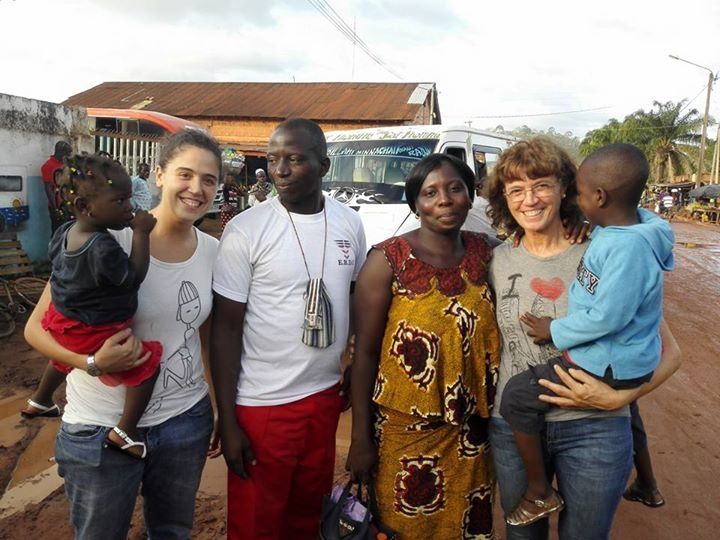 At the beginning of July, at the “Villaggio del Ragazzo” (Teens’ Village) of San Salvatore di Cogorno (Province of Genoa), the “Premio Bontà Don Nando Negri 2016” (Goodness Prize 2016 Fr Nando Negri) was awarded to Veronica Podestà, a young Italian nurse who works at the Benedetto Acquarone Centre in the town of Chiavari, Liguria. Out of her commitment, her enthusiasm, and her tenacity, Veronica could give to Daniel (a boy from Ivory Coast suffering from Tetralogy of Fallot (TOF) congenital heart defect, the opportunity to undergo a surgical operation at the Hospital of Massa, in Northern Italy. Veronica lives in Graveglia di Carasco, a little town of Eastern Liguria overlooking the Entella stream: “Since I have started studying,” she says, “I had a dream: to put my professional competence at the service of others. In 2013, when I had just graduated, I immediately wanted to leave for Africa. Thanks to the advice of a friend, I realized there was a chance to go to Man, Ivory Coast. At first I was supposed to stay only three months, but once there, the months of my staying multiplied! At first it was hard because I did not speak French. Yet, I found out that the universal language is that of Love. Concrete gestures build bridges much more than words.” Veronica goes on sharing and it becomes clear that it was an incredible experience. “At some point, with some girls we decided to organize a small business to sell some items. For several months, after work, we met to craft necklaces, bracelets, etc., and to collect all superfluous items in our homes. The proceeds were put into a common fund to be used in the event of economic problems, or to finance someone’s studies, and so on … One day, one of the girls shared a major difficulty: her father had not received his salary and her family had nothing to eat. All of us agreed to allocate part of the common fund to help her family. I saw a Gospel which was put into practice, and not just contemplated !”.
At the beginning of July, at the “Villaggio del Ragazzo” (Teens’ Village) of San Salvatore di Cogorno (Province of Genoa), the “Premio Bontà Don Nando Negri 2016” (Goodness Prize 2016 Fr Nando Negri) was awarded to Veronica Podestà, a young Italian nurse who works at the Benedetto Acquarone Centre in the town of Chiavari, Liguria. Out of her commitment, her enthusiasm, and her tenacity, Veronica could give to Daniel (a boy from Ivory Coast suffering from Tetralogy of Fallot (TOF) congenital heart defect, the opportunity to undergo a surgical operation at the Hospital of Massa, in Northern Italy. Veronica lives in Graveglia di Carasco, a little town of Eastern Liguria overlooking the Entella stream: “Since I have started studying,” she says, “I had a dream: to put my professional competence at the service of others. In 2013, when I had just graduated, I immediately wanted to leave for Africa. Thanks to the advice of a friend, I realized there was a chance to go to Man, Ivory Coast. At first I was supposed to stay only three months, but once there, the months of my staying multiplied! At first it was hard because I did not speak French. Yet, I found out that the universal language is that of Love. Concrete gestures build bridges much more than words.” Veronica goes on sharing and it becomes clear that it was an incredible experience. “At some point, with some girls we decided to organize a small business to sell some items. For several months, after work, we met to craft necklaces, bracelets, etc., and to collect all superfluous items in our homes. The proceeds were put into a common fund to be used in the event of economic problems, or to finance someone’s studies, and so on … One day, one of the girls shared a major difficulty: her father had not received his salary and her family had nothing to eat. All of us agreed to allocate part of the common fund to help her family. I saw a Gospel which was put into practice, and not just contemplated !”.  It was not always easy: “Sometimes I missed my family, my friends, my habits … but the sky remained always my best friend. When I felt alone, or I had a pain that I could not overcome, I looked up and, looking at the sky, I got lost into the immensity of creation. How much harmony, how much love in everything that was around me … and that Love was for me too!“. And she continues her story: “During my experience in Africa I got to know a boy who had a heart defect at birth. Every time he came, Daniel illuminated our dispensary with a gorgeous smile. Although he had to undergo invasive treatments, the love and joy he emanated were diffusive and contagious. Despite our great efforts, there was a long way to go. He needed more care and more appropriate interventions ….” After a year, Veronica’s experience is over and, upon returning home, she found a surprise: “When I got home, I found all my friends waiting for me in the garden for a surprise party. I was excited and so happy to meet all the people I loved so much. But inside I could not forget about Daniel’s smile when I said goodbye to him. I could not leave him alone … With some friends, then, we set out to see if it was possible having him operated in Italy.” Veronica’s enthusiasm is contagious. After a few weeks, together with her family and friends she organized a fund-raising dinner to allow Daniel to come to Italy for the operation. A month later, Daniel arrived in Italy accompanied by his father and Carlo (a focolarino who had been helping them with all the paperwork). “Two very intense months followed. Thanks to Daniel’s smiles, our respective cultures got enriched and we rediscovered them. Through his eyes I rediscovered the sea, the snow, and the joy of living the present moment.” Meanwhile, Daniel had been successfully operated. His dad had promised him a bicycle if everything would be fine. After the operation, however, he realizes that it was an expensive gift for them to afford… Yet, the love of the community had immediate effects: “Precisely the same night in which Daniel’s father confided to me his difficulty, a friend of mine brings me an envelope. At her birthday party she had presented the story of Daniel. Her friends, instead of gifts, had collected the money just for him. And, incredibly, the envelope contained exactly the sum which was needed to buy the bicycle that Daniel desired so much!” It’s time to say goodbye. We ask Veronica what she learned from this experience. She replies with a wonderful smile, “I had left Italy with the conviction that I had so much to give. And instead, I realized that, every day, I received a lot more than I gave… Often we start with the idea of changing the world; but we realize that in order to do so, we must begin by changing ourselves and our way of being with others. Only by building, moment by moment, bridges of brotherhood we can change the world and enlighten it with many smiles.” Just like Daniel’s smile.
It was not always easy: “Sometimes I missed my family, my friends, my habits … but the sky remained always my best friend. When I felt alone, or I had a pain that I could not overcome, I looked up and, looking at the sky, I got lost into the immensity of creation. How much harmony, how much love in everything that was around me … and that Love was for me too!“. And she continues her story: “During my experience in Africa I got to know a boy who had a heart defect at birth. Every time he came, Daniel illuminated our dispensary with a gorgeous smile. Although he had to undergo invasive treatments, the love and joy he emanated were diffusive and contagious. Despite our great efforts, there was a long way to go. He needed more care and more appropriate interventions ….” After a year, Veronica’s experience is over and, upon returning home, she found a surprise: “When I got home, I found all my friends waiting for me in the garden for a surprise party. I was excited and so happy to meet all the people I loved so much. But inside I could not forget about Daniel’s smile when I said goodbye to him. I could not leave him alone … With some friends, then, we set out to see if it was possible having him operated in Italy.” Veronica’s enthusiasm is contagious. After a few weeks, together with her family and friends she organized a fund-raising dinner to allow Daniel to come to Italy for the operation. A month later, Daniel arrived in Italy accompanied by his father and Carlo (a focolarino who had been helping them with all the paperwork). “Two very intense months followed. Thanks to Daniel’s smiles, our respective cultures got enriched and we rediscovered them. Through his eyes I rediscovered the sea, the snow, and the joy of living the present moment.” Meanwhile, Daniel had been successfully operated. His dad had promised him a bicycle if everything would be fine. After the operation, however, he realizes that it was an expensive gift for them to afford… Yet, the love of the community had immediate effects: “Precisely the same night in which Daniel’s father confided to me his difficulty, a friend of mine brings me an envelope. At her birthday party she had presented the story of Daniel. Her friends, instead of gifts, had collected the money just for him. And, incredibly, the envelope contained exactly the sum which was needed to buy the bicycle that Daniel desired so much!” It’s time to say goodbye. We ask Veronica what she learned from this experience. She replies with a wonderful smile, “I had left Italy with the conviction that I had so much to give. And instead, I realized that, every day, I received a lot more than I gave… Often we start with the idea of changing the world; but we realize that in order to do so, we must begin by changing ourselves and our way of being with others. Only by building, moment by moment, bridges of brotherhood we can change the world and enlighten it with many smiles.” Just like Daniel’s smile.
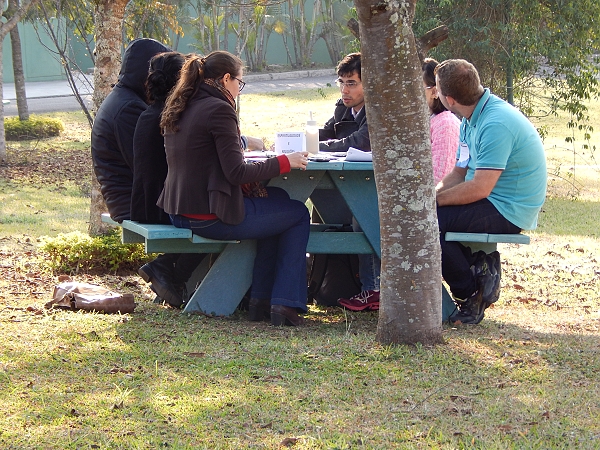
Aug 19, 2016 | Focolare Worldwide
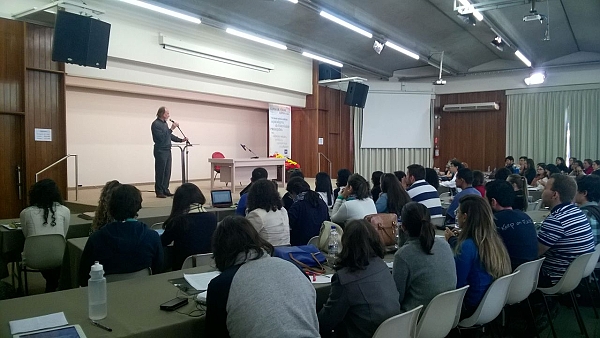 “I was totally demotivated in my profession as an engineer…Now I have rediscovered its importance in another light…” “I am in my second year in architecture. The university presents it in a very commercial light, where the human aspect is missing. This course has exceeded my expectations.” These were just two of the many impressions expressed by the 80 Latin-American university students at the end of the intense week of the course (25-30July), at the Mariapolis Ginetta Congress Centre close to Sao Paulo, Brazil. This cultural initiative promoted by the Sophia Latin-American Academic Centre (ALC) of the Focolare Movement, was an innovative project, well expressed by its title: “The theoretical-practical fundaments of the paradigm of fraternity, projected in the social, political, economic and cultural sciences.”
“I was totally demotivated in my profession as an engineer…Now I have rediscovered its importance in another light…” “I am in my second year in architecture. The university presents it in a very commercial light, where the human aspect is missing. This course has exceeded my expectations.” These were just two of the many impressions expressed by the 80 Latin-American university students at the end of the intense week of the course (25-30July), at the Mariapolis Ginetta Congress Centre close to Sao Paulo, Brazil. This cultural initiative promoted by the Sophia Latin-American Academic Centre (ALC) of the Focolare Movement, was an innovative project, well expressed by its title: “The theoretical-practical fundaments of the paradigm of fraternity, projected in the social, political, economic and cultural sciences.” 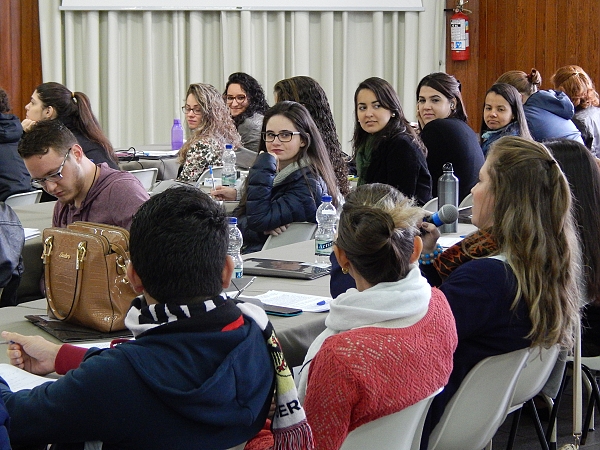 The Latin-American youths penetrated deeply into the wounds that still afflict their peoples: the socio-economic crisis, drama of the indigenous populations, and great issues of the Amazon, the social inequality and violence, of which,” as the Argentine political expert, Juan Esteban Belderrain, commented, “Latin America holds the said world title. In 2012 the number of homicides rose to over 140,000, one third of the world index and over 50,000 in Brazil alone. This sad phenomenon is on the rise. Against this dramatic background the course members delved into the cultural novelty introduced into their own disciplines, to imbue thoughts and lifestyles with the concrete activation of the paradigm of fraternity. For example, as explained by the Brazilian professor, Marconi Aurélio, and Political Sciences professor, Silva, with the application of this paradigm already practised for 20 years, politics overcomes the conflicting dimension, majorities and oppositions are viewed as complementary, part of the truth can also be gathered from opponents, and the participation of citizens is activated.
The Latin-American youths penetrated deeply into the wounds that still afflict their peoples: the socio-economic crisis, drama of the indigenous populations, and great issues of the Amazon, the social inequality and violence, of which,” as the Argentine political expert, Juan Esteban Belderrain, commented, “Latin America holds the said world title. In 2012 the number of homicides rose to over 140,000, one third of the world index and over 50,000 in Brazil alone. This sad phenomenon is on the rise. Against this dramatic background the course members delved into the cultural novelty introduced into their own disciplines, to imbue thoughts and lifestyles with the concrete activation of the paradigm of fraternity. For example, as explained by the Brazilian professor, Marconi Aurélio, and Political Sciences professor, Silva, with the application of this paradigm already practised for 20 years, politics overcomes the conflicting dimension, majorities and oppositions are viewed as complementary, part of the truth can also be gathered from opponents, and the participation of citizens is activated.  This new cultural paradigm was also put into practice in the interpersonal relationships between students and professors of various Latin-American cultures, in an interdisciplinary and multicultural dimension. But there is even more. Starting from the youth who undertook to identify the greater urgencies of their cities and with the support of the professors, projects covering the political, economic and social aspects were laid out and implemented. In conclusion, Prof. Sergio Rondinara of the Sophia University Institute (Italy) of which Sophia ALC is the first extra-European section, expressed great hope in his welcoming speech, and said that this reality gives “a beautiful, crystal-clear view of the future of this continent which has extraordinary potentials.”
This new cultural paradigm was also put into practice in the interpersonal relationships between students and professors of various Latin-American cultures, in an interdisciplinary and multicultural dimension. But there is even more. Starting from the youth who undertook to identify the greater urgencies of their cities and with the support of the professors, projects covering the political, economic and social aspects were laid out and implemented. In conclusion, Prof. Sergio Rondinara of the Sophia University Institute (Italy) of which Sophia ALC is the first extra-European section, expressed great hope in his welcoming speech, and said that this reality gives “a beautiful, crystal-clear view of the future of this continent which has extraordinary potentials.”
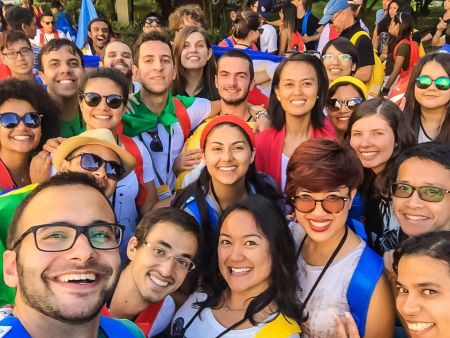
Aug 18, 2016 | Focolare Worldwide
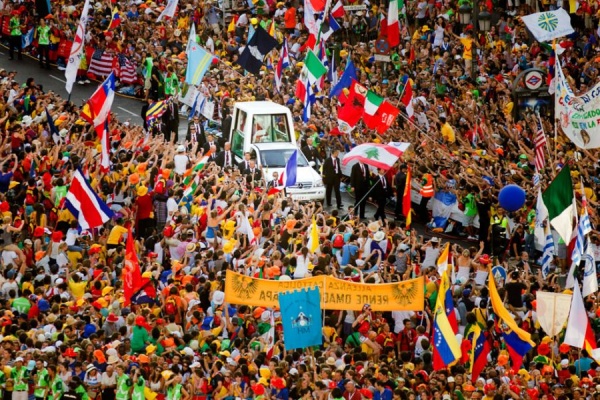 There was much enthusiasm, a desire to know more and to be protagonists of their future at Jasna, Slovakia on August 1-6. “We could never have dreamed that it would be like this. If we refuse to content ourselves with just being comfortable, if we are not couch potatoe Christians, then we will really be able to be protagonists of history,” said young Annita from Argentina when it was time to leave. “The courageous proposals that were offered by Pope Francis at WYD called for an immediate response, but also an understanding that would develop over time and that’s what we tried to do here at Jasna,” explained philosopher Gianluca Falconi. Along with theologian Michel Vandeleene and psychologist Antonella Deponte they offered a multi-disciplinary approach to the Pope’s proposals and how they could be implemented. Francesco from Krakow talked about fighting the fear of spreading peace in a world so filled with hatred. He talked about the value of mercy and of the Cross, of the obstacles that have to be overcome in order to encounter Jesus. But how could these challenges be translated concretely into daily life? The days together in Slovakia offered an opportunity to go into details, to examine the reasons behind things, to ask questions about one’s own life. The internationality of the group provided the possibility of a comparison with other parts of the world: from Lebanon to Australia, from France to the United States, from Russia to Ukraine. The organizers explain that “One of the strongest topics had nothing to do with the existence of God or the big questions of life, but the relationship with the other, the relationship with diversity. These were the themes around which the discussion developed. What came out were issues of a more personal kind, the innate value of each one of us, the chances and the difficulties that relationships with an other can represent, with an enemy, with someone who thinks differently.”
There was much enthusiasm, a desire to know more and to be protagonists of their future at Jasna, Slovakia on August 1-6. “We could never have dreamed that it would be like this. If we refuse to content ourselves with just being comfortable, if we are not couch potatoe Christians, then we will really be able to be protagonists of history,” said young Annita from Argentina when it was time to leave. “The courageous proposals that were offered by Pope Francis at WYD called for an immediate response, but also an understanding that would develop over time and that’s what we tried to do here at Jasna,” explained philosopher Gianluca Falconi. Along with theologian Michel Vandeleene and psychologist Antonella Deponte they offered a multi-disciplinary approach to the Pope’s proposals and how they could be implemented. Francesco from Krakow talked about fighting the fear of spreading peace in a world so filled with hatred. He talked about the value of mercy and of the Cross, of the obstacles that have to be overcome in order to encounter Jesus. But how could these challenges be translated concretely into daily life? The days together in Slovakia offered an opportunity to go into details, to examine the reasons behind things, to ask questions about one’s own life. The internationality of the group provided the possibility of a comparison with other parts of the world: from Lebanon to Australia, from France to the United States, from Russia to Ukraine. The organizers explain that “One of the strongest topics had nothing to do with the existence of God or the big questions of life, but the relationship with the other, the relationship with diversity. These were the themes around which the discussion developed. What came out were issues of a more personal kind, the innate value of each one of us, the chances and the difficulties that relationships with an other can represent, with an enemy, with someone who thinks differently.”  All the questions were based on personal experiences, like that of a young man from Iraq who highlighted the difficulties he is facing in relating to people from his own country. For some, a move in the direction of “the other” proved impossible. Therefore, smaller discussion groups were formed and also opportunities for personal conversations that were more spiritual, psychological or sociological. There were also discussions about the relationship with oneself, autonomy, personal dignity, feelings and open-mindedness. Another topic was the future: choosing a direction for one’s own life. This topic was discussed in a mixed group made up of teenagers, university students and workers, Christians from different Churches, agnostics, non-believers. They spoke in 13 languages and came from a variety of backgrounds, quite a diverse crowd, but alike in their thirst for truth. “It’s not the usual way young people present themselves in today’s society,” commented Gianluca who has had long experience in the field of education. Carla, an Italian remarked: “I’m 15 years old and there were people over thirty in my group. It’s beautiful because I had something to compare myself with, to ask for further explaining and feel assured.” It was an interweaving of generations, languages and cultures: “Philosophy isn’t very appreciated in my own country, because the approach to reality is different,” explained Antoine from Lebanon. “But I’m glad to be able to know other ways of thinking that are different from mine.” The young people take home with them an experience of fraternity that is the antidote to evil. Anna from Milan admits: “The Pope told us to never stop dreaming, and what we’re living now is a dream come true.”
All the questions were based on personal experiences, like that of a young man from Iraq who highlighted the difficulties he is facing in relating to people from his own country. For some, a move in the direction of “the other” proved impossible. Therefore, smaller discussion groups were formed and also opportunities for personal conversations that were more spiritual, psychological or sociological. There were also discussions about the relationship with oneself, autonomy, personal dignity, feelings and open-mindedness. Another topic was the future: choosing a direction for one’s own life. This topic was discussed in a mixed group made up of teenagers, university students and workers, Christians from different Churches, agnostics, non-believers. They spoke in 13 languages and came from a variety of backgrounds, quite a diverse crowd, but alike in their thirst for truth. “It’s not the usual way young people present themselves in today’s society,” commented Gianluca who has had long experience in the field of education. Carla, an Italian remarked: “I’m 15 years old and there were people over thirty in my group. It’s beautiful because I had something to compare myself with, to ask for further explaining and feel assured.” It was an interweaving of generations, languages and cultures: “Philosophy isn’t very appreciated in my own country, because the approach to reality is different,” explained Antoine from Lebanon. “But I’m glad to be able to know other ways of thinking that are different from mine.” The young people take home with them an experience of fraternity that is the antidote to evil. Anna from Milan admits: “The Pope told us to never stop dreaming, and what we’re living now is a dream come true.”
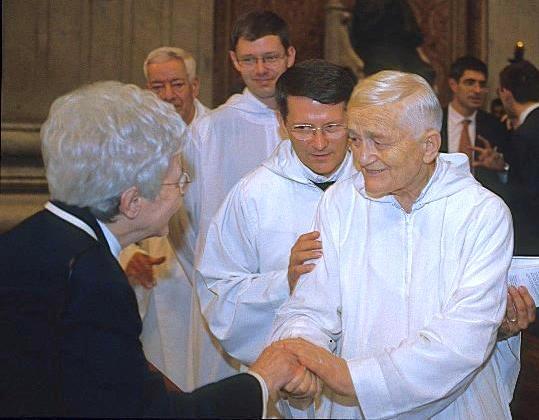
Aug 17, 2016 | Focolare Worldwide
 «Shocked by the news of the sudden death of our dear Frère Roger Schutz, we join the entire Community of Taize in this moment of prayer and deep pain. He had committed his whole life to God and his brethren, and has been crowned with the palm of martyrdom. Frère Roger was a constructor of peace, and a prophet of hope and joy. “God wants us to be happy,“ he had written to me about two months ago, and now we think of him in the fullness of joy in the heart of the Trinity. We are particularly close to you in this situation. We hope that the deep 40-year friendship with Frère Roger and the Community of Taizé, will continue even now that he has gone to Heaven.» Chiara Lubich So also today, we wish to remember him as a builder of peace, and a prophet of hope and joy.
«Shocked by the news of the sudden death of our dear Frère Roger Schutz, we join the entire Community of Taize in this moment of prayer and deep pain. He had committed his whole life to God and his brethren, and has been crowned with the palm of martyrdom. Frère Roger was a constructor of peace, and a prophet of hope and joy. “God wants us to be happy,“ he had written to me about two months ago, and now we think of him in the fullness of joy in the heart of the Trinity. We are particularly close to you in this situation. We hope that the deep 40-year friendship with Frère Roger and the Community of Taizé, will continue even now that he has gone to Heaven.» Chiara Lubich So also today, we wish to remember him as a builder of peace, and a prophet of hope and joy.
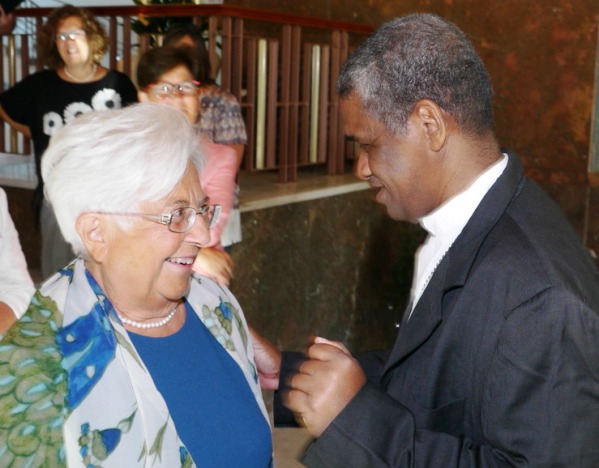
Aug 16, 2016 | Focolare Worldwide
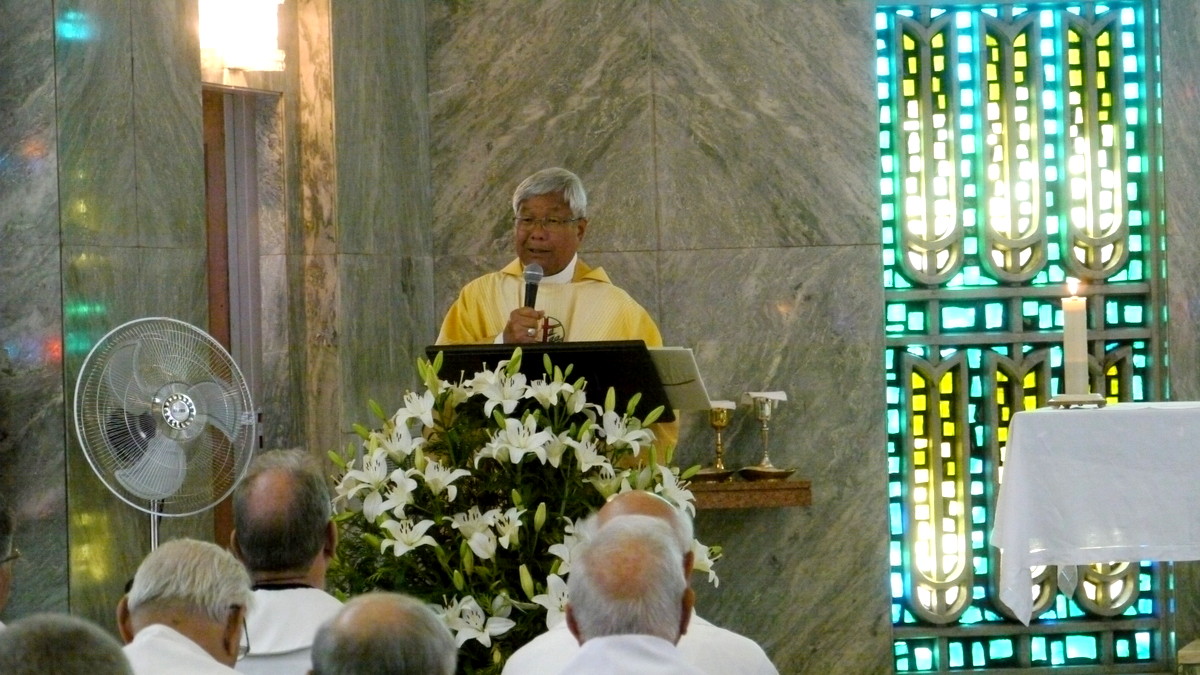 Every summer bishops from around the world gather for a preriod of rest and sharing of their lives while reflecting on being a Church that is instrument and sign of unity in the great variety of settings of the global society that is marked by so many tensions and contradictions. This year they met in Braga, Portugal. “In the Church today it is the moment of unity and communion, the moment when we are being invited to have a collective experience of God. We’re not here only because we’re each bishops, but because we’re brothers. We’d like to be a body of brothers like the first Apostles with Jesus.” These words were spoken by Cardinal João Bráz de Aviz during their Mass inside the Chapel of Apparitions as the 67 bishops from 27 countries made a pilgrimage to Fatima on August 4th.
Every summer bishops from around the world gather for a preriod of rest and sharing of their lives while reflecting on being a Church that is instrument and sign of unity in the great variety of settings of the global society that is marked by so many tensions and contradictions. This year they met in Braga, Portugal. “In the Church today it is the moment of unity and communion, the moment when we are being invited to have a collective experience of God. We’re not here only because we’re each bishops, but because we’re brothers. We’d like to be a body of brothers like the first Apostles with Jesus.” These words were spoken by Cardinal João Bráz de Aviz during their Mass inside the Chapel of Apparitions as the 67 bishops from 27 countries made a pilgrimage to Fatima on August 4th. 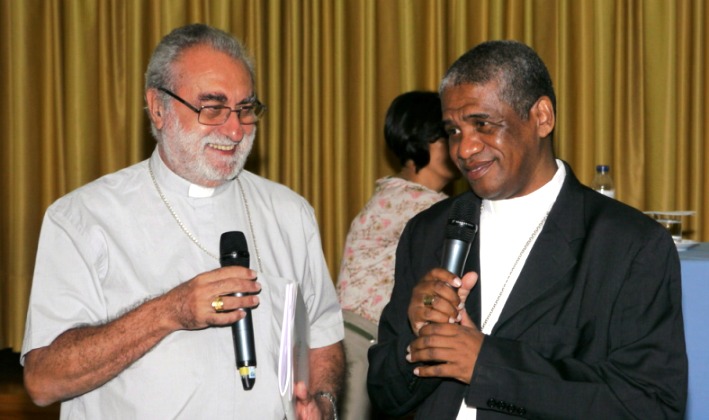 At the conclusion of the gathering Cardinal Francis Xavier Kriengsak Kovithavanij, Archbishop of Bangkok, Thailand summarized their experience in the following way: “We were really happy during these days. We’ve lived like brothers. We felt free and able to open our hearts to one another. Our only Teacher was truly among us. We felt that we were living in the house of Mary.” The bishops were welcomed at Mater Ecclesia Apostolic Centre near the Shrine of Our Lady of Sameiro, by Dom Jorge Ortiga, Archbishop of Braga. It was an appropriate setting for reflecting on the current world scene with international political expert Pasquale Ferrara, and the reform of the Church in the wake of Pope Francis with theologian Piero Coda. It was against this background that the bishops questioned themselves on how to be bishops with a synodal approach and put into practice a culture of shepherding that is marked by communion.
At the conclusion of the gathering Cardinal Francis Xavier Kriengsak Kovithavanij, Archbishop of Bangkok, Thailand summarized their experience in the following way: “We were really happy during these days. We’ve lived like brothers. We felt free and able to open our hearts to one another. Our only Teacher was truly among us. We felt that we were living in the house of Mary.” The bishops were welcomed at Mater Ecclesia Apostolic Centre near the Shrine of Our Lady of Sameiro, by Dom Jorge Ortiga, Archbishop of Braga. It was an appropriate setting for reflecting on the current world scene with international political expert Pasquale Ferrara, and the reform of the Church in the wake of Pope Francis with theologian Piero Coda. It was against this background that the bishops questioned themselves on how to be bishops with a synodal approach and put into practice a culture of shepherding that is marked by communion. 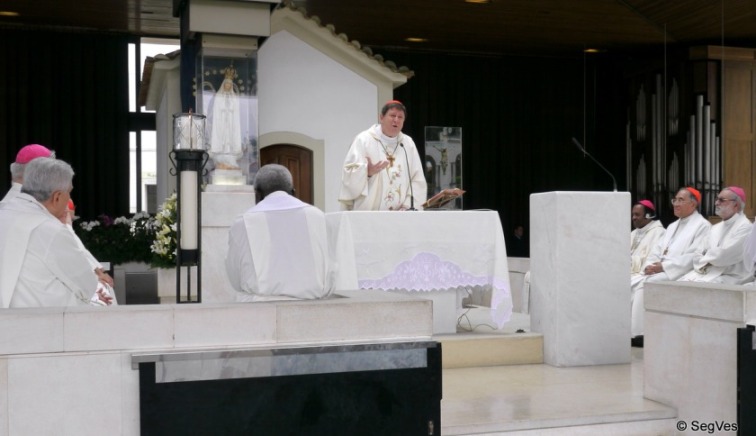 Plenary and small group meetings, walks and meals together were all opportunities to put in common painful situations and signs of hope: the anguished cry that rises from the Church in the Middle East; the growth of fruitful integration between basic ecclesial communities and new Movements and Communities in a large diocese of Brazil that offers a significant example of the Letter Iuvenescit Ecclesia (The Church that Rejuvinates), which was published in June by the Congregation for the Doctrine of the Faith; the challenges and potential of inculturation in a pluralistic context like India; the fruits that can come forth when a bishop and his auxiliaries live the common life and when a bishop manages to make himself a brother and friend of his priests; the arduous task of evangelization in a place like Madagascar that is marked by poverty.
Plenary and small group meetings, walks and meals together were all opportunities to put in common painful situations and signs of hope: the anguished cry that rises from the Church in the Middle East; the growth of fruitful integration between basic ecclesial communities and new Movements and Communities in a large diocese of Brazil that offers a significant example of the Letter Iuvenescit Ecclesia (The Church that Rejuvinates), which was published in June by the Congregation for the Doctrine of the Faith; the challenges and potential of inculturation in a pluralistic context like India; the fruits that can come forth when a bishop and his auxiliaries live the common life and when a bishop manages to make himself a brother and friend of his priests; the arduous task of evangelization in a place like Madagascar that is marked by poverty.  The two-day visit by bishops from other Churches – two Lutherans and one Syro-Orthodox – and an afternnon meeting with seven bishops from Portugal was mutually enriching. The spiritual part of the meeting had two main themes: Christ Crucified, which is one of the carindal points of the spirituality of unity; and love for the Church. These were presented in talks by Focolare president, Maria Voce (Jesus Forsaken, God’s Window & Humanity’s Window); and by co-president Jesús Morán (The Ecclesial Genius of Chiara Lubich and the Charism of Unity).
The two-day visit by bishops from other Churches – two Lutherans and one Syro-Orthodox – and an afternnon meeting with seven bishops from Portugal was mutually enriching. The spiritual part of the meeting had two main themes: Christ Crucified, which is one of the carindal points of the spirituality of unity; and love for the Church. These were presented in talks by Focolare president, Maria Voce (Jesus Forsaken, God’s Window & Humanity’s Window); and by co-president Jesús Morán (The Ecclesial Genius of Chiara Lubich and the Charism of Unity).
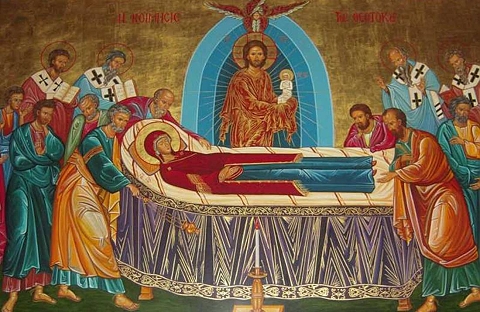
Aug 15, 2016 | Non categorizzato
 After Jesus had died and the Holy Spirit had appeared, Mary disappeared into obscurity. She had accomplished her mission and returned to living in her own element: silent service. She solved the problem of old age by seeking refuge in God, almost a second childhood of the spirit. She teaches how to die. The dying process that provokes fear, in Mary, the Mother, became a returning to her origins by constantly losing herself in God: Life that never ends. And that losing of herself in the Eternal was the death of Mary. It came on the day when the Apostles could do it on their own. But it wasn’t death as we intend it or experience it, but rather something short and sweet that theologians express with a variety of terms: pause, transition, transit, falling-asleep, life-giving-death. . . That virgin body would have been contaminated by the process of decomposition; whereas, having suffered with Christ it couldn’t but immediately rise to glory with Christ. What Resurrection was for Christ, the Assumption was for Mary: a double victory of body and spirit over death. In our times there is the terrifying spectre of the destruction of millions of human beings if not all humankind by atomic weapons, or environmental pollution. There is no way out of it other than reproducing the victory of Jesus and Mary. We must spiritually become Jesus and Mary, agents of life, and this is done by inserting our human nothingness into Divine omnipotence. If we join together in living the Gospel we become the mystical Christ, and if we are made Mary we give Jesus to society, and then war will no longer make sense and the atomic weapon will become a museum piece. There will be peace: the one heart and one soul of a community gathered around the Mother, and its blessed fruit will be unity, the unity of the Living. By rising from this bloody swamp of the earth, to the Heaven of Mary, the Fairest Star of the Sea, we come to a better understanding of the meaning of her Assumption which is the ultimate seal on her unique privilege as the Virgin Mother of God. The materialist should also be moved by this, since it represents the exaltation of the physical body by the power of the Spirit. In Mary we celebrate the redemption of matter and exalt the physical universe that is transfigured into a Temple of the Most High. It’s enough to contemplate even for a moment with the knowledge of love, the place of Mary who rises from earth to Heaven through the cosmos to the full grasp of her identity and of her role. She is the masterpiece of creation. Mary is humble, because no outward highness elevates her; silent, because no human voice seems to be able to define her; poor, because no earthly ornament seems able to decorate her. She speaks only with the language of God’s Word whose richness is only Wisdom of God, grand with the grandness of God. So identified with the Lord, Mary is the human expression of the greatness of the Trinity’s very mind and of its love. She is the Queen – Mistress and Servant – of the Lord’s Dwelling, who opens the doors and lets the children in, occupying herself with welcoming everyone into the palace of the Father, for the glory of the Son in the Seal of the Spirit. She provides mortals with an idea of God who infinitely dominates and overwhelms their intelligence. As if to mediate the power, the wisdom and the love of the ineffable Trinity, God wished to manifest all his power in her. In his infinite originality which humankind would never have tapped, the Creator invented Mary in whose womb the Eternal Word became flesh in our midst and, in his humanity, God became accessible and the Divine Love became part of our home life. Mary among us brings God into our midst. She is the Gate of Heaven. She is taken into Heaven in order to gather the children into the Father’s house. That is why they call on her even a hundred times a day, that she might pray for them now and at the hour of death. (Igino Giordani, Maria modello perfetto, (Rome: Città Nuova, 2012 [1967]), p. 157 – 163.
After Jesus had died and the Holy Spirit had appeared, Mary disappeared into obscurity. She had accomplished her mission and returned to living in her own element: silent service. She solved the problem of old age by seeking refuge in God, almost a second childhood of the spirit. She teaches how to die. The dying process that provokes fear, in Mary, the Mother, became a returning to her origins by constantly losing herself in God: Life that never ends. And that losing of herself in the Eternal was the death of Mary. It came on the day when the Apostles could do it on their own. But it wasn’t death as we intend it or experience it, but rather something short and sweet that theologians express with a variety of terms: pause, transition, transit, falling-asleep, life-giving-death. . . That virgin body would have been contaminated by the process of decomposition; whereas, having suffered with Christ it couldn’t but immediately rise to glory with Christ. What Resurrection was for Christ, the Assumption was for Mary: a double victory of body and spirit over death. In our times there is the terrifying spectre of the destruction of millions of human beings if not all humankind by atomic weapons, or environmental pollution. There is no way out of it other than reproducing the victory of Jesus and Mary. We must spiritually become Jesus and Mary, agents of life, and this is done by inserting our human nothingness into Divine omnipotence. If we join together in living the Gospel we become the mystical Christ, and if we are made Mary we give Jesus to society, and then war will no longer make sense and the atomic weapon will become a museum piece. There will be peace: the one heart and one soul of a community gathered around the Mother, and its blessed fruit will be unity, the unity of the Living. By rising from this bloody swamp of the earth, to the Heaven of Mary, the Fairest Star of the Sea, we come to a better understanding of the meaning of her Assumption which is the ultimate seal on her unique privilege as the Virgin Mother of God. The materialist should also be moved by this, since it represents the exaltation of the physical body by the power of the Spirit. In Mary we celebrate the redemption of matter and exalt the physical universe that is transfigured into a Temple of the Most High. It’s enough to contemplate even for a moment with the knowledge of love, the place of Mary who rises from earth to Heaven through the cosmos to the full grasp of her identity and of her role. She is the masterpiece of creation. Mary is humble, because no outward highness elevates her; silent, because no human voice seems to be able to define her; poor, because no earthly ornament seems able to decorate her. She speaks only with the language of God’s Word whose richness is only Wisdom of God, grand with the grandness of God. So identified with the Lord, Mary is the human expression of the greatness of the Trinity’s very mind and of its love. She is the Queen – Mistress and Servant – of the Lord’s Dwelling, who opens the doors and lets the children in, occupying herself with welcoming everyone into the palace of the Father, for the glory of the Son in the Seal of the Spirit. She provides mortals with an idea of God who infinitely dominates and overwhelms their intelligence. As if to mediate the power, the wisdom and the love of the ineffable Trinity, God wished to manifest all his power in her. In his infinite originality which humankind would never have tapped, the Creator invented Mary in whose womb the Eternal Word became flesh in our midst and, in his humanity, God became accessible and the Divine Love became part of our home life. Mary among us brings God into our midst. She is the Gate of Heaven. She is taken into Heaven in order to gather the children into the Father’s house. That is why they call on her even a hundred times a day, that she might pray for them now and at the hour of death. (Igino Giordani, Maria modello perfetto, (Rome: Città Nuova, 2012 [1967]), p. 157 – 163.

Aug 13, 2016 | Non categorizzato
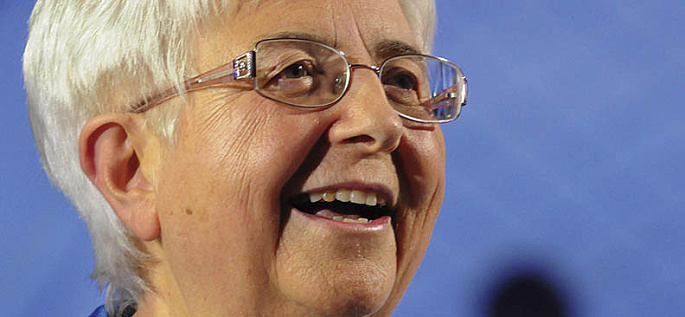 La prima reazione è stata di gratitudine. Nella Iuvenescit Ecclesia il Movimento dei Focolari vede un invito a proseguire nel cammino che l’ha accompagnato fino ad oggi. In particolare il richiamo alla «reciprocità tra doni gerarchici e doni carismatici», alla loro «coessenzialità» sembra interpretare appieno l’esperienza maturata, giorno dopo giorno, dalla nuova realtà ecclesiale fondata da Chiara Lubich. Con l’intervista a Maria Voce, presidente del Movimento dei Focolari, proseguiamo il ciclo dedicato all’approfondimento della lettera della Congregazione per la dottrina della fede, su cui nelle scorse settimane sono intervenuti Salvatore Martinez, presidente nazionale del Rinnovamento nello Spirito Santo e don Julián Carrón, presidente della Fraternità di Comunione e liberazione. «Il documento – sottolinea Maria Voce – parla chiaro: la Chiesa è una, è “un corpo” chiamato a incarnare il mistero di comunione della vita trinitaria. Protagonista del ringiovanimento della Chiesa è lo Spirito Santo che agisce, in particolare, attraverso i carismi. Il documento riconosce dunque ai movimenti una cosa importante: la capacità, se corrispondiamo alla grazia, di rivitalizzare la Chiesa. Con uno scopo chiaro: contribuire a immettere la vita di Dio negli ingranaggi della vita sociale, farla “toccare” dagli uomini e donne immersi nella complessità del nostro mondo. Il punto centrale del documento è la reciprocità, la coessenzialità nella vita della Chiesa tra doni gerarchici e doni carismatici. Si tratta di un richiamo esplicito all’insegnamento conciliare. Sì, mi pare che la lettera ponga in maniera inequivoca una pietra miliare di notevole portata dottrinale, sia nel riferirsi al Concilio Vaticano II, sia nel riconoscere una “convergenza del recente magistero ecclesiale” sulla coessenzialità: medesima origine e medesimo fine dei doni gerarchici e dei doni carismatici, tema che in questi anni non era stato recepito sufficientemente e aspettava un approfondimento.
La prima reazione è stata di gratitudine. Nella Iuvenescit Ecclesia il Movimento dei Focolari vede un invito a proseguire nel cammino che l’ha accompagnato fino ad oggi. In particolare il richiamo alla «reciprocità tra doni gerarchici e doni carismatici», alla loro «coessenzialità» sembra interpretare appieno l’esperienza maturata, giorno dopo giorno, dalla nuova realtà ecclesiale fondata da Chiara Lubich. Con l’intervista a Maria Voce, presidente del Movimento dei Focolari, proseguiamo il ciclo dedicato all’approfondimento della lettera della Congregazione per la dottrina della fede, su cui nelle scorse settimane sono intervenuti Salvatore Martinez, presidente nazionale del Rinnovamento nello Spirito Santo e don Julián Carrón, presidente della Fraternità di Comunione e liberazione. «Il documento – sottolinea Maria Voce – parla chiaro: la Chiesa è una, è “un corpo” chiamato a incarnare il mistero di comunione della vita trinitaria. Protagonista del ringiovanimento della Chiesa è lo Spirito Santo che agisce, in particolare, attraverso i carismi. Il documento riconosce dunque ai movimenti una cosa importante: la capacità, se corrispondiamo alla grazia, di rivitalizzare la Chiesa. Con uno scopo chiaro: contribuire a immettere la vita di Dio negli ingranaggi della vita sociale, farla “toccare” dagli uomini e donne immersi nella complessità del nostro mondo. Il punto centrale del documento è la reciprocità, la coessenzialità nella vita della Chiesa tra doni gerarchici e doni carismatici. Si tratta di un richiamo esplicito all’insegnamento conciliare. Sì, mi pare che la lettera ponga in maniera inequivoca una pietra miliare di notevole portata dottrinale, sia nel riferirsi al Concilio Vaticano II, sia nel riconoscere una “convergenza del recente magistero ecclesiale” sulla coessenzialità: medesima origine e medesimo fine dei doni gerarchici e dei doni carismatici, tema che in questi anni non era stato recepito sufficientemente e aspettava un approfondimento.  Una coessenzialità che voi sottolineate far parte da sempre della vostra esperienza. Dagli inizi il Movimento dei Focolari ha teso a questo intimo rapporto con chi nella Chiesa aveva il carisma del discernimento. Lo si vede, ad esempio, dalla lunga storia della sua approvazione, inseguita con determinazione adamantina e fiducia totale, a volte nella sofferenza, da Chiara Lubich e da quanti generavano con lei questa nuova creatura. La narra lei stessa nel suo libro “Il Grido”. I riconoscimenti poi, come si sa, sono arrivati abbondanti. Anche altri rappresentanti di Chiese cristiane hanno voluto esplicitare il proprio riconoscimento, a cominciare dal patriarca ecumenico Athenagoras I, dal vescovo luterano Hermann Dietzfelbinger, dal primate anglicano Michael Ramsey e da tanti altri. La lettera sottolinea che non può esistere contrapposizione tra Chiesa delle istituzioni e Chiesa della carità. Che significa da una parte rinunciare a ogni presunzione istituzionale, dall’altra all’autoreferenzialità. In che modo si possono evitare questi rischi? Vivendo ciascuno per lo scopo per cui la Chiesa esiste: l’umanità intera. Nel concreto e nel locale avviene poi il reciproco implementarsi con la ricchezza di ciascuno. La fraternità universale esige l’impegno di tutti e richiede infiniti piccoli passi. Dal 30 giugno al 2 luglio, ad esempio, 300 movimenti e comunità nati in seno alla Chiesa cattolica e a molte altre Chiese si sono dati appuntamento a Monaco, in Germania. ‘Insieme per l’Europa’, è un cammino iniziato nel 1999 e che continua insieme per il bene di questo continente, che deve riscoprire se stesso e ha gravi doveri verso il resto del mondo. E per realizzare l’armonia di cui parla il documento, come e dove bisogna operare? Credo che dobbiamo procedere con fiducia sulla strada che indica. Forse occorre approfondire maggiormente le conseguenze del riconoscere la coessenzialità tra doni gerarchici e carismatici. Bisogna pensare come avviare nella pratica una profonda e concreta partecipazione di ambedue aspetti ai vari livelli della Chiesa. Non basta la constatazione, mi sembra che si debbano trovare anche le modalità operative per procedere insieme. Uno slogan per il documento potrebbe essere quello di “Unirsi per una Chiesa in uscita”. Come interpretare questo impegno? Quella dei dialoghi è la via percorsa dai Focolari, manifestatisi via via con chiarezza, legati a fatti precisi e a incontri con persone concrete. Non quindi strategia, ma sostanza della relazione nel vicendevole riconoscimento e nel reciproco amore. Da qui il maturare del dialogo all’interno delle proprie Chiese, tra le chiese cristiane, con le altre religioni, con persone di riferimento non religioso, con la cultura contemporanea. Alcuni interpreti sottolineano come papa Francesco sia spesso un tantino severo verso i movimenti. È così? Non lo ritengo severo. Trovo sintonia fra le sue parole e gesti e il vissuto dei movimenti. È uno dei Papi che più è entrato in contatto con essi partecipando a manifestazioni o nelle udienze. Così con il Rinnovamento nello Spirito, Cammino Neocatecumenale, Comunione e Liberazione, Schoenstatt… Lo ha fatto anche con i Focolari ricevendo i 600 partecipanti all’Assemblea generale del 2014. Certe sue precisazioni che ad osservatori esterni possono risultare rimproveri, spronano i movimenti a vivere il proprio carisma, ad essere più fedeli allo Spirito Santo per meglio contribuire alla Chiesa comunione. Nitide le sue parole dello scorso aprile nella sua inaspettata visita alla Mariapoli di Roma a Villa Borghese. Con un’immagine, ha sottolineato l’importanza e la capacità dei movimenti di vivificare i vari ambienti: «trasformate i deserti in foresta». L’ultima parte del documento contiene l’invito a guardare a Maria. Un “richiamo” che in qualche modo fa parte del vostro stesso essere Movimento. Maria è la carismatica per eccellenza e ciò la pone al centro della Chiesa nascente, custode della presenza del Risorto fra gli apostoli che, in una Chiesa che non sapeva ancora di essere tale, solo lei poteva bene interpretare. «La dimensione mariana della Chiesa precede la sua dimensione petrina», scrive Giovanni Paolo II nella Mulieris dignitatem: infatti non siamo i cristiani a “fare” la Chiesa ma è il Risorto che ci precede. Da qui il richiamo al Movimento dei Focolari, chiamato dal suo specifico carisma a generare Gesù spiritualmente laddove i suoi membri vivono. Una vocazione descritta negli Statuti con parole forti: essere – per quanto è possibile – una continuazione di Maria, proprio in quella sua specifica opera di dare al mondo Cristo. Il vostro obiettivo, mi corregga se sbaglio, è edificare tutti insieme la civiltà nuova dell’amore. Dove bisogna operare soprattutto in questi tempi? Quali le periferie in cui è necessario essere presenti? Le periferie sono là dove c’è un di più di sofferenza. Papa Francesco non smette di indicarle. Non sono solo le povertà materiali ma anche quelle spirituali: la perdita di senso, lo smarrimento delle radici cristiane in un’Europa logorata dal consumismo, dall’edonismo, dal potere economico e tecnologico, la devastazione del creato, le stragi, il dramma umanitario dei rifugiati e le migrazioni di massa, i tanti conflitti armati. Le periferie sono infinite. Non si tratta di fare tutti insieme la stessa cosa, ma di lavorare insieme con lo stesso scopo: trasformare il deserto in foresta. Riccardo Maccioni, 7 agosto 2016 Pdf dell’intervista
Una coessenzialità che voi sottolineate far parte da sempre della vostra esperienza. Dagli inizi il Movimento dei Focolari ha teso a questo intimo rapporto con chi nella Chiesa aveva il carisma del discernimento. Lo si vede, ad esempio, dalla lunga storia della sua approvazione, inseguita con determinazione adamantina e fiducia totale, a volte nella sofferenza, da Chiara Lubich e da quanti generavano con lei questa nuova creatura. La narra lei stessa nel suo libro “Il Grido”. I riconoscimenti poi, come si sa, sono arrivati abbondanti. Anche altri rappresentanti di Chiese cristiane hanno voluto esplicitare il proprio riconoscimento, a cominciare dal patriarca ecumenico Athenagoras I, dal vescovo luterano Hermann Dietzfelbinger, dal primate anglicano Michael Ramsey e da tanti altri. La lettera sottolinea che non può esistere contrapposizione tra Chiesa delle istituzioni e Chiesa della carità. Che significa da una parte rinunciare a ogni presunzione istituzionale, dall’altra all’autoreferenzialità. In che modo si possono evitare questi rischi? Vivendo ciascuno per lo scopo per cui la Chiesa esiste: l’umanità intera. Nel concreto e nel locale avviene poi il reciproco implementarsi con la ricchezza di ciascuno. La fraternità universale esige l’impegno di tutti e richiede infiniti piccoli passi. Dal 30 giugno al 2 luglio, ad esempio, 300 movimenti e comunità nati in seno alla Chiesa cattolica e a molte altre Chiese si sono dati appuntamento a Monaco, in Germania. ‘Insieme per l’Europa’, è un cammino iniziato nel 1999 e che continua insieme per il bene di questo continente, che deve riscoprire se stesso e ha gravi doveri verso il resto del mondo. E per realizzare l’armonia di cui parla il documento, come e dove bisogna operare? Credo che dobbiamo procedere con fiducia sulla strada che indica. Forse occorre approfondire maggiormente le conseguenze del riconoscere la coessenzialità tra doni gerarchici e carismatici. Bisogna pensare come avviare nella pratica una profonda e concreta partecipazione di ambedue aspetti ai vari livelli della Chiesa. Non basta la constatazione, mi sembra che si debbano trovare anche le modalità operative per procedere insieme. Uno slogan per il documento potrebbe essere quello di “Unirsi per una Chiesa in uscita”. Come interpretare questo impegno? Quella dei dialoghi è la via percorsa dai Focolari, manifestatisi via via con chiarezza, legati a fatti precisi e a incontri con persone concrete. Non quindi strategia, ma sostanza della relazione nel vicendevole riconoscimento e nel reciproco amore. Da qui il maturare del dialogo all’interno delle proprie Chiese, tra le chiese cristiane, con le altre religioni, con persone di riferimento non religioso, con la cultura contemporanea. Alcuni interpreti sottolineano come papa Francesco sia spesso un tantino severo verso i movimenti. È così? Non lo ritengo severo. Trovo sintonia fra le sue parole e gesti e il vissuto dei movimenti. È uno dei Papi che più è entrato in contatto con essi partecipando a manifestazioni o nelle udienze. Così con il Rinnovamento nello Spirito, Cammino Neocatecumenale, Comunione e Liberazione, Schoenstatt… Lo ha fatto anche con i Focolari ricevendo i 600 partecipanti all’Assemblea generale del 2014. Certe sue precisazioni che ad osservatori esterni possono risultare rimproveri, spronano i movimenti a vivere il proprio carisma, ad essere più fedeli allo Spirito Santo per meglio contribuire alla Chiesa comunione. Nitide le sue parole dello scorso aprile nella sua inaspettata visita alla Mariapoli di Roma a Villa Borghese. Con un’immagine, ha sottolineato l’importanza e la capacità dei movimenti di vivificare i vari ambienti: «trasformate i deserti in foresta». L’ultima parte del documento contiene l’invito a guardare a Maria. Un “richiamo” che in qualche modo fa parte del vostro stesso essere Movimento. Maria è la carismatica per eccellenza e ciò la pone al centro della Chiesa nascente, custode della presenza del Risorto fra gli apostoli che, in una Chiesa che non sapeva ancora di essere tale, solo lei poteva bene interpretare. «La dimensione mariana della Chiesa precede la sua dimensione petrina», scrive Giovanni Paolo II nella Mulieris dignitatem: infatti non siamo i cristiani a “fare” la Chiesa ma è il Risorto che ci precede. Da qui il richiamo al Movimento dei Focolari, chiamato dal suo specifico carisma a generare Gesù spiritualmente laddove i suoi membri vivono. Una vocazione descritta negli Statuti con parole forti: essere – per quanto è possibile – una continuazione di Maria, proprio in quella sua specifica opera di dare al mondo Cristo. Il vostro obiettivo, mi corregga se sbaglio, è edificare tutti insieme la civiltà nuova dell’amore. Dove bisogna operare soprattutto in questi tempi? Quali le periferie in cui è necessario essere presenti? Le periferie sono là dove c’è un di più di sofferenza. Papa Francesco non smette di indicarle. Non sono solo le povertà materiali ma anche quelle spirituali: la perdita di senso, lo smarrimento delle radici cristiane in un’Europa logorata dal consumismo, dall’edonismo, dal potere economico e tecnologico, la devastazione del creato, le stragi, il dramma umanitario dei rifugiati e le migrazioni di massa, i tanti conflitti armati. Le periferie sono infinite. Non si tratta di fare tutti insieme la stessa cosa, ma di lavorare insieme con lo stesso scopo: trasformare il deserto in foresta. Riccardo Maccioni, 7 agosto 2016 Pdf dell’intervista
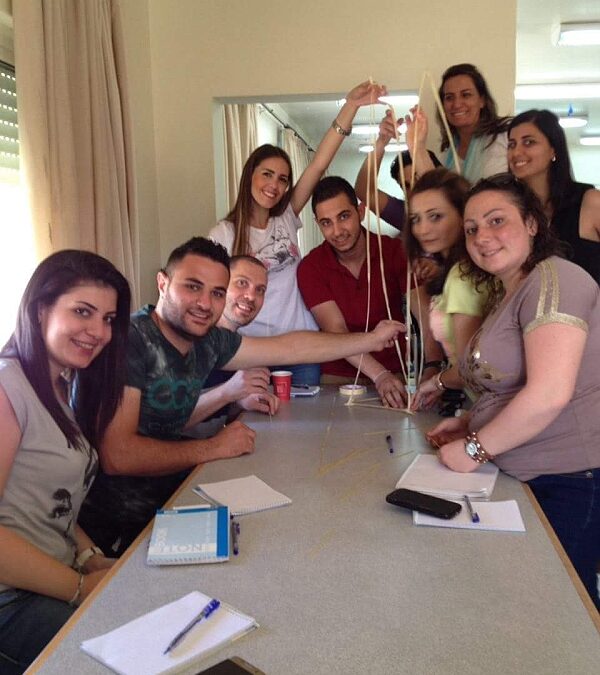
Aug 12, 2016 | Focolare Worldwide
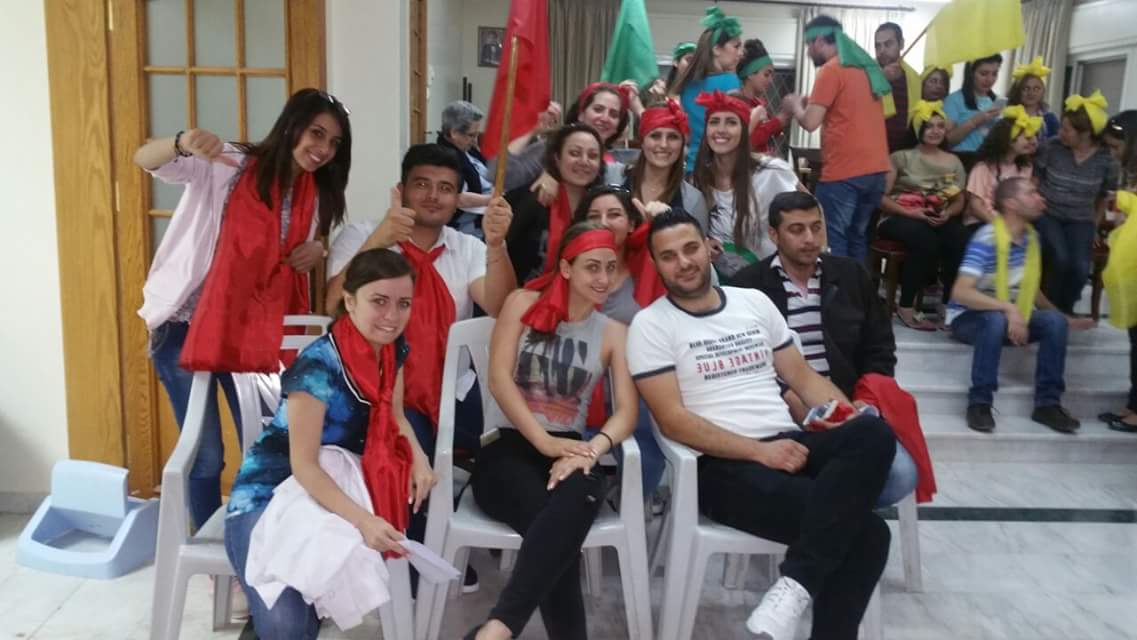 “I learned to transform the negative into positive and transmit it to my friends and not to despair in the face of difficulties.” Said in a context like that of Syria, where the young people live “under continuous psychological pressure” each word weighs differently. “Sad to say, there is continuous news from Syria about civilian war victims, especially in Aleppo,” Pope Francis reminded all once again in the Angelus of 7 August. He continued saying “It is unacceptable that many innocent people – and many children – have to pay the price of the conflict, which is that of closed hearts and the lack of will of those in power.” He then urged all to take everything to heart and personally support the Syrian brothers and sisters with their prayers and solidarity. War is stressful even if there are seeds of hope, and it is what we must continue to focus on. “We felt that we had to do something different with the youth, to support them from the spiritual and human standpoint,” recounted Lina Morcosand Murad Al Shawareb, educators of the Focolare Movement, «and this is why we thought of inviting Sr Noha Daccache, Lebanese, of the Sacred Heart, and university professor specialising in social sciences. We chose to deepen, in this year of mercy, the concept of “Mercy and prayer in our daily lives.”
“I learned to transform the negative into positive and transmit it to my friends and not to despair in the face of difficulties.” Said in a context like that of Syria, where the young people live “under continuous psychological pressure” each word weighs differently. “Sad to say, there is continuous news from Syria about civilian war victims, especially in Aleppo,” Pope Francis reminded all once again in the Angelus of 7 August. He continued saying “It is unacceptable that many innocent people – and many children – have to pay the price of the conflict, which is that of closed hearts and the lack of will of those in power.” He then urged all to take everything to heart and personally support the Syrian brothers and sisters with their prayers and solidarity. War is stressful even if there are seeds of hope, and it is what we must continue to focus on. “We felt that we had to do something different with the youth, to support them from the spiritual and human standpoint,” recounted Lina Morcosand Murad Al Shawareb, educators of the Focolare Movement, «and this is why we thought of inviting Sr Noha Daccache, Lebanese, of the Sacred Heart, and university professor specialising in social sciences. We chose to deepen, in this year of mercy, the concept of “Mercy and prayer in our daily lives.” 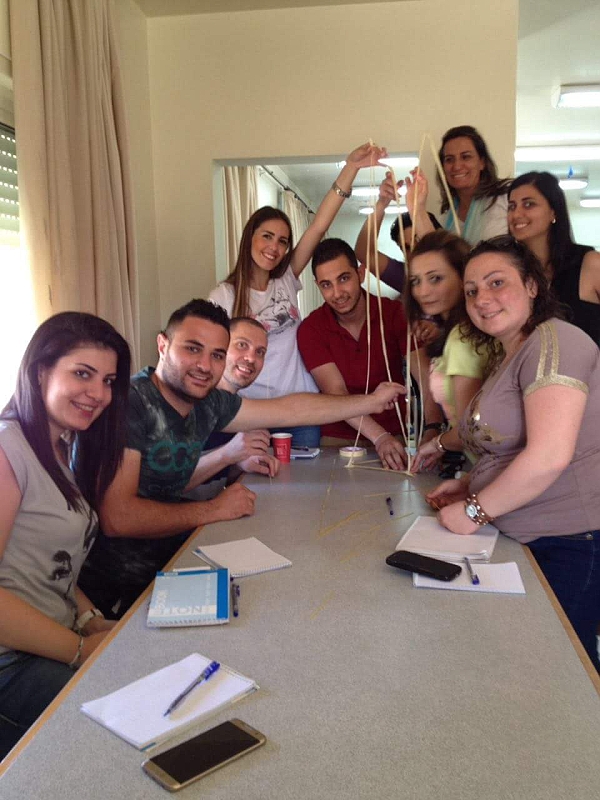 “Already during the preparations – through the iPhone application WhatsApp – there was a great sense of maturity,” seen also during the three-day event (from 10 to 12 June). Sr Noha’s reflections on mercy and prayer, and the Sacred Scriptures also seen in relation to their spiritual lives, triggered questions and reflections. “But on the first day we realised that we were all stressed out due to the situation we were undergoing. So we first held a dialogue session, after which someone suggested a moment of prayer. It was a moving moment with songs and meditations, where the youth said spontaneous prayers and with faith, asked for the gift of Peace.” “On the second day, we delved deeper into the various aspects of life that hindered us from fully corresponding to what God asks of us each day. On the last day instead, Chiara Lubich’s article, ‘Better than yesterday’, was really enlightening since it gave us a concrete key to always love Jesus better.” A girl wrote, “I understood that I had to live the present moment solemnly, to offer the pain and live it for Jesus; all the rest is secondary. While praying I felt that Jesus was saying to me: I am with you.” As she was leaving, Sr Caccache said “You people are really outstanding – I shall keep you in my heart and pray intensely for Peace.” Maria Chiara De Lorenzo
“Already during the preparations – through the iPhone application WhatsApp – there was a great sense of maturity,” seen also during the three-day event (from 10 to 12 June). Sr Noha’s reflections on mercy and prayer, and the Sacred Scriptures also seen in relation to their spiritual lives, triggered questions and reflections. “But on the first day we realised that we were all stressed out due to the situation we were undergoing. So we first held a dialogue session, after which someone suggested a moment of prayer. It was a moving moment with songs and meditations, where the youth said spontaneous prayers and with faith, asked for the gift of Peace.” “On the second day, we delved deeper into the various aspects of life that hindered us from fully corresponding to what God asks of us each day. On the last day instead, Chiara Lubich’s article, ‘Better than yesterday’, was really enlightening since it gave us a concrete key to always love Jesus better.” A girl wrote, “I understood that I had to live the present moment solemnly, to offer the pain and live it for Jesus; all the rest is secondary. While praying I felt that Jesus was saying to me: I am with you.” As she was leaving, Sr Caccache said “You people are really outstanding – I shall keep you in my heart and pray intensely for Peace.” Maria Chiara De Lorenzo

Aug 10, 2016 | Non categorizzato
“I’m sorry …” “One of my older medical colleagues had taken me to task in front of the patients, for a mistake he thought I had made. I was struck to the quick and left the room slamming the door behind me. When I got home, I wasn’t able to regain my calm. I had to do something to re-establish the relationship. After several attempts, I decided to telephone him at his office. “I’m sorry,” I told him, “for what happened this morning.” It took him totally by surprise and made him very happy. Our relationship has continued to grow since then. I discovered that even amidst all the difficulties, it is possible to bring a human dimension to our work.” R. S. – Canada What should we do with the money? “We had received a large sum of money from a relative. We were surprised by the generous gesture and wondered what we should do with the money. There are nine people in our family and each one was saying what he or she wanted. . . As for me, I would have liked to use at least part of the money for a social cause. But would our children agree? Just then my wife and I recalled that we also had a son in Heaven. If he were still with us, he would certainly want his share of the money. So, nobody objected to donating his share to a charitable cause. Just sharing the idea with the kids was enough for them to cheerfully agree.” C. M. – Argentina  Loving Without Expectations “Our daughter, Anna, was a girl full of life and ideals that she wanted to fulfil: finishing her degree, doing archaeology and starting a family. . . Unfortunately things didn’t work out that way. After graduation she went through a period of serious stress because her boyfriend had just left her. My wife and I were quite disturbed. We felt helpless and began to wonder if we had done something wrong in her upbringing. She had even attempted suicide. This hard experience led us into a deeper relationship with God. We and our other children tried to love Anna without expecting anything in return and, little by little, following appropriate treatment, she was able to come out of the tunnel. One day she confided to me that the love she had received from the family had healed her.” E. P. – Austria
Loving Without Expectations “Our daughter, Anna, was a girl full of life and ideals that she wanted to fulfil: finishing her degree, doing archaeology and starting a family. . . Unfortunately things didn’t work out that way. After graduation she went through a period of serious stress because her boyfriend had just left her. My wife and I were quite disturbed. We felt helpless and began to wonder if we had done something wrong in her upbringing. She had even attempted suicide. This hard experience led us into a deeper relationship with God. We and our other children tried to love Anna without expecting anything in return and, little by little, following appropriate treatment, she was able to come out of the tunnel. One day she confided to me that the love she had received from the family had healed her.” E. P. – Austria

Aug 8, 2016 | Focolare Worldwide, Senza categoria
 “No one in my family knew the Focolare, and I remember that the only reason why I attended the weekly Saturday appointments where we delved into the life of the Gospel was that I felt loved without conditions. I was born and raised in Ascoli Piceno, in the Marche region of Italy. Every year I attended religious education classes for young people, which established me on my faith journey. When I was 19 I had to face knee surgery that resulted in several complications. While I was still in hospital the doctors told me that I’d no longer be able to play volleyball and that I wouldn’t have the full use of my leg. Right then, I understood what it meant to say that ‘God is the ideal that never crumbles’ and I firmly decided for God. If I couldn’t play any kind of sport anymore, God would certainly find something else for me to do. After high school I began university, but went back every Saturday to help out at the parish, setting up games for teens and young people. Even though I couldn’t play, I found out how much fun it can be to help others play, getting them to perform some feats that were truly acrobatic! Throughout those years I became aware of God’s powerful call in my heart, to to spend my whole life for Him in others. At the 2007 Mariapolis, after receiving Jesus in the Holy Eucharist, I felt in my heart what my path in life might be: to bring the charism of unity into my diocese. It was an absolute decision for God in favour of something quite precise. This plunge in God led me to live life to the full, in the fullness of joy, and it allowed me to face a situation that on the human level I would never have been able to face. In 2010, I began to have new problems with my leg that had been through surgery, then the other leg, my back, and, in a matter of few months it was an effort for me to walk and stand on my feet. The doctors couldn’t come up with an explanations and since I was close to finishing my diploma, they hypothesized that it was some sort of nervous condition or form of depression. In my heart I continued to feel a joy that came from living the same ideal together with my friends in the Focolare and couldn’t understand what was going on. One night, I escaped to a church and prayed in front of Eucharistic Jesus: “If it enters into your will for me to begin these medical treatments, give me a sign. If, instead, I have some sort of strange ailment, let me know, because I would like to go on being a gift for the others.” That very treatment revealed a rare genetic illness that was causing all the problems I was experiencing and that continues to cause the chronic pain that I constantly live with. At first my mind was invaded by questions and despair. How would I be able to live for others? I realized that God’s Love didn’t change in front of the pain, perhaps I understood it in a different way, but His love always remained immense, endless. What should I do then? What could I do? I would carry on loving and building unity with everyone around me, even if it required more effort now, even if I felt like I’d rather be left alone. A few months later I was asked to take on a group of small boys. I wondered: will I be able to do it? I put aside my fears and decided to place myself at the service of others. Today, I have to say that over these years, the kids in that group were my strength and courage. Because, by loving, you can overcome anything. So many times I felt like I wouldn’t be physically able to hold up, but I did. I saw for myself that ‘Nothing is impossible for God’.”
“No one in my family knew the Focolare, and I remember that the only reason why I attended the weekly Saturday appointments where we delved into the life of the Gospel was that I felt loved without conditions. I was born and raised in Ascoli Piceno, in the Marche region of Italy. Every year I attended religious education classes for young people, which established me on my faith journey. When I was 19 I had to face knee surgery that resulted in several complications. While I was still in hospital the doctors told me that I’d no longer be able to play volleyball and that I wouldn’t have the full use of my leg. Right then, I understood what it meant to say that ‘God is the ideal that never crumbles’ and I firmly decided for God. If I couldn’t play any kind of sport anymore, God would certainly find something else for me to do. After high school I began university, but went back every Saturday to help out at the parish, setting up games for teens and young people. Even though I couldn’t play, I found out how much fun it can be to help others play, getting them to perform some feats that were truly acrobatic! Throughout those years I became aware of God’s powerful call in my heart, to to spend my whole life for Him in others. At the 2007 Mariapolis, after receiving Jesus in the Holy Eucharist, I felt in my heart what my path in life might be: to bring the charism of unity into my diocese. It was an absolute decision for God in favour of something quite precise. This plunge in God led me to live life to the full, in the fullness of joy, and it allowed me to face a situation that on the human level I would never have been able to face. In 2010, I began to have new problems with my leg that had been through surgery, then the other leg, my back, and, in a matter of few months it was an effort for me to walk and stand on my feet. The doctors couldn’t come up with an explanations and since I was close to finishing my diploma, they hypothesized that it was some sort of nervous condition or form of depression. In my heart I continued to feel a joy that came from living the same ideal together with my friends in the Focolare and couldn’t understand what was going on. One night, I escaped to a church and prayed in front of Eucharistic Jesus: “If it enters into your will for me to begin these medical treatments, give me a sign. If, instead, I have some sort of strange ailment, let me know, because I would like to go on being a gift for the others.” That very treatment revealed a rare genetic illness that was causing all the problems I was experiencing and that continues to cause the chronic pain that I constantly live with. At first my mind was invaded by questions and despair. How would I be able to live for others? I realized that God’s Love didn’t change in front of the pain, perhaps I understood it in a different way, but His love always remained immense, endless. What should I do then? What could I do? I would carry on loving and building unity with everyone around me, even if it required more effort now, even if I felt like I’d rather be left alone. A few months later I was asked to take on a group of small boys. I wondered: will I be able to do it? I put aside my fears and decided to place myself at the service of others. Today, I have to say that over these years, the kids in that group were my strength and courage. Because, by loving, you can overcome anything. So many times I felt like I wouldn’t be physically able to hold up, but I did. I saw for myself that ‘Nothing is impossible for God’.”

 A delegation of 40 people from Cameroon are on their way to Rome. Among them are 9 traditional leaders (Fon), the native Kings of the Bangwa people of Lebialem, South-West Cameroon (Fon-Fontem, Fon-Nwametaw, Fon-Nwangong, Fon- Esoh Attah, Fon-Akum, Fon-Lewoh, Fon-Nkar, Fon-Bamenda and Fon-Douala),who are accompanied by Mafuas (Queens), two Mayors and other distinguished persons. They travel to Italy to celebrate the Jubilee of Mercy with Pope Francis and to thank God for the 50 years that has passed since the Bangwa people and the Focolare Movement met for the first time in Fontem. Their “pilgrimage” starts at the Vatican. They look foward to meet Pope Francis during the General Audience on Wednesday, September 21, when the Fon-Kings will greet the Pope on behalf of the delegation and their peoples, offer gifts typical of their culture and thank him for all that the Church has done for them. During their stay in Italy, they will be guests of the Focolare Movement and they will visit places where Chiara Lubich was born, lived and is buried: Trent, Loppiano (Florence) and Rocca di Papa (Rome). In fact, it was Chiara and the Focolare Movement, who answered the plea of Bangwa people, that came through Msgr Peters, bishop of Buea in the early 60’s, when the endemic sleeping sickness and other tropical diseases provoked a 90% rate of infantile mortality, threatening the extinction of the whole population. Today, these diseases have almost disappeared and the hospital, with its outpatient clinics, laboratory, operating theatre, male and female internal medicine department, surgery, maternity and pediatrics departments and the new department for infectious diseases, excels in the healthcare for the whole region. In the early70’s, a power plant, a carpentry shop, a nursery school and college were also built. The college,which takes more than 500 students, is one of the most popular pre-university insitutions in Cameroon.
A delegation of 40 people from Cameroon are on their way to Rome. Among them are 9 traditional leaders (Fon), the native Kings of the Bangwa people of Lebialem, South-West Cameroon (Fon-Fontem, Fon-Nwametaw, Fon-Nwangong, Fon- Esoh Attah, Fon-Akum, Fon-Lewoh, Fon-Nkar, Fon-Bamenda and Fon-Douala),who are accompanied by Mafuas (Queens), two Mayors and other distinguished persons. They travel to Italy to celebrate the Jubilee of Mercy with Pope Francis and to thank God for the 50 years that has passed since the Bangwa people and the Focolare Movement met for the first time in Fontem. Their “pilgrimage” starts at the Vatican. They look foward to meet Pope Francis during the General Audience on Wednesday, September 21, when the Fon-Kings will greet the Pope on behalf of the delegation and their peoples, offer gifts typical of their culture and thank him for all that the Church has done for them. During their stay in Italy, they will be guests of the Focolare Movement and they will visit places where Chiara Lubich was born, lived and is buried: Trent, Loppiano (Florence) and Rocca di Papa (Rome). In fact, it was Chiara and the Focolare Movement, who answered the plea of Bangwa people, that came through Msgr Peters, bishop of Buea in the early 60’s, when the endemic sleeping sickness and other tropical diseases provoked a 90% rate of infantile mortality, threatening the extinction of the whole population. Today, these diseases have almost disappeared and the hospital, with its outpatient clinics, laboratory, operating theatre, male and female internal medicine department, surgery, maternity and pediatrics departments and the new department for infectious diseases, excels in the healthcare for the whole region. In the early70’s, a power plant, a carpentry shop, a nursery school and college were also built. The college,which takes more than 500 students, is one of the most popular pre-university insitutions in Cameroon.  These 50 years built on facts and involving the whole region of Lebialem, led tens of thousands of people to accept the Christian message, in their personal life and in the life of society. They were supported by the work of the Mill Hill missionaries, the White Fathers and religious men and women of other congregations, who contributed towards the setting up of parishes, of the recent diocese of Manfi, of other schools and of public and administrative State structures. The baggage of the delegation led by the nine Fons contains this story of their people, a story which makes them feel the need to thank God and “Mafua Ndem Chiara Lubich” (queen sent by God), as the Bangwa people call her.
These 50 years built on facts and involving the whole region of Lebialem, led tens of thousands of people to accept the Christian message, in their personal life and in the life of society. They were supported by the work of the Mill Hill missionaries, the White Fathers and religious men and women of other congregations, who contributed towards the setting up of parishes, of the recent diocese of Manfi, of other schools and of public and administrative State structures. The baggage of the delegation led by the nine Fons contains this story of their people, a story which makes them feel the need to thank God and “Mafua Ndem Chiara Lubich” (queen sent by God), as the Bangwa people call her. 


 At this stage, the post-emergency interventions that were deemed most serious regarded the production of goods that could be sold and provide economic support for the local populations, and psychological support in overcoming the trauma which – as they write – “is still very quite strong after 5 months.” They also underscored another important point: “We saw the need to offer training in the procedure for applying for assistance from the Ecuador Government for the reconstruction of housing. At first, relief efforts concentrated on three localities, all located in the Province of Esmeraldas: Salima, “10 de Agosto” and Macara, “where projects will carried out to alleviate the consequences of trauma and to reinforce the organizational skills of the community,” they explain. “Moreover, a cooperative bread bakery and a training course in making fishing nets, involving the elderly fishermen as trainers. In the locality known as “10 de Agosto”, handicraft workshops will be held and a group of mothers will be helped in setting up a nursery.” The local commission writes: “this represents the first stage of the project, which corresponds to current funds. As we work with the community, we’ll delve more deeply into the future needs of the people and be able to respond to them. As of today: € 35.502 have been donated by AMU for the Ecuador emergency, € 10.000 of which have already been paid out, whereas the sum of € 10.000 has been donated to the cause by AFN (Action for New Families). Read earlier news: –
At this stage, the post-emergency interventions that were deemed most serious regarded the production of goods that could be sold and provide economic support for the local populations, and psychological support in overcoming the trauma which – as they write – “is still very quite strong after 5 months.” They also underscored another important point: “We saw the need to offer training in the procedure for applying for assistance from the Ecuador Government for the reconstruction of housing. At first, relief efforts concentrated on three localities, all located in the Province of Esmeraldas: Salima, “10 de Agosto” and Macara, “where projects will carried out to alleviate the consequences of trauma and to reinforce the organizational skills of the community,” they explain. “Moreover, a cooperative bread bakery and a training course in making fishing nets, involving the elderly fishermen as trainers. In the locality known as “10 de Agosto”, handicraft workshops will be held and a group of mothers will be helped in setting up a nursery.” The local commission writes: “this represents the first stage of the project, which corresponds to current funds. As we work with the community, we’ll delve more deeply into the future needs of the people and be able to respond to them. As of today: € 35.502 have been donated by AMU for the Ecuador emergency, € 10.000 of which have already been paid out, whereas the sum of € 10.000 has been donated to the cause by AFN (Action for New Families). Read earlier news: – 


 In 2011, Maria Clara who had just retired, transferred her services to the women’s jail of Pozzuoli (Naples-Italy), a huge jail, and one of the most overcrowded in Italy. Struck by the cries of pain that reached her ears from the barred windows, she discussed it with her friends of the l
In 2011, Maria Clara who had just retired, transferred her services to the women’s jail of Pozzuoli (Naples-Italy), a huge jail, and one of the most overcrowded in Italy. Struck by the cries of pain that reached her ears from the barred windows, she discussed it with her friends of the l





 There was must festivity on August 14th at José C. Paz, fifty kilometres from Buenos Aires,
There was must festivity on August 14th at José C. Paz, fifty kilometres from Buenos Aires,  In 1999, with the support of the Focolare that had a meeting hall nearby, some local residents got together to do something for the newcomers. First they tried to identify the main issue for the barrio. It turned out to be the need for a safe place where children and teenagers could be welcomed and taken off the streets. This is how the “Juntos Por El Barrio” Project was begun. An academic support programme was set up in a makeshift classroom. Seeing how successful it was, receiving distance support from the Focolare’s New Families non-profit association (
In 1999, with the support of the Focolare that had a meeting hall nearby, some local residents got together to do something for the newcomers. First they tried to identify the main issue for the barrio. It turned out to be the need for a safe place where children and teenagers could be welcomed and taken off the streets. This is how the “Juntos Por El Barrio” Project was begun. An academic support programme was set up in a makeshift classroom. Seeing how successful it was, receiving distance support from the Focolare’s New Families non-profit association (
 Courtesy Week at Yvonne’s school in Toronto, Canada, received a surprise visit from a Minister of the Canadian government who wanted to know more about how the students had used the
Courtesy Week at Yvonne’s school in Toronto, Canada, received a surprise visit from a Minister of the Canadian government who wanted to know more about how the students had used the

 “I come from a simple family in the province of Naples. In my town, my father, a special deacon of the Eucharist, was in charge of the sick and the poor, who had in some way become members of our household. I was14 when dad passed away due to a tumour. I suffered so much, and in that time I didn’t believe that God was taking care of us, as he had always said. I threw myself into my studies, with the objective of earning lots of money to build a house of my own. At the age of 20 God appeared once more in my life: a group of friends had invited me to a meeting of which I honestly remember nothing; the only thing that pushed me to frequent succeeding ones was the joy I saw amongst them, and which was lacking in my life. I excelled in my studies, and had many friends but was not happy like them. I wanted to get to know more about this God they spoke to me about, and after a few years, also what I wanted to do with my life. I was introduced to my congregation almost by chance. To be sincere, I didn’t hold the nuns in great esteem. In my region the convent is still regarded as an escape from the world: and this certainly was not the life I wanted! I am a joyful, happy person and l love being with people. I had a degree and also many boyfriends. But in this religious family I found the love of my life – God, to whom I couldn’t say no. This was the house I had sought ever since I was an adolescent, but now with an addition: I was no longer alone, but had other sisters who loved Jesus, like me. My religious family – the Franciscan nuns of the Poor – had met the
“I come from a simple family in the province of Naples. In my town, my father, a special deacon of the Eucharist, was in charge of the sick and the poor, who had in some way become members of our household. I was14 when dad passed away due to a tumour. I suffered so much, and in that time I didn’t believe that God was taking care of us, as he had always said. I threw myself into my studies, with the objective of earning lots of money to build a house of my own. At the age of 20 God appeared once more in my life: a group of friends had invited me to a meeting of which I honestly remember nothing; the only thing that pushed me to frequent succeeding ones was the joy I saw amongst them, and which was lacking in my life. I excelled in my studies, and had many friends but was not happy like them. I wanted to get to know more about this God they spoke to me about, and after a few years, also what I wanted to do with my life. I was introduced to my congregation almost by chance. To be sincere, I didn’t hold the nuns in great esteem. In my region the convent is still regarded as an escape from the world: and this certainly was not the life I wanted! I am a joyful, happy person and l love being with people. I had a degree and also many boyfriends. But in this religious family I found the love of my life – God, to whom I couldn’t say no. This was the house I had sought ever since I was an adolescent, but now with an addition: I was no longer alone, but had other sisters who loved Jesus, like me. My religious family – the Franciscan nuns of the Poor – had met the  Today in Italy we care for the homeless, and the women who decide to escape from the trafficking of migrants, and work with the Caritas. We offer our help and consultancy also in the framework of the families: new unions, separations and divorce. We also work in the prisons and with minors, etc. Over the last six years I have worked as a teacher in Messina – I have a degree in Educational Sciences – in a therapeutic community for youths subjected to the control of the Juvenile Courts. I used to visit them to help them discover their importance in society. They would often say: “When you are with us, we feel the presence of something beautiful and good, could this be Jesus?” Recently, my superiors received a request for someone to work under a permanent contract, in the prisons of the
Today in Italy we care for the homeless, and the women who decide to escape from the trafficking of migrants, and work with the Caritas. We offer our help and consultancy also in the framework of the families: new unions, separations and divorce. We also work in the prisons and with minors, etc. Over the last six years I have worked as a teacher in Messina – I have a degree in Educational Sciences – in a therapeutic community for youths subjected to the control of the Juvenile Courts. I used to visit them to help them discover their importance in society. They would often say: “When you are with us, we feel the presence of something beautiful and good, could this be Jesus?” Recently, my superiors received a request for someone to work under a permanent contract, in the prisons of the 


 Elisa with the entire family – a twin brother, an elder brother, daddy, and the grandmothers – just a few weeks earlier, had been to the
Elisa with the entire family – a twin brother, an elder brother, daddy, and the grandmothers – just a few weeks earlier, had been to the  Their families immediately gave an unwavering testimony: “Their faith in God’s love was such that even in this immense suffering, they enlightened us with renewed determination to live for that which does not pass”, wrote
Their families immediately gave an unwavering testimony: “Their faith in God’s love was such that even in this immense suffering, they enlightened us with renewed determination to live for that which does not pass”, wrote 













 That clock tower on Amatrice church indicating 3:36 am is a powerful image for what happened this night. That minute was the last minute for many victims, it will be a minute forever remembered because it is written in the flesh and hearts of their families. And it will be remembered by our country, whose recent history is also a series of clocks stopped forever by the violence of men and of the earth. I will also remember it forever, because this cry of the earth also reached the house of my parents in Roccafluvione, around twenty kilometres from Arquata del Tronto, where I am visiting them. It was a long night of fear, suffering and thoughts for Amatrice, Arquata, Accumuli, towns of my childhood, close to where my grandparents come from, villages where I would accompany my father as he went about his business selling chickens. And then there were thoughts, thoughts we never have, because you can only have them on these terrible nights. I thought about all the time that clock had measured right up until 3.36. It stopped there, dead, but it was only one dimension of time which the Greeks called ‘kronos’: the surface, the soil of time. In the world there is our managed time, domesticated, constructed, which live by. But beneath it there is a another time: the time of the earth. This non-human time, and at times inhuman, and commands the time of men, mothers and children. And I thought that we are not the masters of this other time, which is deeper, abysmal, primitive, which doesn’t follow our path, and at times is against the paths of those who walk above. On such momentous nights we become aware of this different time, on which we walk and build our homes, and that we are ‘grass of the field’, watered and nourished by the sky, but also swallowed up by the earth.
That clock tower on Amatrice church indicating 3:36 am is a powerful image for what happened this night. That minute was the last minute for many victims, it will be a minute forever remembered because it is written in the flesh and hearts of their families. And it will be remembered by our country, whose recent history is also a series of clocks stopped forever by the violence of men and of the earth. I will also remember it forever, because this cry of the earth also reached the house of my parents in Roccafluvione, around twenty kilometres from Arquata del Tronto, where I am visiting them. It was a long night of fear, suffering and thoughts for Amatrice, Arquata, Accumuli, towns of my childhood, close to where my grandparents come from, villages where I would accompany my father as he went about his business selling chickens. And then there were thoughts, thoughts we never have, because you can only have them on these terrible nights. I thought about all the time that clock had measured right up until 3.36. It stopped there, dead, but it was only one dimension of time which the Greeks called ‘kronos’: the surface, the soil of time. In the world there is our managed time, domesticated, constructed, which live by. But beneath it there is a another time: the time of the earth. This non-human time, and at times inhuman, and commands the time of men, mothers and children. And I thought that we are not the masters of this other time, which is deeper, abysmal, primitive, which doesn’t follow our path, and at times is against the paths of those who walk above. On such momentous nights we become aware of this different time, on which we walk and build our homes, and that we are ‘grass of the field’, watered and nourished by the sky, but also swallowed up by the earth. 

 Another year at
Another year at 
 Student accommodation “I live with six other students in a rented flat. We divided the chores and cleaning shifts,but Franz was not helping out and thus created tension in the group. I tried in vain to remind him. One day, precisely his family was coming to visit, and as an act of love for them, I started cleaning the bathrooms and also Franz’s room. His parents and sister were so pleased with the order they found that before leaving, they went to shop for loads of food that filled the fridge. Since then Franz has become very thoughtful and caring towards others. (F.F. –
Student accommodation “I live with six other students in a rented flat. We divided the chores and cleaning shifts,but Franz was not helping out and thus created tension in the group. I tried in vain to remind him. One day, precisely his family was coming to visit, and as an act of love for them, I started cleaning the bathrooms and also Franz’s room. His parents and sister were so pleased with the order they found that before leaving, they went to shop for loads of food that filled the fridge. Since then Franz has become very thoughtful and caring towards others. (F.F. – 







 Taking two years to build, with costs that reached €409,559, the new maternity wing of the Medical Centre, “Moyimwa Ntongo” in the Congolese capital was inaugurated precisely on the Centre’s 10th anniversary. The first infant was born last 29 April! It is an essential service, considering that – as the Health Director, Arthur Ngoy affirmed – the mortality rate of infants and mothers in
Taking two years to build, with costs that reached €409,559, the new maternity wing of the Medical Centre, “Moyimwa Ntongo” in the Congolese capital was inaugurated precisely on the Centre’s 10th anniversary. The first infant was born last 29 April! It is an essential service, considering that – as the Health Director, Arthur Ngoy affirmed – the mortality rate of infants and mothers in 
 “We live in a world where anxiety and fear are inwardly and also physically destroying us. Let’s try together to bring about a rebirth of goodness and constructive relationships in the pursuit of the common good. I know we’re only like a small drop in the ocean, but just think of a drop of dye when it’s added to a bit of water: the water moves towards the colour of the dye.” This is how Manfred, who attended the Summer School, summarized the event that was organized by
“We live in a world where anxiety and fear are inwardly and also physically destroying us. Let’s try together to bring about a rebirth of goodness and constructive relationships in the pursuit of the common good. I know we’re only like a small drop in the ocean, but just think of a drop of dye when it’s added to a bit of water: the water moves towards the colour of the dye.” This is how Manfred, who attended the Summer School, summarized the event that was organized by 








 Every summer bishops from around the world gather for a preriod of rest and sharing of their lives while reflecting on being a Church that is instrument and sign of unity in the great variety of settings of the global society that is marked by so many tensions and contradictions. This year they met in Braga, Portugal. “In the Church today it is the moment of unity and communion, the moment when we are being invited to have a collective experience of God. We’re not here only because we’re each bishops, but because we’re brothers. We’d like to be a body of brothers like the first Apostles with Jesus.” These words were spoken by Cardinal João Bráz de Aviz during their Mass inside the Chapel of Apparitions as the 67 bishops from 27 countries made a pilgrimage to Fatima on August 4th.
Every summer bishops from around the world gather for a preriod of rest and sharing of their lives while reflecting on being a Church that is instrument and sign of unity in the great variety of settings of the global society that is marked by so many tensions and contradictions. This year they met in Braga, Portugal. “In the Church today it is the moment of unity and communion, the moment when we are being invited to have a collective experience of God. We’re not here only because we’re each bishops, but because we’re brothers. We’d like to be a body of brothers like the first Apostles with Jesus.” These words were spoken by Cardinal João Bráz de Aviz during their Mass inside the Chapel of Apparitions as the 67 bishops from 27 countries made a pilgrimage to Fatima on August 4th.  At the conclusion of the gathering Cardinal Francis Xavier Kriengsak Kovithavanij, Archbishop of Bangkok,
At the conclusion of the gathering Cardinal Francis Xavier Kriengsak Kovithavanij, Archbishop of Bangkok,  Plenary and small group meetings, walks and meals together were all opportunities to put in common painful situations and signs of hope: the anguished cry that rises from the Church in the Middle East; the growth of fruitful integration between basic ecclesial communities and new Movements and Communities in a large diocese of
Plenary and small group meetings, walks and meals together were all opportunities to put in common painful situations and signs of hope: the anguished cry that rises from the Church in the Middle East; the growth of fruitful integration between basic ecclesial communities and new Movements and Communities in a large diocese of 

 La prima reazione è stata di gratitudine. Nella
La prima reazione è stata di gratitudine. Nella  Una coessenzialità che voi sottolineate far parte da sempre della vostra esperienza. Dagli inizi il Movimento dei Focolari ha teso a questo intimo rapporto con chi nella Chiesa aveva il carisma del discernimento. Lo si vede, ad esempio, dalla lunga storia della sua approvazione, inseguita con determinazione adamantina e fiducia totale, a volte nella sofferenza, da Chiara Lubich e da quanti generavano con lei questa nuova creatura. La narra lei stessa nel suo libro “Il Grido”. I riconoscimenti poi, come si sa, sono arrivati abbondanti. Anche altri rappresentanti di Chiese cristiane hanno voluto esplicitare il proprio riconoscimento, a cominciare dal patriarca ecumenico Athenagoras I, dal vescovo luterano Hermann Dietzfelbinger, dal primate anglicano Michael Ramsey e da tanti altri. La lettera sottolinea che non può esistere contrapposizione tra Chiesa delle istituzioni e Chiesa della carità. Che significa da una parte rinunciare a ogni presunzione istituzionale, dall’altra all’autoreferenzialità. In che modo si possono evitare questi rischi? Vivendo ciascuno per lo scopo per cui la Chiesa esiste: l’umanità intera. Nel concreto e nel locale avviene poi il reciproco implementarsi con la ricchezza di ciascuno. La fraternità universale esige l’impegno di tutti e richiede infiniti piccoli passi. Dal 30 giugno al 2 luglio, ad esempio, 300 movimenti e comunità nati in seno alla Chiesa cattolica e a molte altre Chiese si sono dati appuntamento a Monaco, in Germania. ‘Insieme per l’Europa’, è un cammino iniziato nel 1999 e che continua insieme per il bene di questo continente, che deve riscoprire se stesso e ha gravi doveri verso il resto del mondo. E per realizzare l’armonia di cui parla il documento, come e dove bisogna operare? Credo che dobbiamo procedere con fiducia sulla strada che indica. Forse occorre approfondire maggiormente le conseguenze del riconoscere la coessenzialità tra doni gerarchici e carismatici. Bisogna pensare come avviare nella pratica una profonda e concreta partecipazione di ambedue aspetti ai vari livelli della Chiesa. Non basta la constatazione, mi sembra che si debbano trovare anche le modalità operative per procedere insieme. Uno slogan per il documento potrebbe essere quello di “Unirsi per una Chiesa in uscita”. Come interpretare questo impegno? Quella dei dialoghi è la via percorsa dai Focolari, manifestatisi via via con chiarezza, legati a fatti precisi e a incontri con persone concrete. Non quindi strategia, ma sostanza della relazione nel vicendevole riconoscimento e nel reciproco amore. Da qui il maturare del dialogo all’interno delle proprie Chiese, tra le chiese cristiane, con le altre religioni, con persone di riferimento non religioso, con la cultura contemporanea. Alcuni interpreti sottolineano come papa Francesco sia spesso un tantino severo verso i movimenti. È così? Non lo ritengo severo. Trovo sintonia fra le sue parole e gesti e il vissuto dei movimenti. È uno dei Papi che più è entrato in contatto con essi partecipando a manifestazioni o nelle udienze. Così con il Rinnovamento nello Spirito, Cammino Neocatecumenale, Comunione e Liberazione, Schoenstatt… Lo ha fatto anche con i Focolari ricevendo i 600 partecipanti all’Assemblea generale del 2014. Certe sue precisazioni che ad osservatori esterni possono risultare rimproveri, spronano i movimenti a vivere il proprio carisma, ad essere più fedeli allo Spirito Santo per meglio contribuire alla Chiesa comunione. Nitide le sue parole dello scorso aprile nella sua inaspettata visita alla Mariapoli di Roma a Villa Borghese. Con un’immagine, ha sottolineato l’importanza e la capacità dei movimenti di vivificare i vari ambienti: «trasformate i deserti in foresta». L’ultima parte del documento contiene l’invito a guardare a Maria. Un “richiamo” che in qualche modo fa parte del vostro stesso essere Movimento. Maria è la carismatica per eccellenza e ciò la pone al centro della Chiesa nascente, custode della presenza del Risorto fra gli apostoli che, in una Chiesa che non sapeva ancora di essere tale, solo lei poteva bene interpretare. «La dimensione mariana della Chiesa precede la sua dimensione petrina», scrive Giovanni Paolo II nella Mulieris dignitatem: infatti non siamo i cristiani a “fare” la Chiesa ma è il Risorto che ci precede. Da qui il richiamo al Movimento dei Focolari, chiamato dal suo specifico carisma a generare Gesù spiritualmente laddove i suoi membri vivono. Una vocazione descritta negli Statuti con parole forti: essere – per quanto è possibile – una continuazione di Maria, proprio in quella sua specifica opera di dare al mondo Cristo. Il vostro obiettivo, mi corregga se sbaglio, è edificare tutti insieme la civiltà nuova dell’amore. Dove bisogna operare soprattutto in questi tempi? Quali le periferie in cui è necessario essere presenti? Le periferie sono là dove c’è un di più di sofferenza. Papa Francesco non smette di indicarle. Non sono solo le povertà materiali ma anche quelle spirituali: la perdita di senso, lo smarrimento delle radici cristiane in un’Europa logorata dal consumismo, dall’edonismo, dal potere economico e tecnologico, la devastazione del creato, le stragi, il dramma umanitario dei rifugiati e le migrazioni di massa, i tanti conflitti armati. Le periferie sono infinite. Non si tratta di fare tutti insieme la stessa cosa, ma di lavorare insieme con lo stesso scopo: trasformare il deserto in foresta. Riccardo Maccioni, 7 agosto 2016
Una coessenzialità che voi sottolineate far parte da sempre della vostra esperienza. Dagli inizi il Movimento dei Focolari ha teso a questo intimo rapporto con chi nella Chiesa aveva il carisma del discernimento. Lo si vede, ad esempio, dalla lunga storia della sua approvazione, inseguita con determinazione adamantina e fiducia totale, a volte nella sofferenza, da Chiara Lubich e da quanti generavano con lei questa nuova creatura. La narra lei stessa nel suo libro “Il Grido”. I riconoscimenti poi, come si sa, sono arrivati abbondanti. Anche altri rappresentanti di Chiese cristiane hanno voluto esplicitare il proprio riconoscimento, a cominciare dal patriarca ecumenico Athenagoras I, dal vescovo luterano Hermann Dietzfelbinger, dal primate anglicano Michael Ramsey e da tanti altri. La lettera sottolinea che non può esistere contrapposizione tra Chiesa delle istituzioni e Chiesa della carità. Che significa da una parte rinunciare a ogni presunzione istituzionale, dall’altra all’autoreferenzialità. In che modo si possono evitare questi rischi? Vivendo ciascuno per lo scopo per cui la Chiesa esiste: l’umanità intera. Nel concreto e nel locale avviene poi il reciproco implementarsi con la ricchezza di ciascuno. La fraternità universale esige l’impegno di tutti e richiede infiniti piccoli passi. Dal 30 giugno al 2 luglio, ad esempio, 300 movimenti e comunità nati in seno alla Chiesa cattolica e a molte altre Chiese si sono dati appuntamento a Monaco, in Germania. ‘Insieme per l’Europa’, è un cammino iniziato nel 1999 e che continua insieme per il bene di questo continente, che deve riscoprire se stesso e ha gravi doveri verso il resto del mondo. E per realizzare l’armonia di cui parla il documento, come e dove bisogna operare? Credo che dobbiamo procedere con fiducia sulla strada che indica. Forse occorre approfondire maggiormente le conseguenze del riconoscere la coessenzialità tra doni gerarchici e carismatici. Bisogna pensare come avviare nella pratica una profonda e concreta partecipazione di ambedue aspetti ai vari livelli della Chiesa. Non basta la constatazione, mi sembra che si debbano trovare anche le modalità operative per procedere insieme. Uno slogan per il documento potrebbe essere quello di “Unirsi per una Chiesa in uscita”. Come interpretare questo impegno? Quella dei dialoghi è la via percorsa dai Focolari, manifestatisi via via con chiarezza, legati a fatti precisi e a incontri con persone concrete. Non quindi strategia, ma sostanza della relazione nel vicendevole riconoscimento e nel reciproco amore. Da qui il maturare del dialogo all’interno delle proprie Chiese, tra le chiese cristiane, con le altre religioni, con persone di riferimento non religioso, con la cultura contemporanea. Alcuni interpreti sottolineano come papa Francesco sia spesso un tantino severo verso i movimenti. È così? Non lo ritengo severo. Trovo sintonia fra le sue parole e gesti e il vissuto dei movimenti. È uno dei Papi che più è entrato in contatto con essi partecipando a manifestazioni o nelle udienze. Così con il Rinnovamento nello Spirito, Cammino Neocatecumenale, Comunione e Liberazione, Schoenstatt… Lo ha fatto anche con i Focolari ricevendo i 600 partecipanti all’Assemblea generale del 2014. Certe sue precisazioni che ad osservatori esterni possono risultare rimproveri, spronano i movimenti a vivere il proprio carisma, ad essere più fedeli allo Spirito Santo per meglio contribuire alla Chiesa comunione. Nitide le sue parole dello scorso aprile nella sua inaspettata visita alla Mariapoli di Roma a Villa Borghese. Con un’immagine, ha sottolineato l’importanza e la capacità dei movimenti di vivificare i vari ambienti: «trasformate i deserti in foresta». L’ultima parte del documento contiene l’invito a guardare a Maria. Un “richiamo” che in qualche modo fa parte del vostro stesso essere Movimento. Maria è la carismatica per eccellenza e ciò la pone al centro della Chiesa nascente, custode della presenza del Risorto fra gli apostoli che, in una Chiesa che non sapeva ancora di essere tale, solo lei poteva bene interpretare. «La dimensione mariana della Chiesa precede la sua dimensione petrina», scrive Giovanni Paolo II nella Mulieris dignitatem: infatti non siamo i cristiani a “fare” la Chiesa ma è il Risorto che ci precede. Da qui il richiamo al Movimento dei Focolari, chiamato dal suo specifico carisma a generare Gesù spiritualmente laddove i suoi membri vivono. Una vocazione descritta negli Statuti con parole forti: essere – per quanto è possibile – una continuazione di Maria, proprio in quella sua specifica opera di dare al mondo Cristo. Il vostro obiettivo, mi corregga se sbaglio, è edificare tutti insieme la civiltà nuova dell’amore. Dove bisogna operare soprattutto in questi tempi? Quali le periferie in cui è necessario essere presenti? Le periferie sono là dove c’è un di più di sofferenza. Papa Francesco non smette di indicarle. Non sono solo le povertà materiali ma anche quelle spirituali: la perdita di senso, lo smarrimento delle radici cristiane in un’Europa logorata dal consumismo, dall’edonismo, dal potere economico e tecnologico, la devastazione del creato, le stragi, il dramma umanitario dei rifugiati e le migrazioni di massa, i tanti conflitti armati. Le periferie sono infinite. Non si tratta di fare tutti insieme la stessa cosa, ma di lavorare insieme con lo stesso scopo: trasformare il deserto in foresta. Riccardo Maccioni, 7 agosto 2016 



